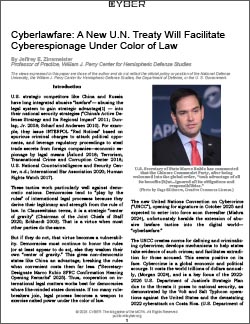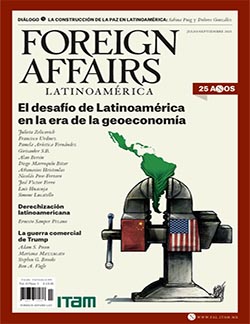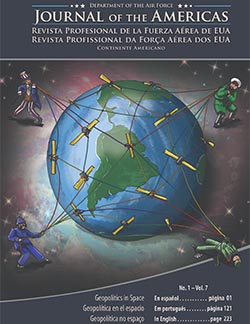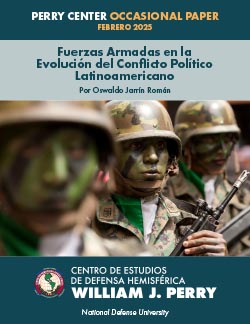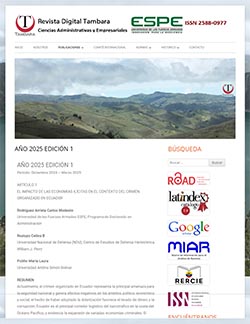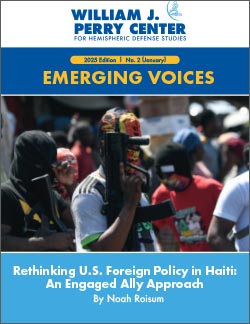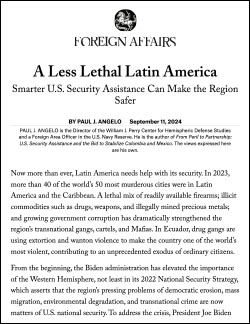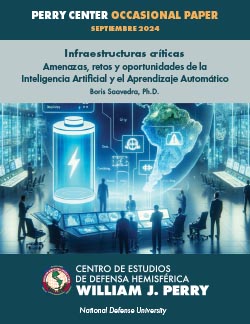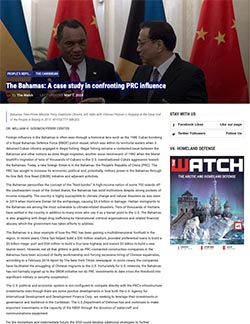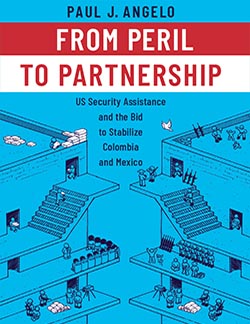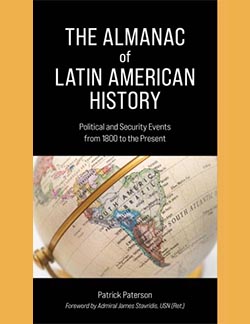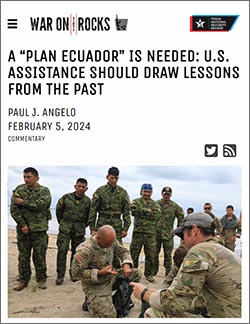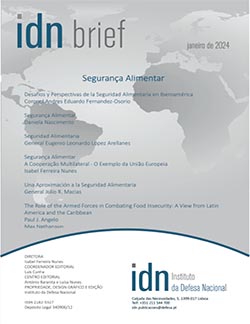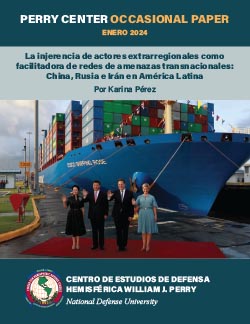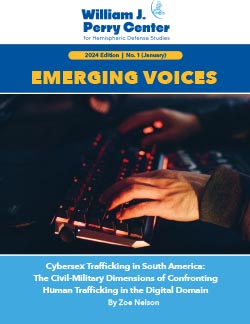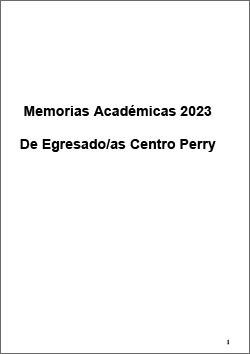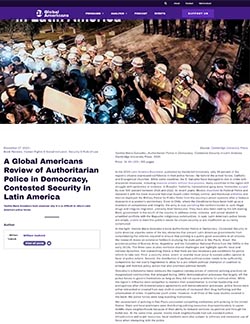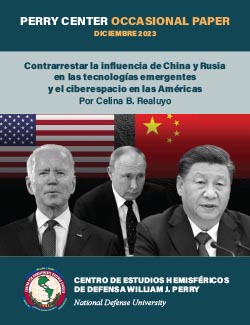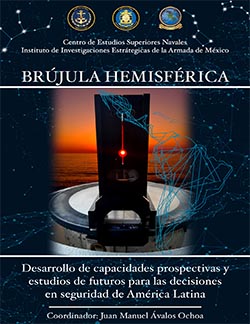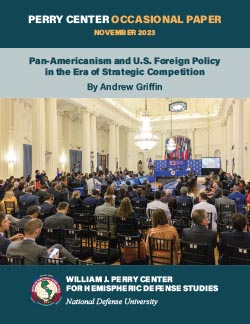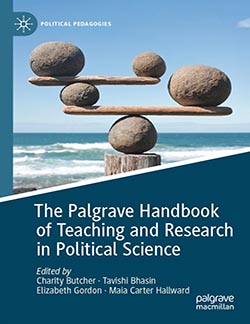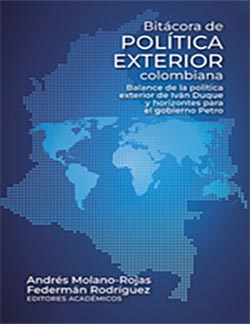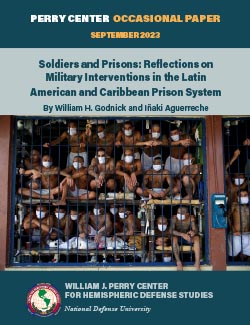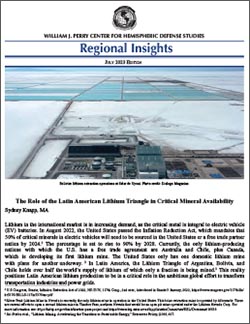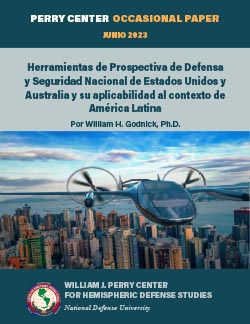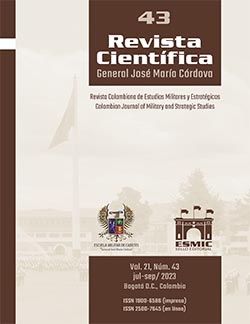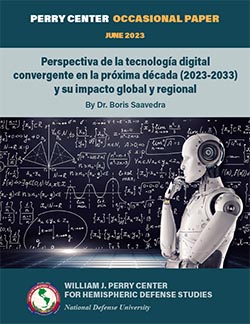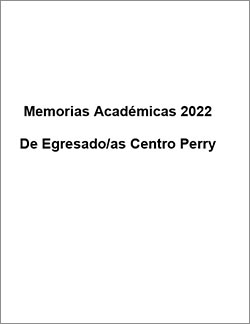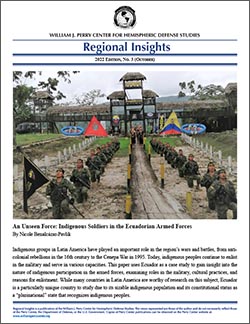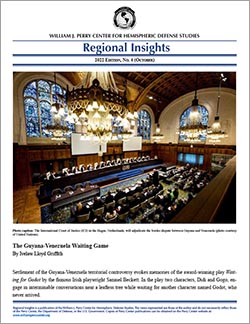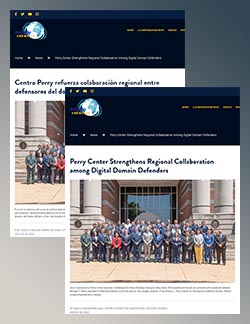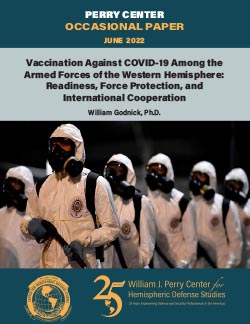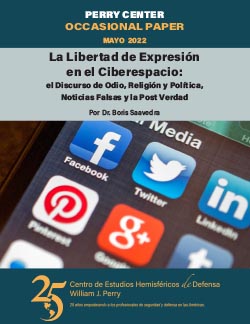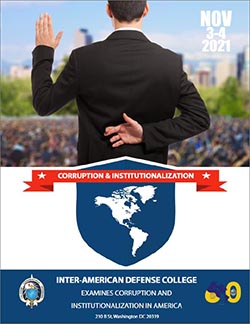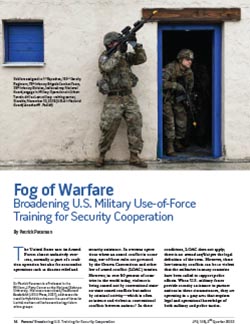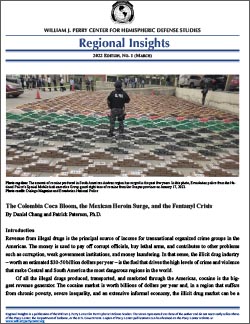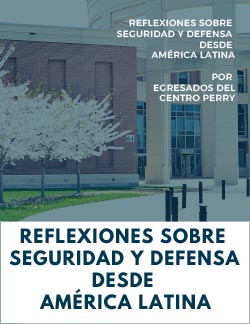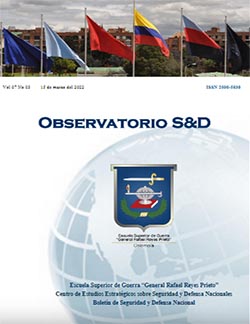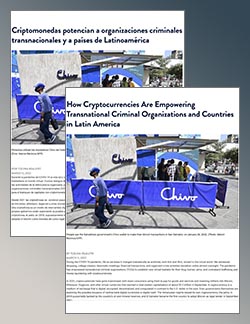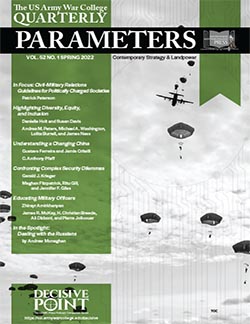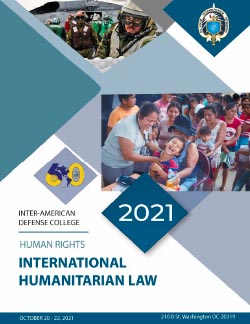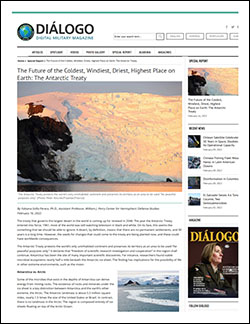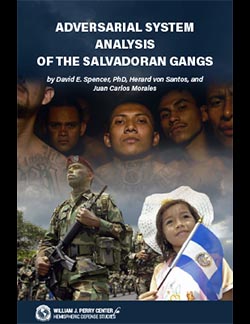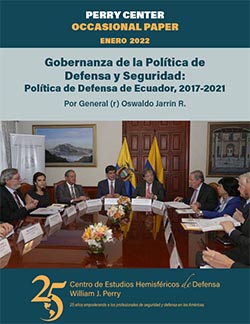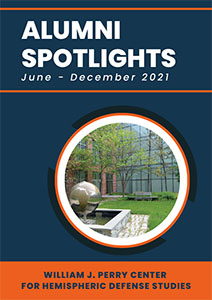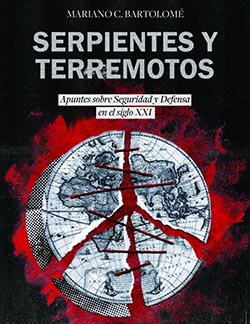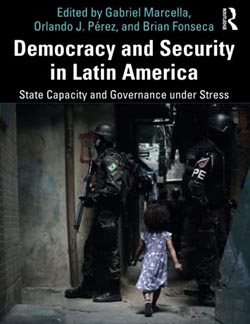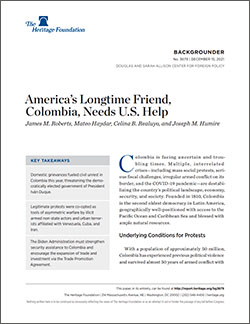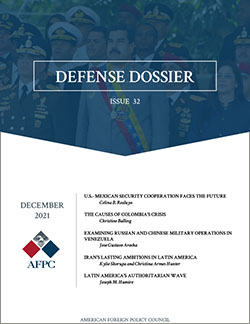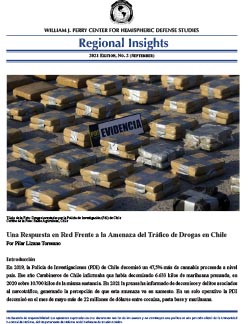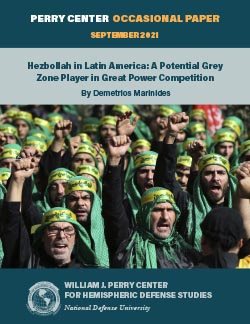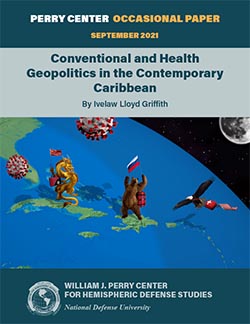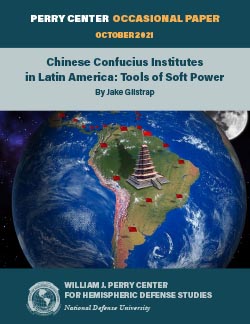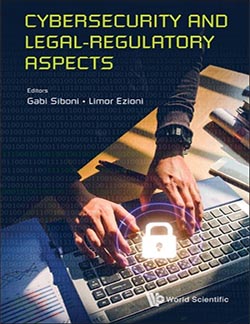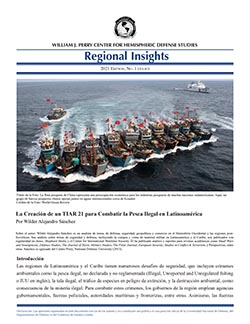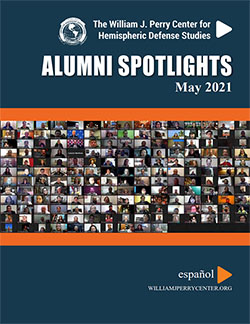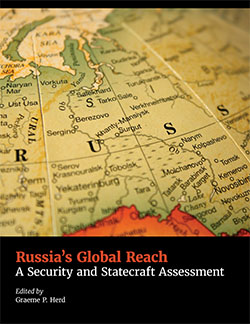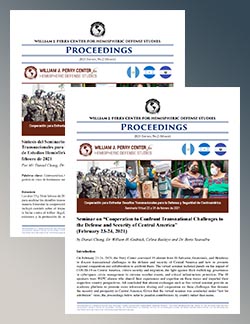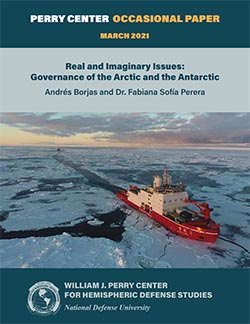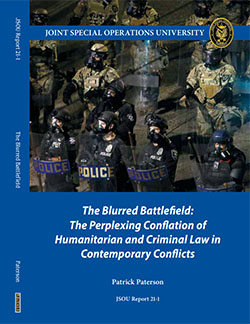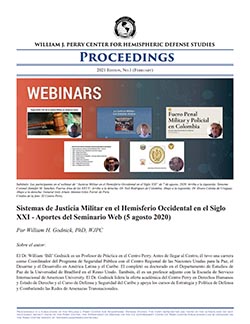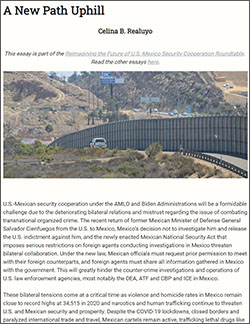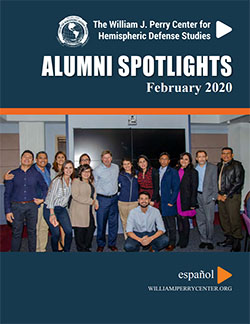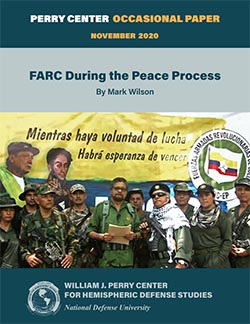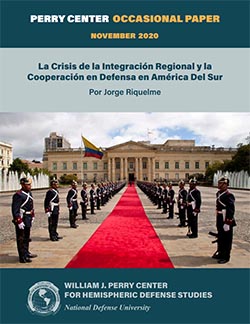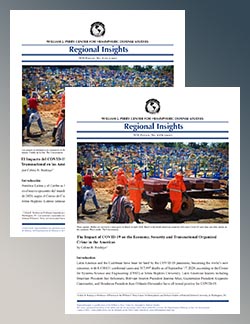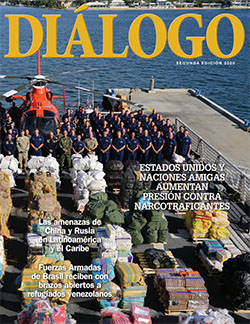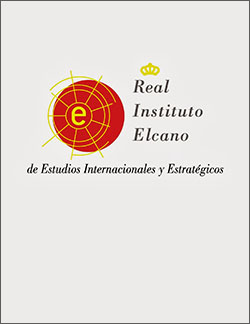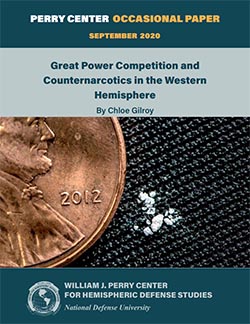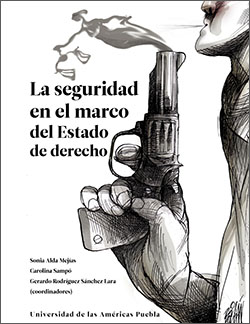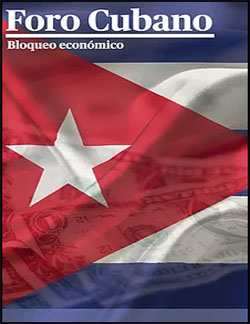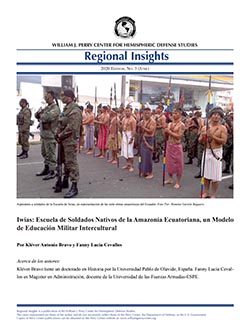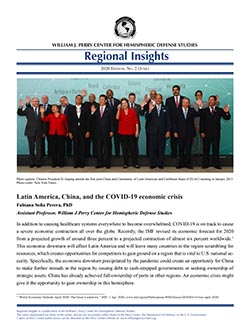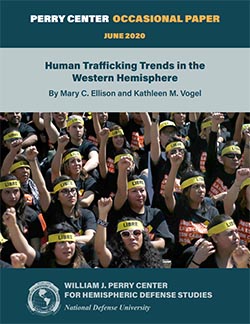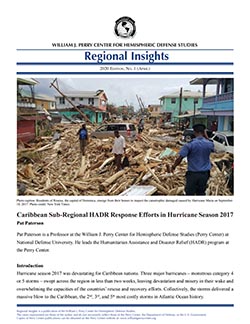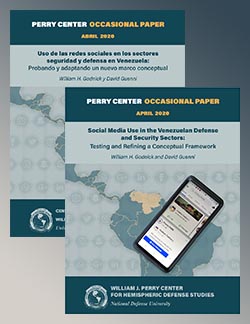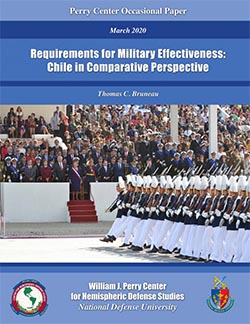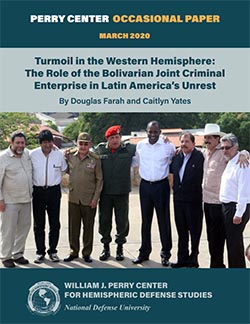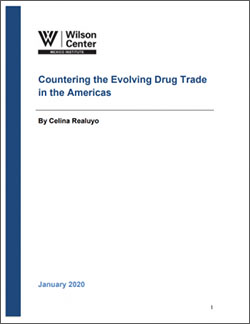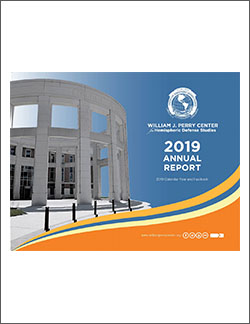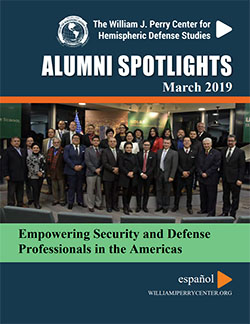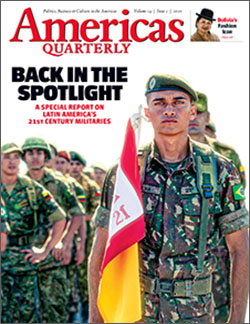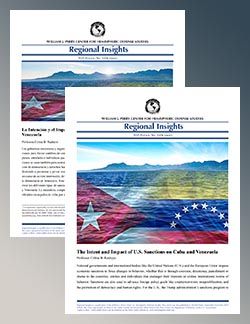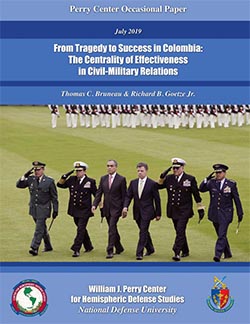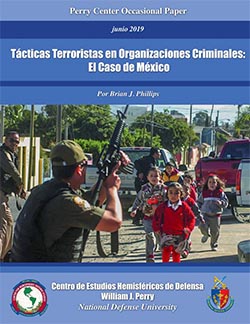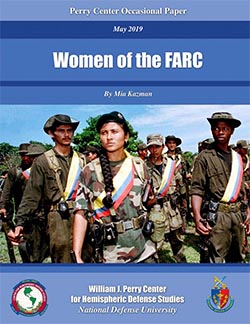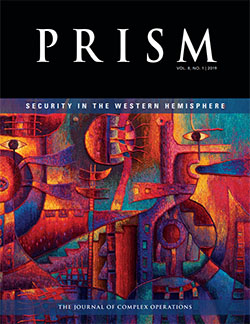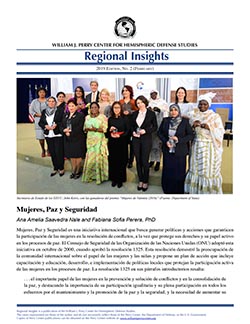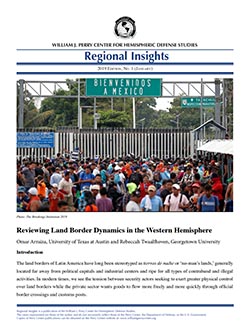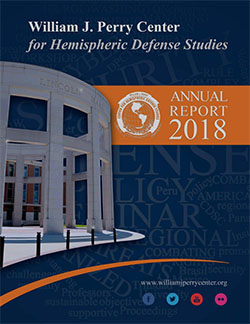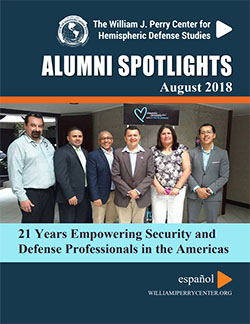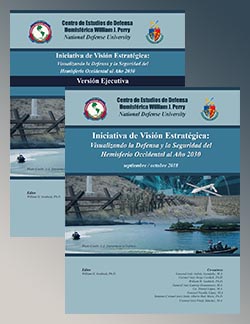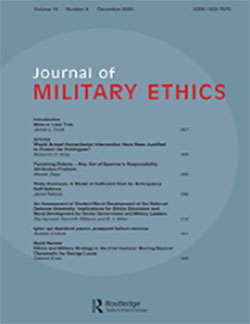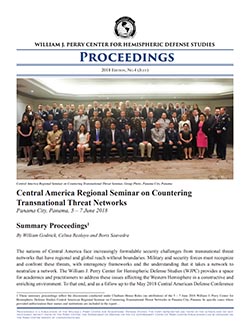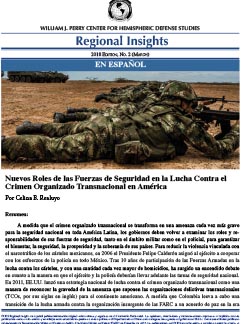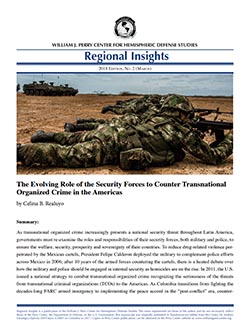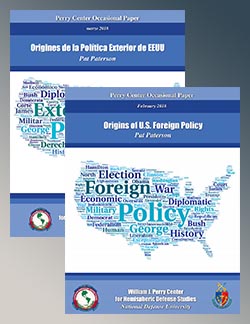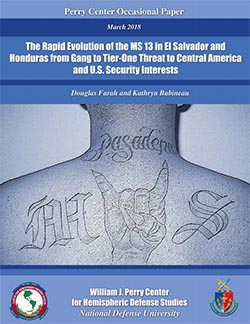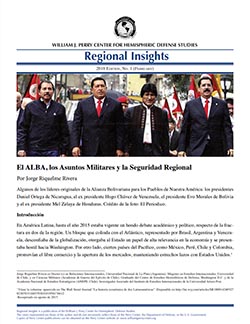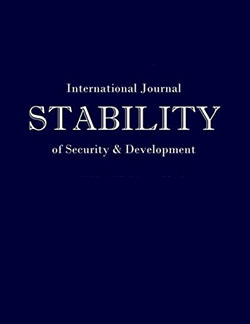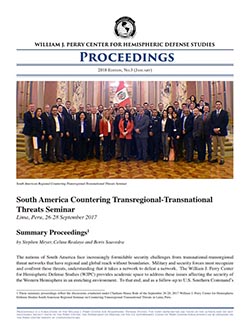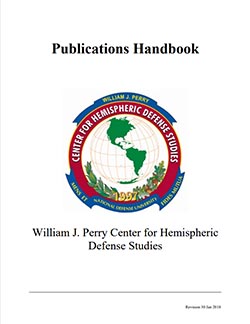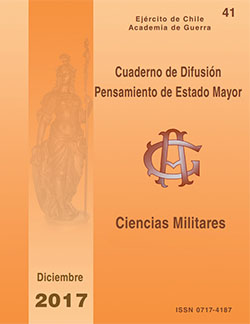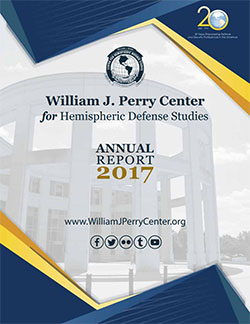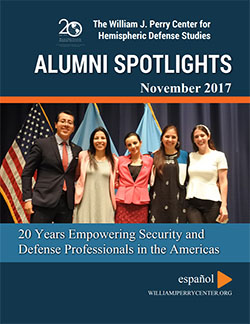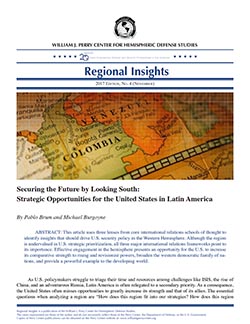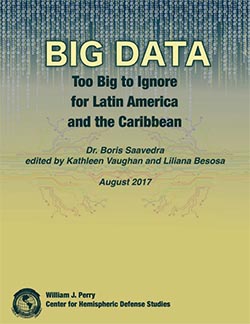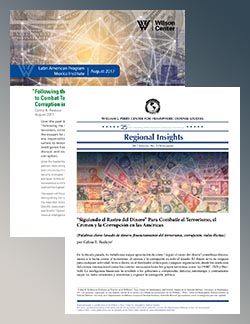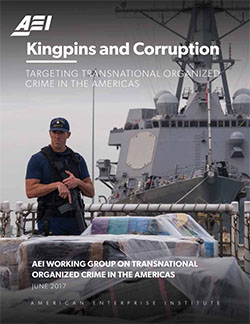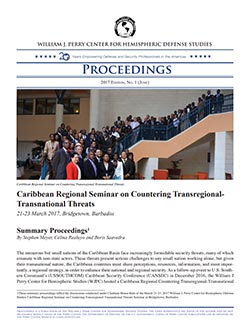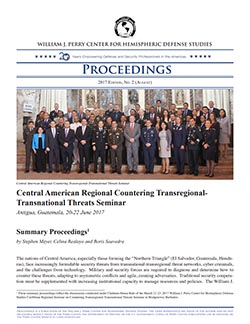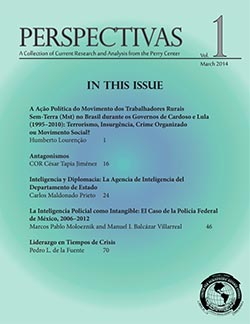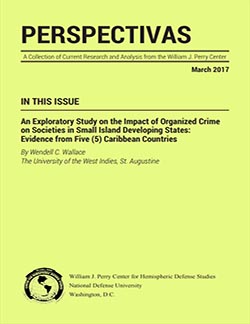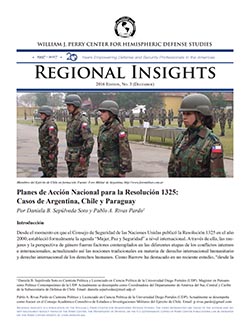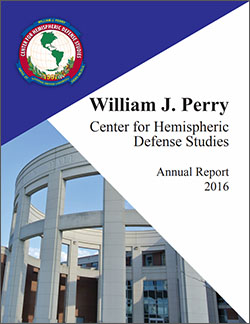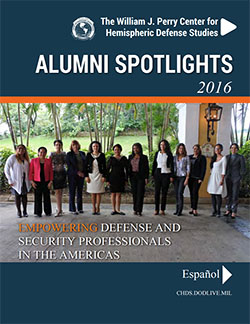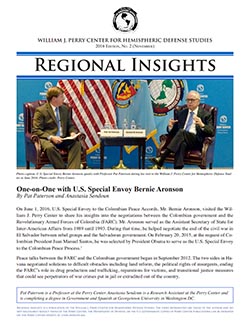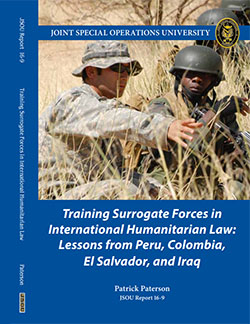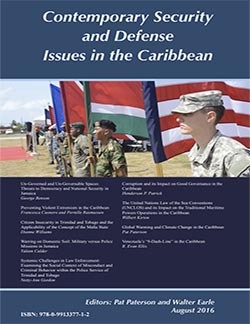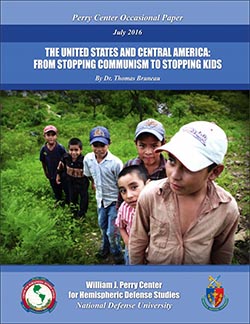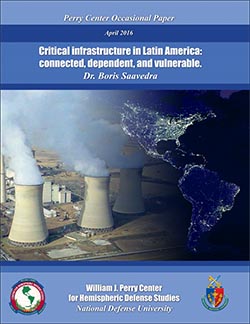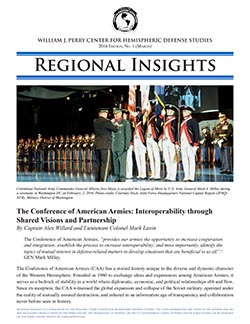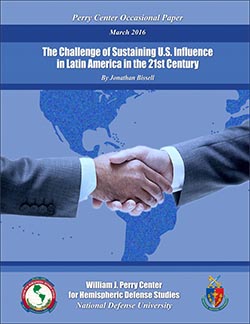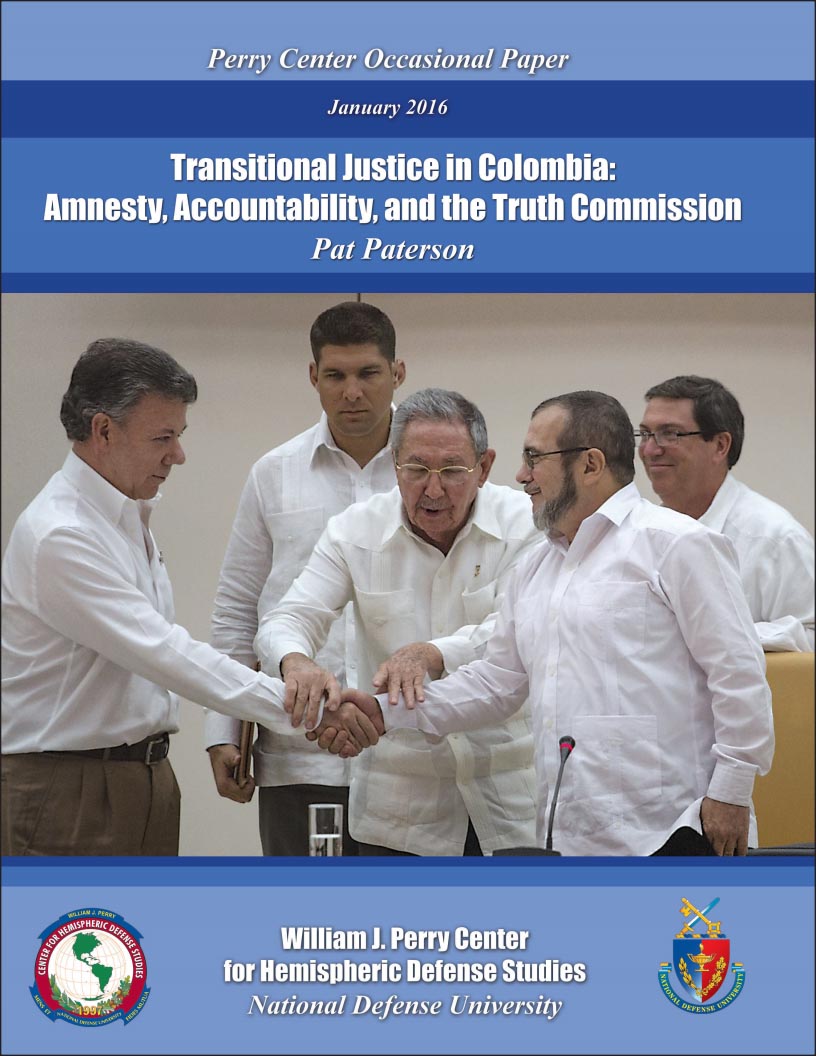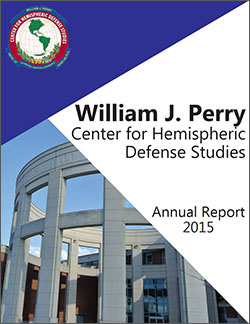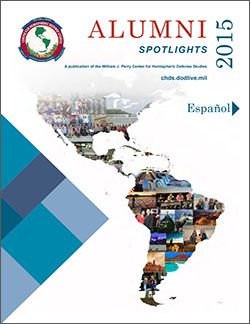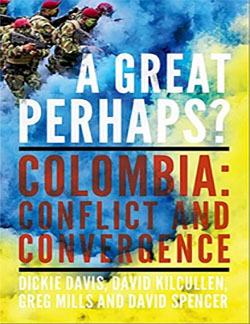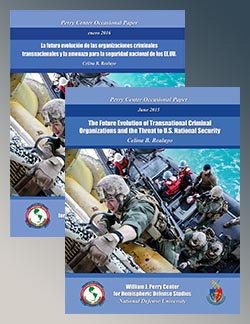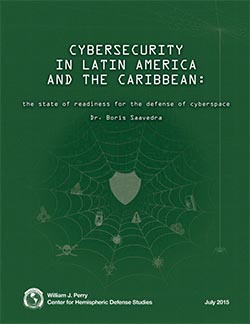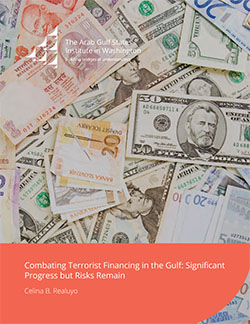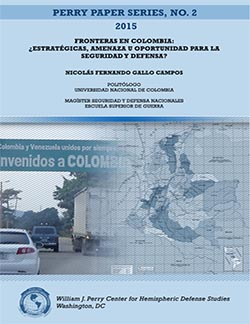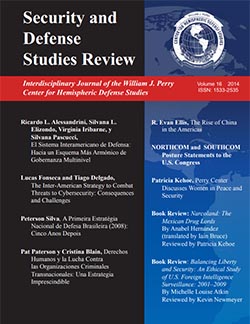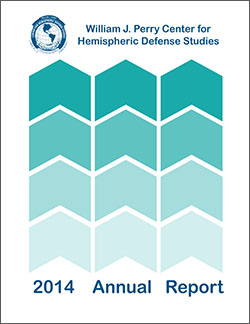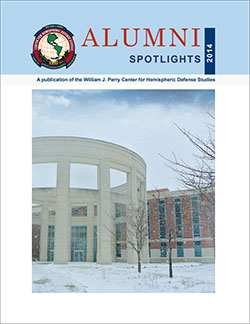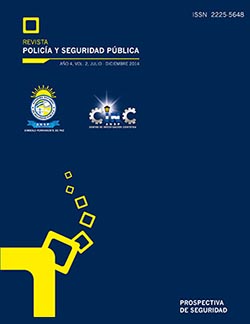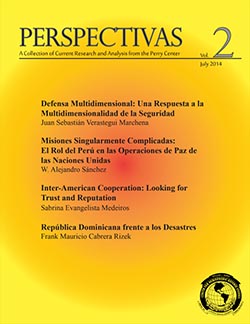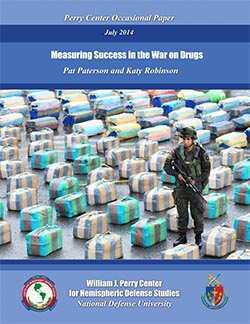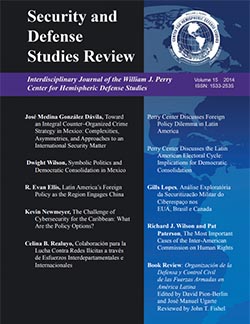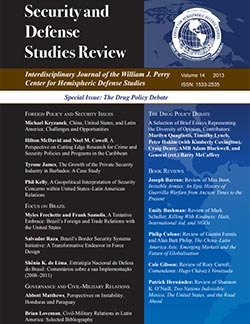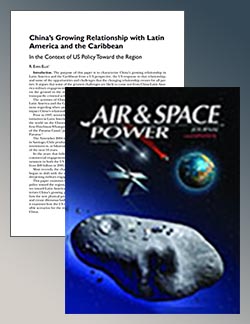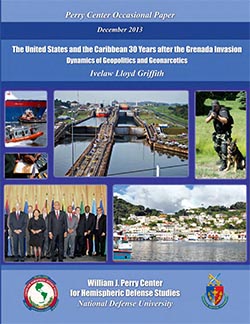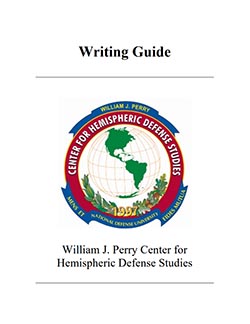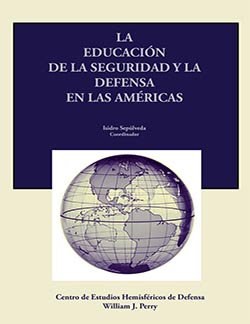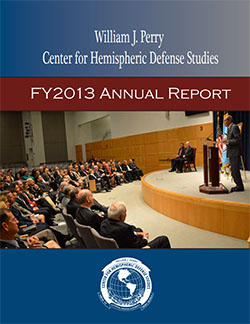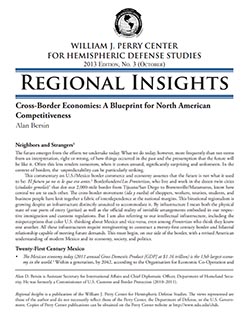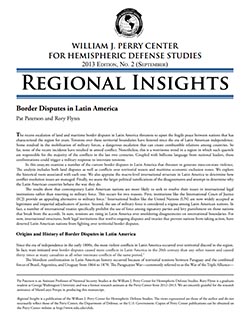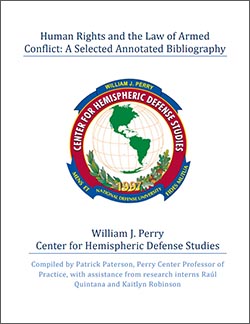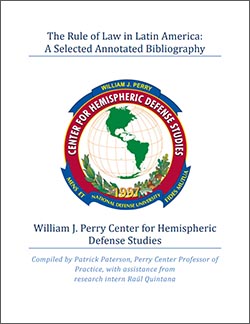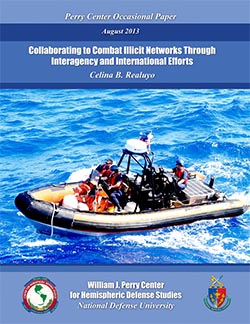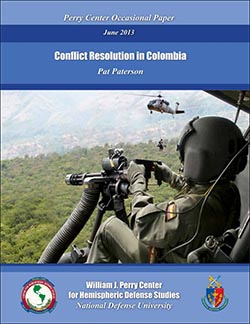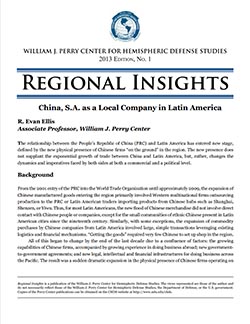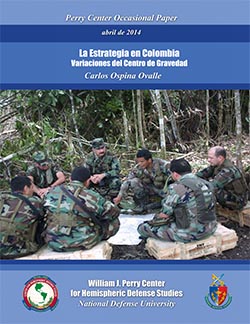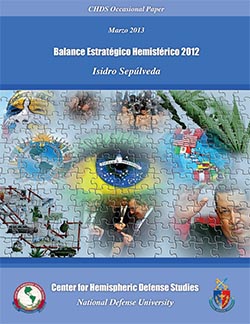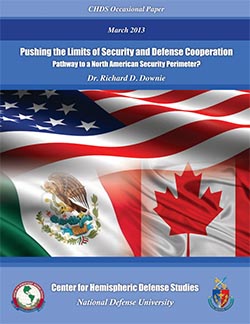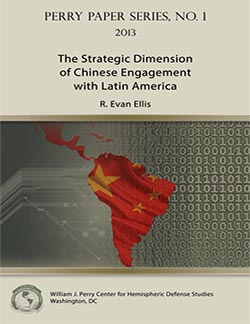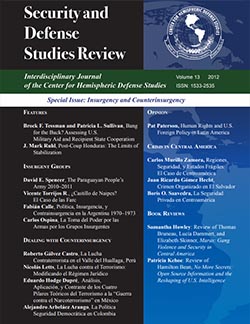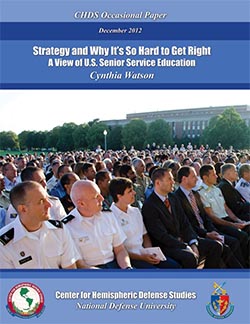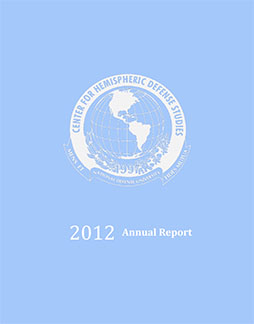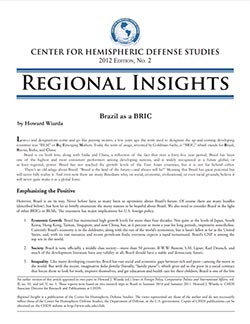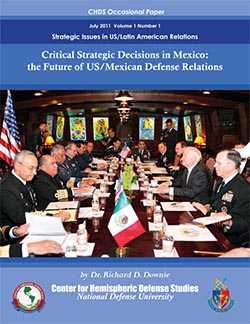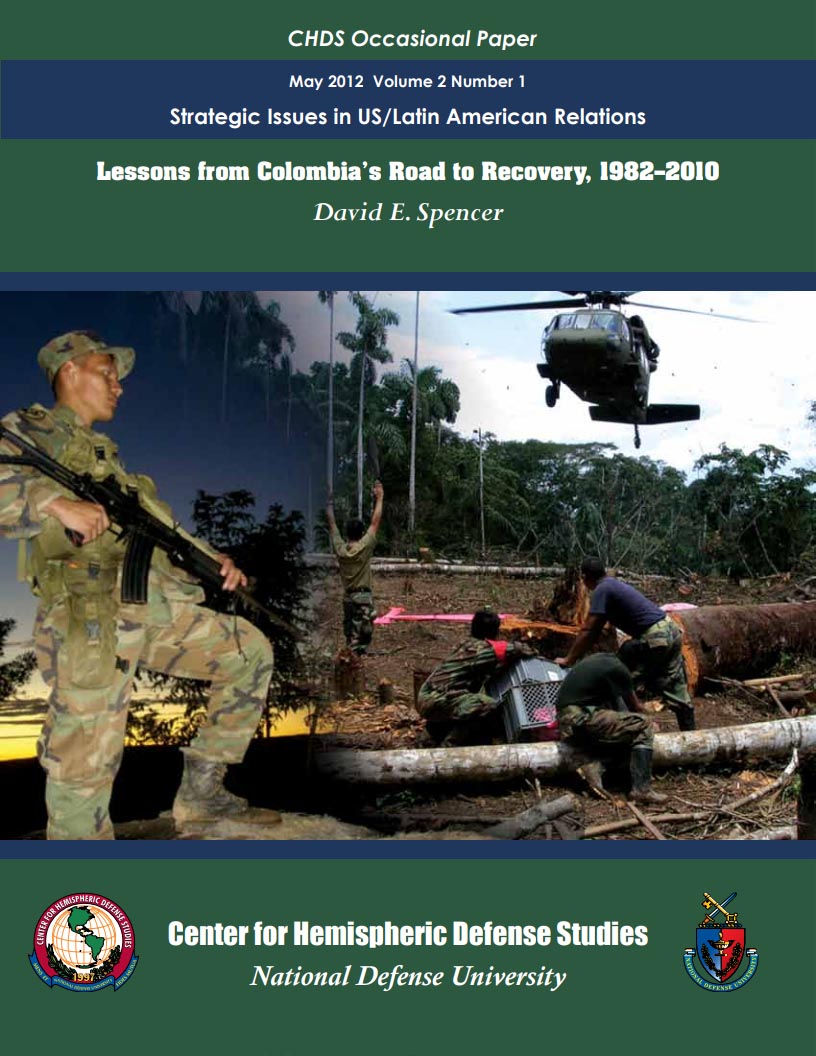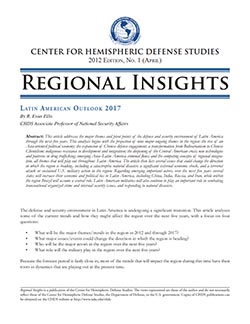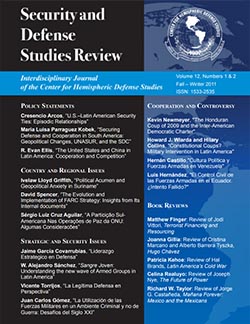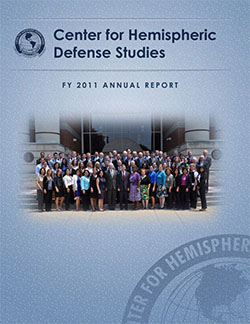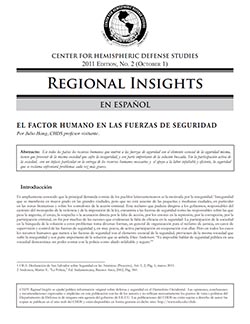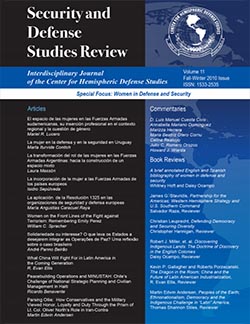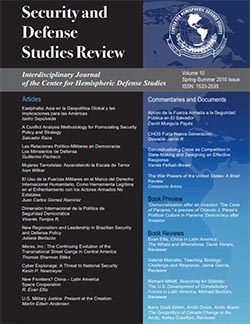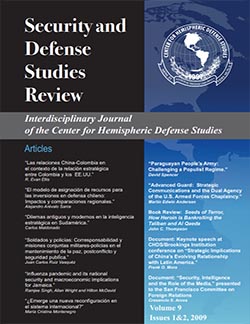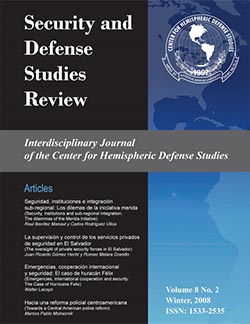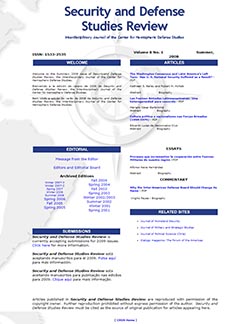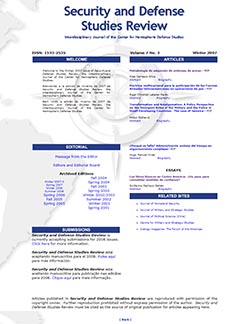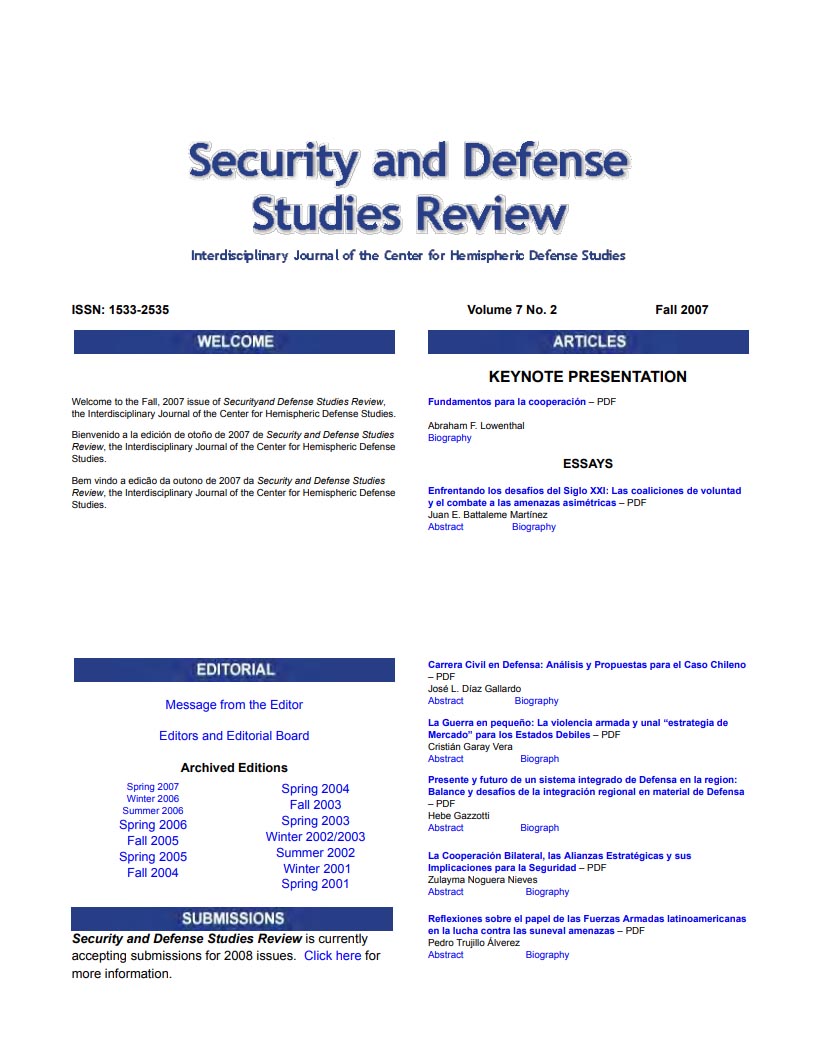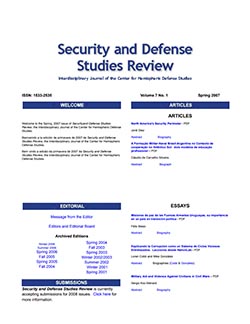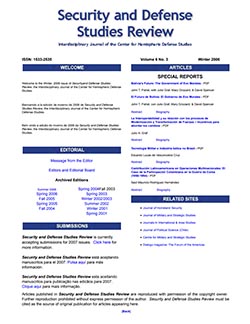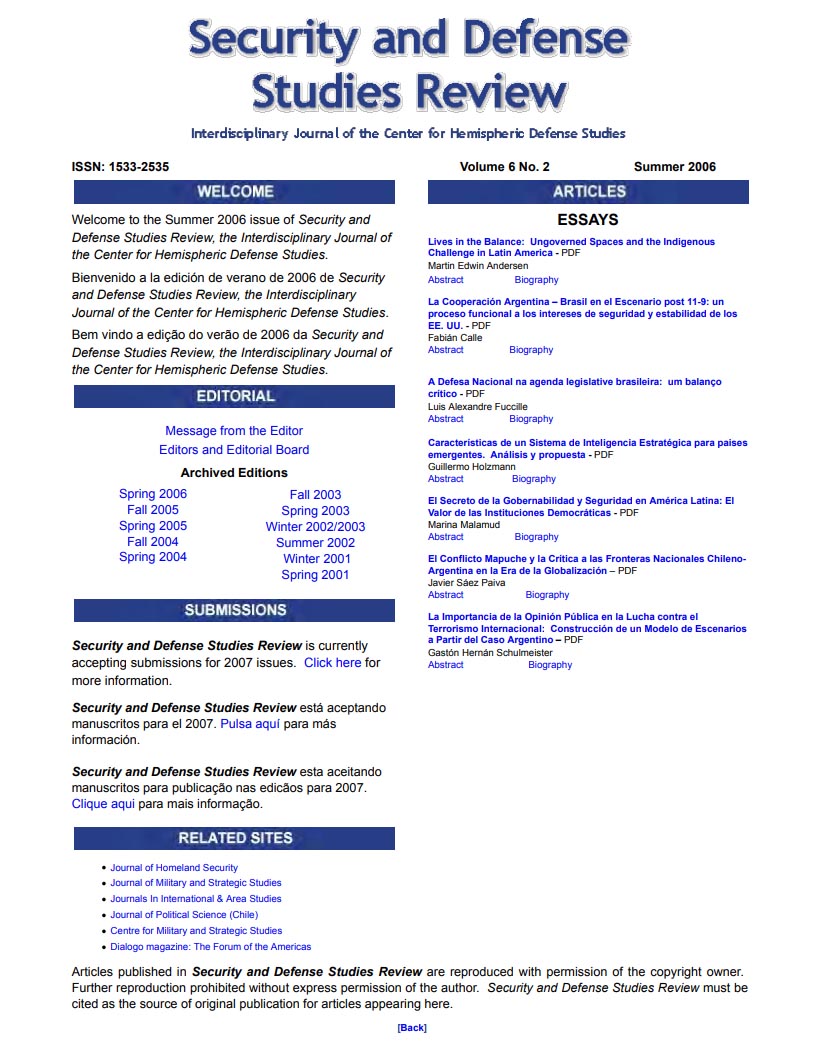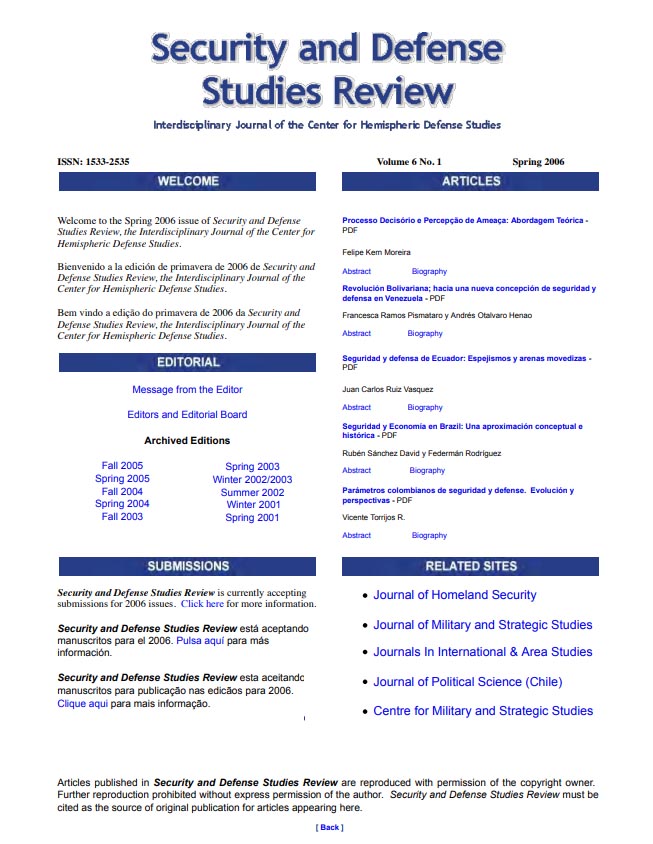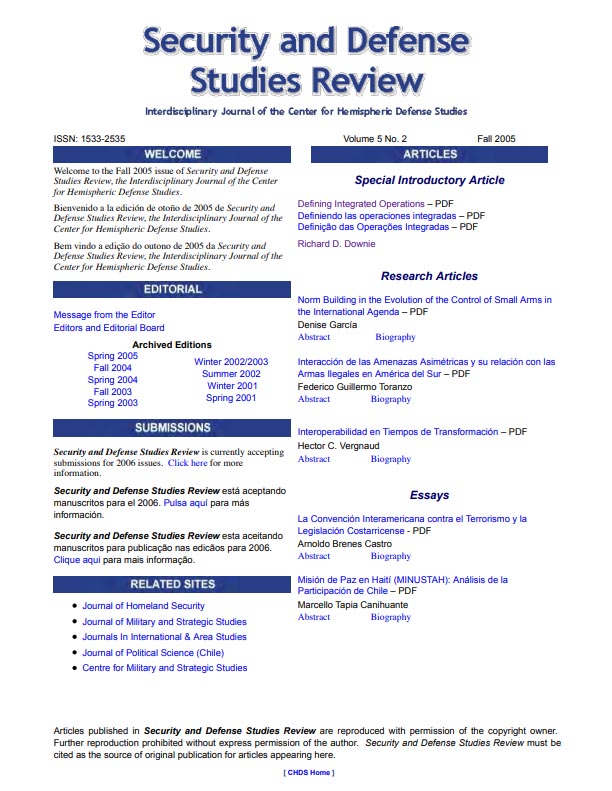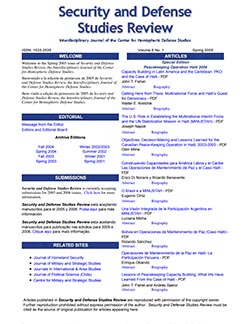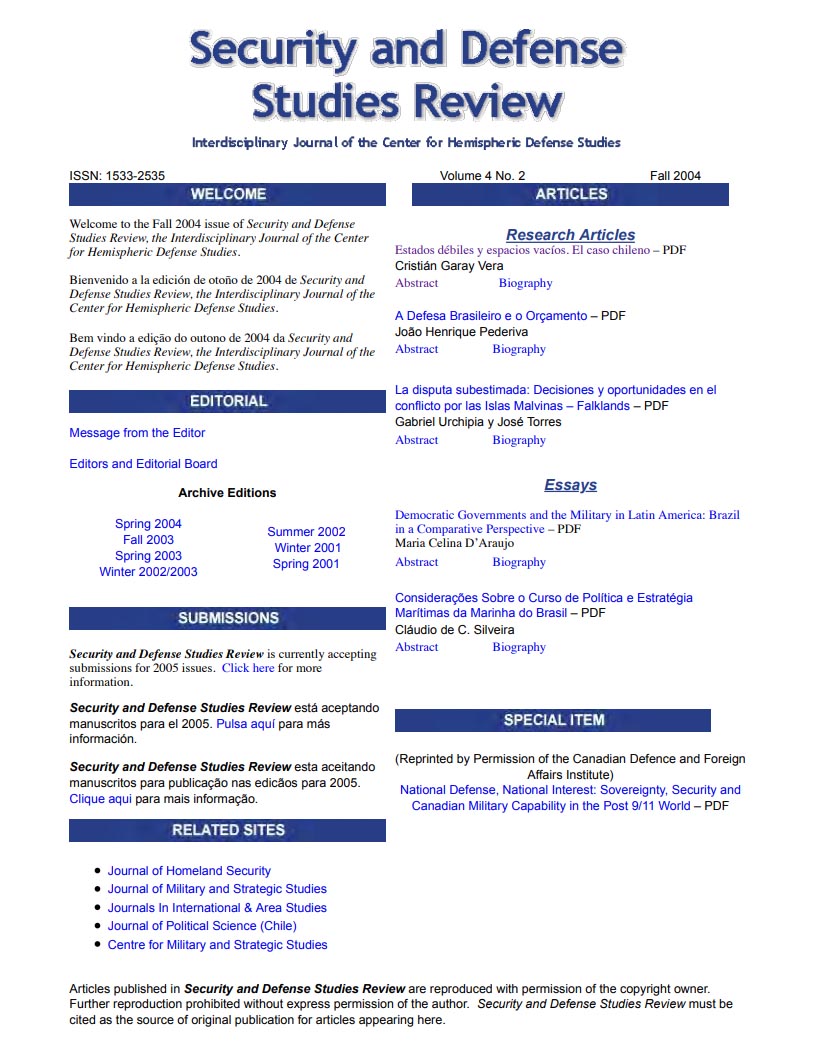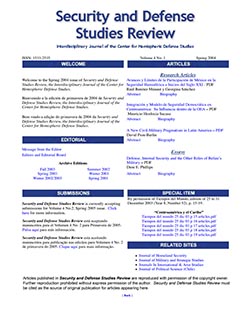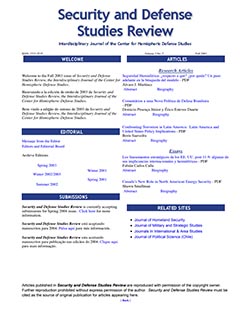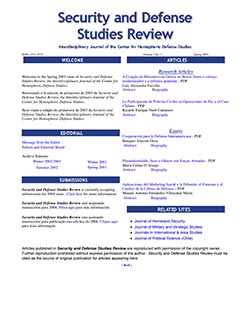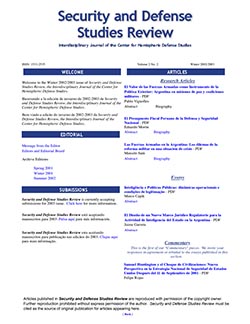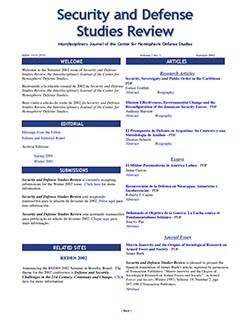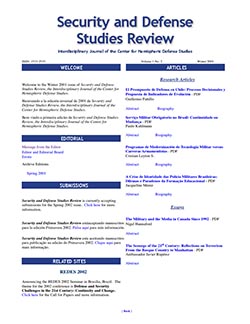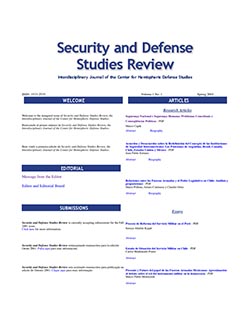| Image | Year | Title | Summary | Categories | Author(s) | Topic(s) | Country/Region | Language(s) | Link | hf:tax:pub_year | hf:doc_categories | hf:doc_author | hf:tax:topic | hf:tax:country_region | hf:tax:language |
|---|---|---|---|---|---|---|---|---|---|---|---|---|---|---|---|
| 2025 | Prospects for Democratic Governance and Prosperity in Haiti | Haiti faces a severe collapse of security, governance, and economic stability as gangs expand territorial control, state institutions weaken, and humanitarian needs escalate. The paper analyzes the limited effectiveness of past international interventions and describes how new UN Security Council Resolutions 2793 and 2794 aim to empower a larger Gang Suppression Force and strengthen sanctions to curb armed groups and illicit financial flows. It details how corruption, money laundering, and diversified criminal financing – combined with an under-resourced police and judiciary – undermine efforts to restore order. The authors argue that only a coordinated, Haitian-led strategy integrating security operations, institutional reform, and international support can create the conditions for long-term democratic governance and prosperity. | Occasional Paper | Boris Saavedra, Celina Realuyo, Luis Bitencourt | Governance | Caribbean, Haiti | English | 2025 | occasional-paper | boris-saavedra celina-realuyo luis-bitencourt | governance | caribbean haiti | english | ||
| 2025 | Cyberlawfare: A New UN Treaty Will Facilitate Cyberespionage Under Color of Law | The new United Nations Convention against Cybercrime, which originated from Chinese and Russian opposition to the rights-based Budapest Convention, risks enabling cyberespionage under the color of law (colloquially, “cyberlawfare”) against the United States and its partners. The UN treaty’s broad scope, as well as its provisions for extraterritorial jurisdiction, excessive reach of international legal cooperation, and secrecy are particularly vulnerable to abuse, paralleling Chinese and Russian misuse of INTERPOL procedures. The United States and its allies should not join the UN treaty, but instead strengthen engagement with the Budapest Convention, as well as train officials to defend against … | External Pubs | Jeffrey Zinsmeister | Crime, Cyber, International Accords/Treaties, International Organizations, Legal Issues | China, Russia | English | 2025 | external-pubs | jeffrey-zinsmeister | crime cyber international-accords-treaties international-organizations legal-issues | china russia | english | ||
| 2025 | Fentanyl: From the Labs to the Streets | This chapter analyzes the problem of illicit fentanyl in Latin America. The first part documents and assesses the evidence on trafficking of illicitly produced and pharmaceutical fentanyl in Latin America in 2023 based on cases reported in the media. The second part maps the different policy responses to the fentanyl phenomenon taken by Latin American governments from both law enforcement and public health perspectives. Only available through the … | External Pubs | Chase Boone, Deborah Gonçalves, William Godnick | Drug Trafficking, Illicit Economies, Organized Crime | Caribbean, Central America, Latin America, South America | English | 2025 | external-pubs | chase-boone deborah-goncalves william-godnick | drug-trafficking illicit-economies organized-crime | caribbean central-america latin-america south-america | english | ||
| 2025 | Has the new nuclear revolution arrived in Latin America? | The energy sector has reevaluated the opportunities offered by nuclear energy, and although its use in Latin America has historically been limited, recent technological innovations promise to make this energy source more accessible to developing countries. With around 5% of the world’s uranium resources and cheap labor, the region is becoming attractive to the nuclear sector. This raises questions about how the new nuclear revolution may affect Latin America, what opportunities and challenges it presents, and what its greatest risks are. Only available through the … | External Pubs | Arturo Sotomayor | Energy, Governance, Natural Resources, Technology | Argentina, Brazil, Colombia, Guyana, Mexico, Paraguay, Peru | Spanish | 2025 | external-pubs | arturo-sotomayor | energy governance natural-resources technology | argentina brazil colombia guyana mexico paraguay peru | spanish | ||
| 2025 | Multinational Joint Capabilities in the Americas: How the US Marine Corps Force Design 2030 Can Pave the Way for Collective Defense | The article explores the US Marine Corps’ (USMC) Force Design 2030 and its potential to enhance multinational joint defense capabilities in the Americas. It argues that traditional military strategies are inadequate for modern security challenges, such as transnational crime and irregular warfare. By promoting interoperability, standardized training, and shared platforms, the USMC seeks to strengthen collective defense across the region. The article highlights the growing importance of naval and maritime forces, examines geopolitical threats, and suggests that Latin American nations can benefit from adopting elements of the Force Design 2030 to enhance security and stability. | External Pubs | Manuel Carranza, Robert Burrell, William Godnick | Alliances, Armed Forces, Reforms/Modernization, Security | Latin America, United States | English | 2025 | external-pubs | manuel-carranza robert-burrell william-godnick | alliances armed-forces reforms-modernization security | latin-america united-states | english | ||
| 2025 | Armed Forces in the Evolution of the Latin American Political Conflict | Ecuador is in the midst of an intense security crisis, one that pits the government and its security forces against well-armed violent gangs. Former Ecuadorian Minister of Defense General Raul Jarrin examines the situation through an operational lens as well as the geopolitical scholarship on democracy, the role of the state, and the rule of law. | Occasional Paper | Oswaldo Jarrín Román | Armed Forces, Gangs, Military, Security | Ecuador, Latin America | Spanish | 2025 | occasional-paper | oswaldo-jarrin-roman | armed-forces gangs military security | ecuador latin-america | spanish | ||
| 2025 | The Impact of Illicit Economies in the Context of Organized Crime in Ecuador | This article examines organized crime in Ecuador as the main threat to national security that generates negative effects in the political, economic and social spheres. Ecuador is the main logistic corridor of drug trafficking in the Pacific Ocean coast and has witnessed the expansion of several criminal economies. The dollarized economy favors money laundering and corruption. The increase in illicit economies has expanded the power of criminal organizations, exacerbating violence and insecurity, making it essential to implement strict regulatory measures and foster interagency and international cooperation to successfully combat organized crime in Ecuador. | External Pubs | Carlos Rodríguez Arrieta, Celina Realuyo, María Laura Patiño | Illicit Economies, International Cooperation, Organized Crime | Albania, Colombia, Ecuador, Latin America, Venezuela | Spanish | 2025 | external-pubs | carlos-rodriguez-arrieta celina-realuyo maria-laura-patino | illicit-economies international-cooperation organized-crime | albania colombia ecuador latin-america venezuela | spanish | ||
| 2025 | Rethinking US Foreign Policy in Haiti: An Engaged Ally Approach | Haiti is in a state of chaos. It is ravaged and controlled by vicious gangs caught in a turf war, that terrorize, abuse, and murder at whim. Ultimately, Haiti, on the brink of state failure, will not recover until its internal security crisis and lack of good, legitimate governance are remediated. The United States should pursue a multifaceted “engaged ally” approach to address the underlying security and socio-economic issues to lead to long-term, positive change in Haiti. This approach acknowledges the unique capacity of the United States and its allies to bring about change in Haiti while still prioritizing a Haitian-led solution. | Emerging Voices | Noah Roisum | Peacekeeping Operations, United Nations | Caribbean, Haiti, Kenya, Latin America, United States | English | 2025 | emerging-voices | noah-roisum | peacekeeping-operations united-nations | caribbean haiti kenya latin-america united-states | english | ||
| 2024 | Combating Organized Crime and Insecurity in Ecuador: The Role of Armed Forces | … | Video – Webinar | Juan Carlos Gómez Ramírez, Miguel Andrade-Vásquez, William Godnick | Ecuador, Latin America, South America | English | 2024 | video-webinar | juan-carlos-gomez-ramirez miguel-andrade-vasquez william-godnick | ecuador latin-america south-america | english | ||||
| 2024 | Combating Organized Crime and Insecurity in Ecuador: The Role of Armed Forces | … | Video – Webinar | Juan Carlos Gómez Ramírez, Miguel Andrade-Vásquez, William Godnick | Ecuador, Latin America, South America | Spanish | 2024 | video-webinar | juan-carlos-gomez-ramirez miguel-andrade-vasquez william-godnick | ecuador latin-america south-america | spanish | ||||
| 2024 | Rebuilding Haiti: Pathways Out of Crisis | Rebuilding Haiti: Pathways Out of Crisis: This webinar explores Haiti’s complex challenges and potential solutions for the nation’s recovery. Expert panelists examine the root causes of Haiti’s ongoing crisis, including political instability, economic struggles, and security concerns. Discussion topics include the impact of gang violence, the collapse of democratic institutions, and the humanitarian crisis that has left millions food insecure. Panelists share perspectives about international efforts to support Haiti, the role of the Haitian diaspora, and approaches to rebuilding the country’s infrastructure and economy. The panel features Dr. Arturo Sotomayor, Professor, William J. Perry Center for Hemispheric Defense Studies; Dr. John Manza, Executive Director, Haiti Interagency Working Group; Websder Corneille, Haitian Linguist/Adjunct Lecturer, CLACS-Indiana University Bloomington; and Johanna Leblanc, J.D., LL.M., Partner of the Adomi Group/Adjunct Professor at Howard University. | Video – Webinar | Arturo Sotomayor, Johanna Leblanc, John Manza, Websder Corneille | Gangs, Governance, Humanitarian Aid, Violence | Caribbean, Haiti, Latin America, United States | English | 2024 | video-webinar | arturo-sotomayor johanna-leblanc john-manza websder-corneille | gangs governance humanitarian-aid violence | caribbean haiti latin-america united-states | english | ||
| 2024 | Rebuilding Haiti: Pathways Out of Crisis | Rebuilding Haiti: Pathways Out of Crisis: This webinar explores Haiti’s complex challenges and potential solutions for the nation’s recovery. Expert panelists examine the root causes of Haiti’s ongoing crisis, including political instability, economic struggles, and security concerns. Discussion topics include the impact of gang violence, the collapse of democratic institutions, and the humanitarian crisis that has left millions food insecure. Panelists share perspectives about international efforts to support Haiti, the role of the Haitian diaspora, and approaches to rebuilding the country’s infrastructure and economy. The panel features Dr. Arturo Sotomayor, Professor, William J. Perry Center for Hemispheric Defense Studies; Dr. John Manza, Executive Director, Haiti Interagency Working Group; Websder Corneille, Haitian Linguist/Adjunct Lecturer, CLACS-Indiana University Bloomington; and Johanna Leblanc, J.D., LL.M., Partner of the Adomi Group/Adjunct Professor at Howard University. | Video – Webinar | Arturo Sotomayor, Johanna Leblanc, John Manza, Websder Corneille | Gangs, Governance, Humanitarian Aid, Violence | Caribbean, Haiti, Latin America, United States | Spanish | 2024 | video-webinar | arturo-sotomayor johanna-leblanc john-manza websder-corneille | gangs governance humanitarian-aid violence | caribbean haiti latin-america united-states | spanish | ||
| 2024 | A Less Lethal Latin America: Smarter US Security Assistance Can Make the Region Safer | Now more than ever, Latin America needs help with its security. In 2023, more than 40 of the world’s 50 most murderous cities were in Latin America and the Caribbean. Washington should again embrace the worldview that it can best protect its own security by helping democratic neighbors advance theirs. It can do so by drawing on the lessons of decades of U.S. security policy in the Americas but also by determining how those policies can be revised and improved. This article for Foreign Affairs explores the recent history of U.S. security assistance in Latin America and the Caribbean, highlighting the successes and failures in places such as El Salvador, Colombia, and Mexico. The article then addresses why such U.S. assistance continues to underdeliver, noting that the success of security assistance depends on leaders and organizations that the United States can sometimes influence but rarely control. Likewise, although the governments and security agencies on the receiving end provide convenient scapegoats when U.S. security assistance fails, Washington’s own bureaucracy shares the blame. To this end, the article concludes that Washington must remove its own bureaucratic barriers to strengthening security ties. Minimizing delivery timelines, committing to multiyear investments, and synchronizing priorities across U.S. government agencies would enhance the United States’ credibility as a reliable partner. The long history of U.S. security ties in the region provides a strong foundation for regional enthusiasm for U.S. initiatives. But whether such valuable programs can truly achieve results will depend on whether Washington can learn from past mistakes and overcome the bureaucratic and political limitations that have previously held it back. | External Pubs | Paul Angelo | Corruption, Drug Trafficking, Gangs, Security Cooperation | Caribbean, Latin America | English | 2024 | external-pubs | paul-angelo | corruption drug-trafficking gangs security-cooperation | caribbean latin-america | english | ||
| 2024 | Critical Infrastructures: Threats, Challenges and Opportunities of Artificial Intelligence and Machine Learning | This article examines the threats and challenges of cybersecurity in Latin America and the Caribbean to include the protection of critical infrastructure in cyberspace and the implications for daily human interaction and survival. The article objective is to analyze politically and strategically critical infrastructures in Latin America and the Caribbean in light of generative AI, Meta Data Analytics and machine learning (ML). The report provides an analysis at a political and strategic level of the current technological environment characterized by the aforementioned accelerated exponential and convergent processes which have generated disruptive innovations. All this set of facts impacts humanity in general and critical infrastructures, a fundamental factor for life on the planet. | Occasional Paper | Boris Saavedra | Critical Infrastructure, Cyber, Technology | Latin America | Spanish | 2024 | occasional-paper | boris-saavedra | critical-infrastructure cyber technology | latin-america | spanish | ||
| 2024 | The Bahamas: A Case Study in Confronting PRC Influence | In this article for US Northern Command’s magazine, The Watch, Dr. William Godnick describes the contours and challenges faced at the United States’ “third border” in the Caribbean, specifically the multi-island state of the Bahamas. Dr. Godnick outlines the long-standing bilateral relationship between the United States and the Bahamas and how increased Chinese investment presents a new set of challenges for the relationship. He calls for re-thinking how security cooperation relationships should be forged with high, middle-income countries to avoid security gaps in our shared neighborhood. | External Pubs | William Godnick | Migration, Strategic Competition, Transnational Organized Crime, Transnational Threats | Bahamas, Caribbean, Cuba, Haiti, United States | English | 2024 | external-pubs | william-godnick | migration strategic-competition transnational-organized-crime transnational-threats | bahamas caribbean cuba haiti united-states | english | ||
| 2024 | Interview with COL (ret.) John “Jay” Cope about the Perry Center’s History | Dialogues with the Perry Center, Season 2, Episode 3: In this episode, hosted by Perry Center Professor Luis Bitencourt, we celebrate the Center’s 27th anniversary. Dr. Bitencourt welcomes US Army (ret.) Colonel and founding director John “Jay” Cope to discuss the inception and development of the Center for Hemispheric Defense Studies, later renamed the William J. Perry Center for Hemispheric Defense Studies. This special English-language episode includes Spanish subtitles. | Video – Perry Dialogues | Luis Bitencourt | Education/Training, History, International Relations, Multidimensional Security | Western Hem. | English | 2024 | video-perry-dialogues | luis-bitencourt | education-training history international-relations multidimensional-security | western-hemisphere | english | ||
| 2024 | From Peril to Partnership: US Security Assistance and the Bid to Stabilize Colombia and Mexico | Plan Colombia and the Mérida Initiative are the two most significant US security assistance efforts in Latin America in the twenty-first century. At a time when US objectives in the Middle East and Central Asia were flagging, Colombia was a rare US foreign policy victory—a showcase for stabilization and security sector reform. Conversely, Mexico struggled to turn the tide on the country’s scourge of crime and violence, even with an influx of resources aimed at professionalizing the country’s security, defense, and judicial institutions. As Washington reconsiders its approach to stabilizing crisis countries after a challenging withdrawal from Afghanistan, From Peril to Partnership’s comparative analysis of Colombia and Mexico offers lessons for scholars and policymakers alike, providing insights into the efficacy of US security assistance and the necessary conditions and stakeholders in partner nations that facilitate success. Crucially, private sector support, interparty consensus on security policies, and the centralization of the security bureaucracy underpinned Colombia’s success. The absence of these features in Mexico contributed to the country’s descent into chaos, culminating in the country’s highest-ever homicide rate by the end of the 2010s. Drawing on extensive fieldwork, From Peril to Partnership evaluates to what extent security assistance programs helped improve the operational effectiveness and democratic accountability of Washington’s partners—Colombian and Mexican security forces. It answers why Plan Colombia achieved its objectives and why the Mérida Initiative underdelivered in Mexico. Most importantly, it goes beyond drug war theatrics and the “one-size-fits-all” approach to US-led stabilization—at once, restoring agency to institutions on the receiving end of US security assistance and helping chart a course toward more nuanced and effective US policy. Angelo, Paul. From Peril to Partnership: US Security Assistance and the Bid to Stabilize Colombia and Mexico. Oxford: Oxford University Press, 2024. Only available commercially | External Pubs | Paul Angelo | Democracy, Governance, Security Cooperation | Colombia, Mexico, United States | English | 2024 | external-pubs | paul-angelo | democracy governance security-cooperation | colombia mexico united-states | english | ||
| 2024 | The Almanac of Latin American History – Political and Security Events from 1800 to the Present | Dr. Patrick Paterson, Associate Dean for Research and Publications at the WJPC, has published a fascinating almanac that compiles the most historically significant events in Latin America and the Caribbean from 1800-2020, containing vignettes of more than 700 events organized per month and specific calendar day. It focuses on major political and security incidents starting from the period of independence—including armed conflicts, famous battles, births and deaths of important figures, military coups, significant presidential elections, and independence dates. Also included are detailed appendices addressing important economic, political, and social conditions, as well as an index with over 2,000 keywords. Paterson, Patrick. The Almanac of Latin American History, Political and Security Events from 1800 to the Present, Rowman & Littlefield, 2024. Only available commercially | External Pubs | Patrick Paterson | Democracy, Geopolitics, History, International Accords/Treaties, Politics, Security | Central America, Latin America, North America, South America, Western Hem. | English | 2024 | external-pubs | patrick-paterson | democracy geopolitics history international-accords-treaties politics security | central-america latin-america north-america south-america western-hemisphere | english | ||
| 2024 | A “Plan Ecuador” Is Needed: US Assistance Should Draw Lessons from the Past | Latin America and the Caribbean are home to just 9 percent of the global population but account for a third of the world’s homicides. A lethal mix of drugs, readily available firearms, and unemployed youth is fueling a wave of violence that has taken on epidemic proportions. Ecuador is now ground zero for the region’s gang brutality. Whether Quito succeeds in containing the violence will depend as much on how it manages corruption and political instability as it does on the brute force called upon to suppress organized crime. The region’s downward spiral need not be a chronicle of a death foretold. In Ecuador, newfound national resolve and emerging offers of international cooperation can be an effective antidote to expanding gang violence. Indeed, the success of one of South America’s smallest countries in dismantling gangs and the corrupt institutions that protect them could be a promising start in turning the tide on Latin America’s new crime wave. | External Pubs | Paul Angelo | Corruption, Drug Trafficking, Gangs, Organized Crime | Caribbean, Ecuador, Latin America, South America | English | 2024 | external-pubs | paul-angelo | corruption drug-trafficking gangs organized-crime | caribbean ecuador latin-america south-america | english | ||
| 2024 | The Role of the Armed Forces in Combating Food Insecurity: A View from Latin America and the Caribbean | Food insecurity is an urgent problem in Latin America and the Caribbean (LAC), and the LAC region’s susceptibility to food insecurity is poised to worsen. Food insecurity is not in itself a phenomenon that necessitates a military response. Indeed, food insecurity is “not” a traditional security threat to territorial borders and national sovereignty. Rather, it should be seen as an amplifier of political, economic, social, and ecological strain and vulnerabilities that can be exploited by malign actors and, thus, contributing to heightened security concerns. In this view, investments in food security should be considered as necessary, proactive, and preventative security measures, in support of civilian government agencies and the private and nonprofit sectors. Through a limited role focused on humanitarian assistance, disaster response, and interagency and international collaboration, the United States can leverage the capacities and resources of the DOD to support its regional partners in combating food insecurity. Anything less would risk losing a strategic, humanitarian, and moral imperative. | External Pubs | Max Nathanson, Paul Angelo | Food Security, Humanitarian Aid | Caribbean, Latin America | English | 2024 | external-pubs | max-nathanson paul-angelo | food-security humanitarian-aid | caribbean latin-america | english | ||
| 2024 | The Interference of Extra-Regional Actors as a Facilitator of Transnational Threat Networks: China, Russia and Iran in Latin America | The interference of external antagonistic groups can destabilize and weaken States, while their operational networks are strengthened. Several factors facilitate the interference of actors such as China, Russia and Iran in Latin America. Facing these risks, some countries in the region, security institutions, and national and international organizations are collaborating to fight this external antagonism. Karina Perez’s paper proposes the idea of combating these threats by inhibiting the influence of external actors, analyzing the key factors that have favored their influence in Latin America, and how their presence has been linked to various transnational threats. | Occasional Paper | Karina Pérez | External Actors, Money Laundering, Non-State Actors, Policy (Natl/Int'l/Public) | China, Iran, Latin America, Russia | Spanish | 2024 | occasional-paper | karina-perez | external-actors money-laundering non-state-actors policy-natl-intl-pub | china iran latin-america russia | spanish | ||
| 2024 | Cybersex Trafficking in South America: The Civil-Military Dimensions of Confronting Human Trafficking in the Digital Domain | In the past decade, South American vulnerable populations have increasingly become victims of human trafficking via cybersex venues like live webcam sites such as Chaturbate and My Free Cams. Given the increasing prevalence of cybersex trafficking, the complicated nature of addressing the crime, and South American governments’ previous reliance on militaries to address other forms of trafficking (i.e., drug trafficking), this paper answers the following question: should the region’s militaries be called upon to confront the pervasive crime? Ms. Nelson’s paper defines what human trafficking, sex trafficking, and cybersex trafficking are, and their distinctions; it discusses the advent of cybersex trafficking and its contemporary proliferation, challenges in fighting the crime, and possible responses. | Emerging Voices | Zoe Nelson | Cyber, Gangs, Human Trafficking, Violence | Caribbean, Central America, Latin America | English | 2024 | emerging-voices | zoe-nelson | cyber gangs human-trafficking violence | caribbean central-america latin-america | english | ||
| 2024 | Interview with Dr. Boris Saavedra about Cybersecurity | Dialogues with the Perry Center, Season 2, Episode 2: In this episode, Dr. Luis Bitencourt discusses cybersecurity with Perry Center Professor Dr. Boris Saavedra. Dr. Saavedra explains the various dimensions of cyber threats and recommends measures to confront threats without limiting cyber benefits. He also highlights Perry Center programming that aims to bolster cybersecurity in the Western Hemisphere. | Video – Perry Dialogues | Boris Saavedra, Luis Bitencourt | Cyber, Education/Training, Multidimensional Security, Security | Western Hem. | Spanish | 2024 | video-perry-dialogues | boris-saavedra luis-bitencourt | cyber education-training multidimensional-security security | western-hemisphere | spanish | ||
| 2024 | Academic Memories 2023 | This document was created for the celebration of Perry Center AlumniDay, and its purpose is to share some of the bibliographic contributions published in 2023 by its graduates in various formats and modalities. They contribute to reflect, debate and research security and defense issues, evidencing the impact generated by the Perry Center within the framework of these issues at the national and regional level. | Other Pubs | WJPC Alumni Committee | Armed Conflict, Human Rights, International Accords/Treaties, Women, Peace, and Security | Caribbean, Latin America | Spanish | 2024 | other-pubs | wjpc-alumni-committee | armed-conflict human-rights international-accords-treaties wps | caribbean latin-america | spanish | ||
| 2023 | A Global Americans Review of Authoritarian Police in Democracy, Contested Security in Latin America | A review of Yale University professor Yanilda Maria Garcia’s book Authoritarian Police in Democracy, Contested Security in Latin America. Focuses on obstacles and enablers of police reform through field research in Argentina, Brazil and Colombia. | External Pubs | William Godnick | Democracy, Human Rights, Police, Public Security | Argentina, Brazil, Colombia, Latin America | English | 2023 | external-pubs | william-godnick | democracy human-rights police public-security | argentina brazil colombia latin-america | english | ||
| 2023 | Countering China’s and Russia’s Influence on Emerging Technologies and Cyberspace in the Americas | This publication analyzes the role of China and Russia as strategic competitors of the United States, and how they have been expanding their influence in the Americas through instruments of national power such as diplomacy, information, and the economy. They are now involved in new domains including emerging technologies, cyberspace and outer space. These strategic competitors have been supporting autocratic regimes and threatening democracy, prosperity and security in the region. | Occasional Paper | Celina Realuyo | Cyber, Strategic Competition, Technology | China, Latin America, Russia, United States | Spanish | 2023 | occasional-paper | celina-realuyo | cyber strategic-competition technology | china latin-america russia united-states | spanish | ||
| 2023 | The New World Order and Illicit Networks in the Post-Pandemic Era | … | External Pubs | Celina Realuyo | COVID, Geopolitics, Transnational Organized Crime, Transnational Threats | Latin America | Spanish | 2023 | external-pubs | celina-realuyo | covid geopolitics transnational-organized-crime transnational-threats | latin-america | spanish | ||
| 2023 | The Power of Digital Technology in 21st Century Geopolitics | The evolution of global geopolitics has its center of gravity constituted by the emerging digital technology of exponential acceleration, which is based on the control or power of information and communications. When making a prospective emphasis to analyze the influence of emerging digital technology, it is observed that it is a bearer of the future through artificial intelligence technology, 5G communications and quantum computing. | External Pubs | Boris Saavedra | Cyber, Geopolitics, Technology | Latin America | Spanish | 2023 | external-pubs | boris-saavedra | cyber geopolitics technology | latin-america | spanish | ||
| 2023 | Pan-Americanism and US Foreign Policy in the Era of Strategic Competition | This paper traces the evolution of Pan-Americanism and the inter-American system over periods marked by initial attempts inspired by the competing visions of James Monroe and Simón Bolívar (1823-1889); U.S. efforts to place Pan- Americanism into service to advance its political aim of preeminence in a peaceful and prosperous hemisphere (1889-1923); peak cooperation caused by a shift in U.S. tone and tactics (1923-1945); the establishment of the OAS, fallout from U.S. actions during the Cold War, and the U.S. attempt to reset its relationship to the region (1945-1990); and optimism regarding the potential for regional integration giving way to disillusionment and disagreement over the best way to address democratic backsliding (1990-2023). | Occasional Paper | Andrew Griffin | International Organizations, International Relations, Strategic Competition | Latin America, United States | English | 2023 | occasional-paper | andrew-griffin | international-organizations international-relations strategic-competition | latin-america united-states | english | ||
| 2023 | Living Our Learning: Transformative Impacts of Study Abroad and Field Studies for Students and Faculty | This chapter explores how a commitment to experiential learning, especially via study abroad and academic field studies, can unlock new forms of knowledge and help to expand learning and research opportunities for faculty and students alike. Authors engage the relevant literature and share insights gleaned from their own experiences in diverse teaching contexts, which include extended semester- and year-long study abroad programs, shorter-term academic field studies, and emergency adaptations amid a global pandemic environment. In each case, they highlight how respectful teacher-student interplay and shared critical reflection on the desired outcomes serve to enrich mutual learning and scholarship in areas linked to international relations. Hamilton, M., Almeida, K. “Living Our Learning: Transformative Impacts of Study Abroad and Field Studies for Students and Faculty.” In The Palgrave Handbook of Teaching and Research in Political Science, by Butcher, C., Bhasin, T., Gordon, E., Hallward, M.C. (eds.), 245-257. London: Palgrave Macmillan, 2023. Only Available Commercially | External Pubs | Katherine Almeida, Mark Hamilton | Education/Training | English | 2023 | external-pubs | katherine-almeida mark-hamilton | education-training | english | ||||
| 2023 | The Foreign Policy of Iván Duque’s Government | Realuyo, Celina B. “The Foreign Policy of Iván Duque’s Government” in The Journal of Colombian Foreign Policy: Assessment of Iván Duque’s Foreign Policy and Horizons for the Petro Government. Edited by Andrés Molano-Rojas and Federmán Antonio Rodríguez Morales. 51-72. Bogotá: Editorial Universidad del Rosario, 2023. Only available commercially | External Pubs | Celina Realuyo | International Relations, Policy (Natl/Int'l/Public) | Colombia | Spanish | 2023 | external-pubs | celina-realuyo | international-relations policy-natl-intl-pub | colombia | spanish | ||
| 2023 | Strategic Historical Context of the 1987 Venezuela-Colombia Caldas Corvette Crisis | … | Video – Webinar | Jesús Aveledo-Urdaneta | Borders, Emergencies/Crisis, History, Maritime Issues, Natural Resources | Colombia, Venezuela | Spanish | 2023 | video-webinar | jesus-aveledo-urdaneta | borders emergencies-crisis history maritime-issues natural-resources | colombia venezuela | spanish | ||
| 2023 | Soldiers and Prisons: Reflections on Military Interventions in the Latin American and Caribbean Prison System | Authors William Godnick and Iñaki Aguerreche assembled a thorough investigation and analysis on the occurrence of military interventions in the prison system in Latin America and the Caribbean. This insightful portrayal of the reality of prisons in many countries is a must-read for anyone interested in understanding this problem in the region. This Occasional Paper is an english-language translation of Godnick’s and Aguerreche’s research which originally appeared in Fuerza pública en América Latina: Sus retos y buenas prácticas a la luz de la democracia y los derechos humanos (Public Forces in Latin America: Challenges and Good Practices in the Light of Democracy and Human Rights), published by the University of Guadalajara Press in 2022. Perry Center Research Associate Chase Boone worked on the English translation. | Occasional Paper | Iñaki Aguerreche, William Godnick | Crime, Military, Police-Military Relationship | Caribbean, Latin America | English | 2023 | occasional-paper | inaki-aguerreche william-godnick | crime military police-military-relationship | caribbean latin-america | english | ||
| 2023 | The Role of the Latin American Lithium Triangle in Critical Mineral Availability | Sydney’s paper describes the current state of the international lithium market and of lithium mining projects in Argentina, Chile, and Bolivia. It also explores the environmental consequences of this activity and provides a forecast of lithium availability in the near future. This paper offers a clear perspective of the status of the supply and demand of this coveted mineral and what should be done to meet the sustainable development goals for lithium production. | Regional Insights | Sydney Knapp | Energy, Natural Resources | Argentina, Bolivia, Chile, United States | English | 2023 | regional-insights | sydney-knapp | energy natural-resources | argentina bolivia chile united-states | english | ||
| 2023 | US and Australian Defense and National Security Foresight Tools and their Applicability to the Latin American Context | The outdated capabilities of the armed forces of many Latin American countries, as well as divided loyalties to their preferred security partners (think China and the United States), force them to be prepared for future scenarios. The author presents the strategic foresight initiatives that the United States and Australia have designed to address their own scenarios of future defense needs, and details the relevance and applicability they may have for different scenarios in other countries in the hemisphere. Dr. Godnick offers an analysis of these foresight tools as an instrument for assessing and improving the region’s security and defense in the coming years. | Occasional Paper | William Godnick | Security, Security Cooperation | Australia, Latin America, United States | Spanish | 2023 | occasional-paper | william-godnick | security security-cooperation | australia latin-america united-states | spanish | ||
| 2023 | The Concept of Micro-Sovereignty and its Relevance to State Sovereignty | Micro-sovereignties have become increasingly important for States seeking to strengthen their territorial control. Micro-sovereignties can have a disproportionate impact in relation to their size and the number of inhabitants that support them. This article offers a definition of the concept of micro-sovereignties and provides criteria for identifying and qualitatively assessing them. It is shown that, in addition to being a challenge to the sovereignty of nations, they also represent an opportunity, especially in democratic regimes, to strengthen sovereignty through networks of pow-er that cooperate with micro-sovereignties, considering their strengths in terms of moral authority and links with the population. | External Pubs | David Spencer | Borders, Governance, Politics, Sovereignty | Spanish | 2023 | external-pubs | david-spencer | borders governance politics sovereignty | spanish | ||||
| 2023 | Maritime Security in the South Atlantic: Perspectives from South America | … | Video – Webinar | Ariel González Levaggi, Marcelo Valença | Maritime Issues, Security | South America | Spanish | 2023 | video-webinar | ariel-gonzalez-levaggi marcelo-valenca | maritime-issues security | south-america | spanish | ||
| 2023 | Converging Digital Technology Outlook for the Next Decade (2023-2033) and its Global and Regional Impact | Dr. Boris Saavedra of the William J. Perry Center has published an important research paper with a timely and thorough analysis on how artificial intelligence (AI) and other technologies are transforming (and will continue to transform) our lives. It raises awareness of the challenges humanity faces with a technology that is outpacing regulation and what Latin American and Caribbean governments should expect in the future. The political and strategic disruptions AI may cause in the next few years will represent tough challenges for all countries in the Western Hemisphere. Dr. Saavedra’s analysis identifies the risks and the strategic actions required to mitigate and prepare for these future challenges. | Occasional Paper | Boris Saavedra | Critical Infrastructure, Cyber, Transnational Organized Crime | Latin America, Western Hem. | Spanish | 2023 | occasional-paper | boris-saavedra | critical-infrastructure cyber transnational-organized-crime | latin-america western-hemisphere | spanish | ||
| 2023 | Academic Memories 2022 | A compiled list of publications authored in 2022 by WJPC alumni | Other Pubs | WJPC Alumni Committee | Spanish | 2023 | other-pubs | wjpc-alumni-committee | spanish | ||||||
| 2023 | Countering Disinformation in the Americas | … | Video – Webinar | John Feeley | Cyber, Freedom of Speech, Technology | English | 2023 | video-webinar | john-feeley | cyber freedom-of-speech technology | english | ||||
| 2023 | Countering Disinformation in the Americas | … | Video – Webinar | John Feeley | Cyber, Freedom of Speech, Technology | Spanish | 2023 | video-webinar | john-feeley | cyber freedom-of-speech technology | spanish | ||||
| 2022 | An Unseen Force: Indigenous Soldiers in the Ecuadorian Armed Forces | This article focuses on the role of indigenous personnel in the Ecuadorian armed forces from a sociological perspective. Indigenous representatives of the armed forces is a unique feature of the Ecuadorian Army and perhaps a model for other Latin American and Caribbean nations who can benefit from the special skills and perspectives these individuals bring to the security environment, particularly in remote areas of Latin American countries that have a small presence of government representatives. | Regional Insights | Nicole Benalcázar-Pavlik | Indigenous Issues, Military | Ecuador, Latin America | English | 2022 | regional-insights | nicole-benalcazar-pavlik | indigenous-issues military | ecuador latin-america | english | ||
| 2022 | The Guyana-Venezuela Waiting Game | The article addresses the tense border dispute between Venezuela and Guyana that has been submitted to the International Court of Justice for adjudication. Aside from the high stakes to be awarded to the recipient of an ICJ decision, the article also examines the process the two countries have accepted to resolve their dispute. It is an example of how LA/C nations defer to international conflict resolution institutions to resolve differences rather than resorting to armed force. | Regional Insights | Ivelaw Lloyd Griffith | Borders, Conflict Resolution, Geopolitics | Guyana, Venezuela | English | 2022 | regional-insights | ivelaw-lloyd-griffith | borders conflict-resolution geopolitics | guyana venezuela | english | ||
| 2022 | Perry Center Strengthens Regional Collaboration among Digital Domain Defenders | This article provides highlights of the Perry Center’s 2022 cyber policy course, “Cybersecurity Policy in the Americas: Challenges for Policy-Strategic Analysis,” led by Dr. Boris Saavedra. | External Pubs | Darla Jordan | Cyber | Western Hem. | English, Portuguese, Spanish | 2022 | external-pubs | darla-jordan | cyber | western-hemisphere | english portuguese spanish | ||
| 2022 | Caribbean Maritime Security Strategy | A moderated discussion with guest speaker Lt. Col. Michael Jones, Executive Director of CARICOM IMPACS, exploring the development of the Caribbean Maritime Security Strategy and its implications in the region. | Video – Webinar | Michael Jones | Maritime Issues | Caribbean | English | 2022 | video-webinar | michael-jones | maritime-issues | caribbean | english | ||
| 2022 | Vaccination Against COVID-19 Among the Armed Forces of the Western Hemisphere | This paper focuses on vaccination practices among the Western Hemisphere’s armed forces. The paper will look at three issues: (1) the institutional and normative sources of vaccine requirements and mandates; (2) the alternatives provided to service members who choose not to be vaccinated; and (3) incentives and penalties for non-compliance. The analysis is broken down by sub-regions of the Western Hemisphere: North America, the Caribbean (non-Spanish speaking), Central America and the Dominican Republic, and South America. | Occasional Paper | William Godnick | Armed Forces, COVID, Health | Canada, Caribbean, Central America, Latin America, United States | English | 2022 | occasional-paper | william-godnick | armed-forces covid health | canada caribbean central-america latin-america united-states | english | ||
| 2022 | Freedom of Expression in Cyberspace: Hate Speech, Religion and Politics, Fake News and Post Truth | Today, social networks are the cause of a kind of social disease. A significant group of people believe that social networks have a disproportionate influence on important social and political decisions. In this report, the author examines the elements of freedom of expression with a focus on censorship, hate speech, fake news, and other factors. | Occasional Paper | Boris Saavedra | Cyber, Freedom of Speech | Latin America | Spanish | 2022 | occasional-paper | boris-saavedra | cyber freedom-of-speech | latin-america | spanish | ||
| 2022 | Systems Analysis of the Salvadoran Gangs | A moderated discussion with two of the authors of the recently published English-language book Adversarial System Analysis of the Salvadoran Gangs which examines the organizational dynamics and evolution of the Salvadoran gangs. | Video – Webinar | David Spencer, Herard von Santos | Gangs | El Salvador | English | 2022 | video-webinar | david-spencer herard-von-santos | gangs | el-salvador | english | ||
| 2022 | Systems Analysis of the Salvadoran Gangs | A moderated discussion with two of the authors of the recently published English-language book Adversarial System Analysis of the Salvadoran Gangs which examines the organizational dynamics and evolution of the Salvadoran gangs. | Video – Webinar | David Spencer, Herard von Santos | Gangs | El Salvador | Spanish | 2022 | video-webinar | david-spencer herard-von-santos | gangs | el-salvador | spanish | ||
| 2022 | Illicit Networks and the New World Order Post-Pandemic | The COVID-19 pandemic has upended the post-World War II political, economic, social and international order with many questioning whether our current democratic and economic institutions are suitable for and capable of recovering from this profound health, economic and governance crisis. While democracies and open economies were hard hit by the pandemic, illicit networks including transnational criminal groups, terrorist organizations and their facilitators have proven more resilient, expanding their activities and influence in the Americas. This article will examine the impact COVID-19 has had on the health, economy, democracy, security of the region and on illicit networks. The article will conclude with recommendations on how nations incorporate strategic foresight and anticipatory governance to safeguard their sovereignty and counter to the growing threats from corruption and illicit networks in the new world order. | External Pubs | Celina Realuyo | Corruption, COVID, Transnational Organized Crime, Transnational Threats | Latin America | English | 2022 | external-pubs | celina-realuyo | corruption covid transnational-organized-crime transnational-threats | latin-america | english | ||
| 2022 | Fog of Warfare: Broadening US Military Use-of-Force Training for Security Cooperation | … | External Pubs | Patrick Paterson | Human Rights, Rule of Law, Security Cooperation | United States | English | 2022 | external-pubs | patrick-paterson | human-rights rule-of-law security-cooperation | united-states | english | ||
| 2022 | The Colombia Coca Bloom, the Mexican Heroin Surge, and the Fentanyl Crisis | Revenue from illegal drugs is the principal source of income for transnational organized crime groups in the Americas. Cocaine is the biggest revenue generator. Heroin and fentanyl, a synthetic opioid, have recently surged in Mexico. This report examines the surge in cocaine, heroin, and fentanyl from the Americas. Data are draw from the US Office of National Drug Control Policy (ONDCP)’s National Drug Control Strategy Data Supplement from 2020 and from the ONDCP Drug Dashboard. | Regional Insights | David Chang, Patrick Paterson | Drug Trafficking | Colombia, Latin America, Mexico | English | 2022 | regional-insights | david-chang patrick-paterson | drug-trafficking | colombia latin-america mexico | english | ||
| 2022 | Special Operations as a Strategic Impact Capability in Uruguay’s Armed Forces | A contemporary analysis of security and defense issues by WJPC alumni (three articles in total) | Other Pubs | Luis F. Suárez | Defense Governance | Uruguay | Spanish | 2022 | other-pubs | luis-f-suarez | defense-governance | uruguay | spanish | ||
| 2022 | Towards a Multidimensional National Defense – The Uruguayan Case: Evolution, Ambiguity or Demagogy? | A contemporary analysis of security and defense issues by WJPC alumni (three articles in total) | Other Pubs | Gustavo Papuchi Walter | Defense Governance, Multidimensional Security | Uruguay | Spanish | 2022 | other-pubs | gustavo-papuchi-walter | defense-governance multidimensional-security | uruguay | spanish | ||
| 2022 | Reflections on Rights and Political Training of the Military | A contemporary analysis of security and defense issues by WJPC alumni (three articles in total) | Other Pubs | Hugo Bruera | Civil-Military Relationship, Politics | Argentina, Western Hem. | Spanish | 2022 | other-pubs | hugo-bruera | civil-military-relationship politics | argentina western-hemisphere | spanish | ||
| 2022 | Reflections on Security and Defense – Preface and Introduction | A contemporary analysis of security and defense issues by WJPC alumni (three articles in total) | Other Pubs | Carolina Sancho Hirane, Yadira Gálvez Salvador | Civil-Military Relationship, Defense Governance, Politics | Argentina, Uruguay, Western Hem. | Spanish | 2022 | other-pubs | carolina-sancho-hirane yadira-galvez-salvador | civil-military-relationship defense-governance politics | argentina uruguay western-hemisphere | spanish | ||
| 2022 | Academic Memories 2021 | A compiled list of publications authored in 2021 by WJPC alumni | Other Pubs | Carolina Sancho Hirane, WJPC Alumni Committee, Yadira Gálvez Salvador | Spanish | 2022 | other-pubs | carolina-sancho-hirane wjpc-alumni-committee yadira-galvez-salvador | spanish | ||||||
| 2022 | Cyberspace in Latin America: Concerns, Challenges, and Opportunities | The invasion of Ukraine by Russia began on February 24 and has generated a conflict that many in the world thought was a thing of the past. It started more than ten years ago in the cyberespace. It could be a clear message to our region that today’s criminal activities in our cyberspace could develop a conflict in physical domains. This article analyzes the aspects that could generate concern, challenges and opportunities for cybersecurity in Latin America and the Caribbean. | External Pubs | Boris Saavedra | Cyber | Caribbean, Latin America | Spanish | 2022 | external-pubs | boris-saavedra | cyber | caribbean latin-america | spanish | ||
| 2022 | How Cryptocurrencies Are Empowering Transnational Criminal Organizations and Countries in Latin America | During the COVID-19 pandemic, life as we knew it changed dramatically as activities, both licit and illicit, moved to the virtual world. We witnessed shopping, college classes, diplomatic meetings, financial transactions, and organized crime activities transition online almost overnight. The pandemic has empowered transnational criminal organizations (TCOs) to establish new virtual markets for their drug, human, arms, and contraband trafficking and money laundering with cryptocurrencies. | External Pubs | Celina Realuyo | Cryptocurrency, Money Laundering, Transnational Organized Crime | Colombia, El Salvador, Latin America, Mexico, Venezuela | English, Portuguese, Spanish | 2022 | external-pubs | celina-realuyo | cryptocurrency money-laundering transnational-organized-crime | colombia el-salvador latin-america mexico venezuela | english portuguese spanish | ||
| 2022 | Civil-Military Relations: Guidelines in Politically Charged Societies | Current events warrant a review of US civil-military relations doctrine. This special commentary examines eight principles of military subordination to elected civilian officials and addresses the fundamental question at the heart of civil-military relations theory and practice, namely, what options, if any, does the military professional have when civilian leadership disregards military advice? Examples drawn from US history can provide an important framework for understanding the complex interrelational dynamics at play. | External Pubs | Patrick Paterson | Civil-Police Relationship, Public Security | United States | English | 2022 | external-pubs | patrick-paterson | civil-police-relationship public-security | united-states | english | ||
| 2022 | Security and Defense Challenges in Latin America | The University of Armed Forces of Ecuador (ESPE) and the Perry Center join together for a virtual discussion on security and defense challenges in Latin America. | Video – Webinar | Celina Realuyo, Lester Gabrera, Mauro Argotti, William Godnick | Ecuador, Latin America | Spanish | 2022 | video-webinar | celina-realuyo lester-gabrera mauro-argotti william-godnick | ecuador latin-america | spanish | ||||
| 2022 | Armed Forces and Human Rights: Other Situations of Violence and Additional Considerations | … | External Pubs | William Godnick | Human Rights, Public Security, Violence | Latin America | English | 2022 | external-pubs | william-godnick | human-rights public-security violence | latin-america | english | ||
| 2022 | The Future of the Coldest, Windiest, Driest, Highest Place on Earth: The Antarctic Treaty | … | External Pubs | Fabiana Perera | International Accords/Treaties | Arctic/Antarctic | English | 2022 | external-pubs | fabiana-perera | international-accords-treaties | arctic-antarctic | english | ||
| 2022 | Adversarial System Analysis of the Salvadoran Gangs | … | Other Pubs | David Spencer, Herard von Santos, Juan Carlos Morales | Armed Groups, Transnational Organized Crime, Violence | Central America, El Salvador | English | 2022 | other-pubs | david-spencer herard-von-santos juan-carlos-morales | armed-groups transnational-organized-crime violence | central-america el-salvador | english | ||
| 2022 | Armed Forces of the English-Speaking Caribbean: A Conversation with Dr. Sanjay Badri-Maharaj | A moderated presentation of the recently published book Armed Forces of the English-Speaking Caribbean: The Bahamas, Barbados, Guyana, Jamaica and Trinidad & Tobago which examines the evolution, current status and future of the armed forces in the Caribbean. | Video – Webinar | Sanjay Badri-Maharaj | Armed Forces | Bahamas, Barbados, Caribbean, Guyana, Jamaica, Trinidad & Tobago | Spanish | 2022 | video-webinar | sanjay-badri-maharaj | armed-forces | bahamas barbados caribbean guyana jamaica trinidad-tobago | spanish | ||
| 2022 | Armed Forces of the English-Speaking Caribbean: A Conversation with Dr. Sanjay Badri-Maharaj | A moderated presentation of the recently published book Armed Forces of the English-Speaking Caribbean: The Bahamas, Barbados, Guyana, Jamaica and Trinidad & Tobago which examines the evolution, current status and future of the armed forces in the Caribbean. | Video – Webinar | Sanjay Badri-Maharaj | Armed Forces | Bahamas, Barbados, Caribbean, Guyana, Jamaica, Trinidad & Tobago | English | 2022 | video-webinar | sanjay-badri-maharaj | armed-forces | bahamas barbados caribbean guyana jamaica trinidad-tobago | english | ||
| 2022 | Governance of Defense and Security Policy: Defense Policy of Ecuador, 2017-2021 | … | Occasional Paper | Oswaldo Jarrín Román | Defense Governance, Drug Trafficking, Illegal Fishing, Transnational Threats | Colombia, Ecuador, Galapagos, South America | Spanish | 2022 | occasional-paper | oswaldo-jarrin-roman | defense-governance drug-trafficking illegal-fishing transnational-threats | colombia ecuador galapagos south-america | spanish | ||
| 2021 | Alumni Spotlights 2021 (June-December) | The Alumni Spotlights magazine is an annual publication which highlights the experiences and achievements of alumni of the William J. Perry Center for Hemispheric Defense Studies and demonstrates the exceptional impact its alumni are making around the world. Individual spotlights are also featured on our web site and social media pages. | Alumni/Outreach | WJPC Alumni Office | English, Spanish | 2021 | alumni-outreach | wjpc-alumni-office | english spanish | ||||||
| 2021 | Prologue | Bitencourt, Luis. “Prologue” in Snakes and Earthquakes: Notes on Security and Defense in the 21st Century, by Mariano Bartolome. Buenos Aires: Editorial 1884, 2021. Only available commercially | External Pubs | Luis Bitencourt | Civil-Military Relationship, Defense Governance | Latin America | Spanish | 2021 | external-pubs | luis-bitencourt | civil-military-relationship defense-governance | latin-america | spanish | ||
| 2021 | Brazil: The Evolution of Civil-Military Relations and Security | On November 15, 1889, under the leadership of Army Marshall Deodoro da Fonseca, a group of Army military officers staged a coup d’état, deposed Emperor Pedro II, and turned Brazil into a republic. From that moment on, throughout the entire twentieth century, the military would become somewhat of a shadow presence in Brazil’s politics. Because Brazilian military leaders were not linked to any of the forces contending for control of Brazilian politics – such as the coffee producers, the cattle creators, or traditional political clans – they influenced the political processes either indirectly as a self-defined poder moderador in the political arena or, directly, as a self-defined “guardian of democracy.” In the end, the national security establishment was competent to accomplish all its goals. Bitencourt, Luis. “Brazil: The Evolution of Civil-Military Relations and Security” in Democracy and Security in Latin America: State Capacity and Governance under Stress, edited by Gabriel Marcella, Orlando J. Perez, and Brian Fonseca. Oxfordshire: Routledge, 2021. Only available commercially | External Pubs | Luis Bitencourt | Civil-Military Relationship, Democracy, Governance, Military | Brazil | English | 2021 | external-pubs | luis-bitencourt | civil-military-relationship democracy governance military | brazil | english | ||
| 2021 | America’s Longtime Friend, Colombia, Needs US Help | Colombia is one of the US’ closest partners in Latin America, sharing democratic values, free-market capitalism, and mutual security interests. The US is Colombia’s largest trade and investment partner, thanks to the US–Colombia Trade Promotion Agreement. Through “Plan Colombia,” the US and Colombia have built a strong counterterrorism and counter-narcotics partnership to combat the cocaine trade and armed groups like FARC. Colombia has been generous in welcoming over 1.8 million Venezuelans fleeing the Maduro regime and providing assistance to its Latin American neighbors. As Colombia faces increased instability, the US must stand by its trusted ally and its democratically elected government under Iván Duque to ensure continued security and prosperity in Colombia and across the region. | External Pubs | Celina Realuyo, James Roberts, Joseph Humire, Mateo Haydar | Armed Groups, External Actors, Organized Crime, Transnational Organized Crime | Colombia, Latin America, United States, Venezuela | English | 2021 | external-pubs | celina-realuyo james-roberts joseph-humire mateo-haydar | armed-groups external-actors organized-crime transnational-organized-crime | colombia latin-america united-states venezuela | english | ||
| 2021 | US-Mexican Security Cooperation Faces the Future | … | External Pubs | Celina Realuyo | Drug Trafficking, Migration, Security Cooperation, Transnational Organized Crime | Central America, Mexico, North America, United States | English | 2021 | external-pubs | celina-realuyo | drug-trafficking migration security-cooperation transnational-organized-crime | central-america mexico north-america united-states | english | ||
| 2021 | The Power of Digital Technology in 21st Century Geopolitics | The Academia Nacional de Estudios Políticos y Estratégicos (National Academy of Political and Strategic Studies – ANEPE) and the Perry Center join together to discuss the rapidly changing relationship between digital technology and geopolitics. | Video – Webinar | Boris Saavedra, Marcelo Suykion Wong Cea | Cyber, Geopolitics, Technology | Spanish | 2021 | video-webinar | boris-saavedra marcelo-suykion-wong-cea | cyber geopolitics technology | spanish | ||||
| 2021 | The Caribbean Threat Environment | … | Video – Other | Anthony Clayton, Tres-Ann Kremer | English | 2021 | video-other | anthony-clayton tres-ann-kremer | english | ||||||
| 2021 | A Conversation with Dr. Ivelaw Lloyd Griffith | Dr. Ivelaw Griffith returns to the 2021 Webinar Series to discuss “Conventional and Health Geopolitics in the Contemporary Caribbean” as addressed in his recent publication with the Perry Center. Dr. Griffith is a long-standing expert on Caribbean security, drugs, and crime and a recipient of the 2015 Dr. William J. Perry Award for Excellence in Security and Defense Education. | Video – Webinar | Ivelaw Lloyd Griffith | Geopolitics, Health | Caribbean | English | 2021 | video-webinar | ivelaw-lloyd-griffith | geopolitics health | caribbean | english | ||
| 2021 | The Armed Forces and Disaster Risk Management in Latin America and the Caribbean | The Peruvian Army Center for Strategic Studies (CEEEP), The Graduate School for Superior Strategic Studies (EGAEE) of the Dominican Republic and the Perry Center join together for reflection and debate to address the role of the armed forces in Disaster Risk Management in Latin America and the Caribbean. | Video – Webinar | Carlos Manuel Paulino Cárdenas, Jorge Chávez Cresta | Armed Forces, Emergencies/Crisis, Natural Disasters | Caribbean, Latin America | Spanish | 2021 | video-webinar | carlos-manuel-paulino-cardenas jorge-chavez-cresta | armed-forces emergencies-crisis natural-disasters | caribbean latin-america | spanish | ||
| 2021 | Homeland Defense is a Global Endeavor: A Conversation with General Glen D. VanHerck | … | Video – Other | Glen D. VanHerck | Spanish | 2021 | video-other | glen-d-vanherck | spanish | ||||||
| 2021 | Homeland Defense is a Global Endeavor: A Conversation with General Glen D. VanHerck | … | Video – Other | Glen D. VanHerck | English | 2021 | video-other | glen-d-vanherck | english | ||||||
| 2021 | A Network Response to the Threat of Drug Trafficking in Chile | … | Regional Insights | Pilar Lizana Toresano | Drug Trafficking | Chile | Spanish | 2021 | regional-insights | pilar-lizana-toresano | drug-trafficking | chile | spanish | ||
| 2021 | Hezbollah in Latin America: A Potential Grey Zone Player in Great Power Competition | … | Occasional Paper | Demetrios Marinides | Great Power Competition, Non-State Actors | Latin America | English | 2021 | occasional-paper | demetrios-marinides | great-power-competition non-state-actors | latin-america | english | ||
| 2021 | Conventional and Health Geopolitics in the Contemporary Caribbean | … | Occasional Paper | Ivelaw Lloyd Griffith | Geopolitics, Health | Caribbean | English | 2021 | occasional-paper | ivelaw-lloyd-griffith | geopolitics health | caribbean | english | ||
| 2021 | Chinese Confucius Institutes in Latin America: Tools of Soft Power | … | Occasional Paper | Jake Gilstrap | COVID, Soft Power | Central America, China, Latin America, South America | English | 2021 | occasional-paper | jake-gilstrap | covid soft-power | central-america china latin-america south-america | english | ||
| 2021 | China’s Growing Influence in Latin America and the Caribbean | … | Video – Webinar | R. Evan Ellis | Budget/Economy, Commerce/Trade, Geopolitics | Caribbean, China, Latin America | Spanish | 2021 | video-webinar | r-evan-ellis | budget-economy commerce-trade geopolitics | caribbean china latin-america | spanish | ||
| 2021 | China’s Growing Influence in Latin America and the Caribbean | … | Video – Webinar | R. Evan Ellis | Budget/Economy, Commerce/Trade, Geopolitics | Caribbean, China, Latin America | English | 2021 | video-webinar | r-evan-ellis | budget-economy commerce-trade geopolitics | caribbean china latin-america | english | ||
| 2021 | Regulations in Cyberspace in Latin America and the Caribbean: Challenges and Opportunities | Cyberspace vulnerabilities constitute a major challenge to decision-makers in Latin America and the Caribbean. There is a growing concern in the region on the lack of an effective legal framework to control this limitless environment. All legal systems used in the region present their own challenges, but within each one is a lack of capacity to efficiently regulate cyberspace. Additionally, while the public sector focuses on the common good and the private sector focuses on profit, both must be united under a common regulatory framework that facilitates the objectives of security for society. This chapter addresses the current status of cyberspace regulations in Latin America and the Caribbean (LAC) and the challenges faced in implementing them. Saavedra, Boris, and Ema Corcodilos. “Regulations in Cyberspace in Latin America and the Caribbean: Challenges and Opportunities.” in Cybersecurity and Legal-Regulatory Aspects, Gabi Siboni, and Limor Ezioni (eds.), 65-88. Singapore. World Scientific Publishing Company, 2021. Only available commercially | External Pubs | Boris Saavedra, Emma Corcodilos | Cyber | Caribbean, Latin America | English | 2021 | external-pubs | boris-saavedra emma-corcodilos | cyber | caribbean latin-america | english | ||
| 2021 | A Conversation with Mr. Daniel P. Erikson | … | Video – Other | Daniel P. Erikson | Spanish | 2021 | video-other | daniel-p-erikson | spanish | ||||||
| 2021 | A Conversation with Mr. Daniel P. Erikson | … | Video – Other | Daniel P. Erikson | English | 2021 | video-other | daniel-p-erikson | english | ||||||
| 2021 | Non-State Armed Groups in the Caribbean | … | Video – Webinar | Jason Francis, Michael Bejos | Armed Groups, Gangs, Non-State Actors | Caribbean | English | 2021 | video-webinar | jason-francis michael-bejos | armed-groups gangs non-state-actors | caribbean | english | ||
| 2021 | The Creation of a TIAR 21 to Combat Illegal Fishing in Latin America | … | Regional Insights | Wilder Alejandro Sánchez | Illegal Fishing, Illicit Economies | Latin America | Spanish | 2021 | regional-insights | wilder-alejandro-sanchez | illegal-fishing illicit-economies | latin-america | spanish | ||
| 2021 | Understanding Mexico’s Security Conundrum | A moderated presentation of the recently published English-language book Understanding Mexico?s Security Conundrum on Mexico?s institutional approach to national security. | Video – Webinar | Augustín Maciel-Padilla | Civil-Military Relationship, Civil-Police Relationship, Public Security | Mexico | Spanish | 2021 | video-webinar | augustin-maciel-padilla | civil-military-relationship civil-police-relationship public-security | mexico | spanish | ||
| 2021 | Transnational Organized Crime: Nefarious Networks in the 3rd Decade of the 21st Century | The Academia Nacional de Estudios Políticos y Estratégicos (National Academy of Political and Strategic Studies – ANEPE) and the Perry Center join together for reflection and debate to address the complex phenomenon of organized crime and its transnationalization, analyzing the primary drivers for illicit activity and its financing from both a regional and national perspective. | Video – Webinar | Celina Realuyo, Patricio Navarro Poblete | Illicit Economies, Money Laundering, Transnational Organized Crime | Chile, Latin America, Western Hem. | Spanish | 2021 | video-webinar | celina-realuyo patricio-navarro-poblete | illicit-economies money-laundering transnational-organized-crime | chile latin-america western-hemisphere | spanish | ||
| 2021 | Alumni Spotlights 2021 (January-May) | The Alumni Spotlights magazine is an annual publication which highlights the experiences and achievements of alumni of the William J. Perry Center for Hemispheric Defense Studies and demonstrates the exceptional impact its alumni are making around the world. Individual spotlights are also featured on our web site and social media pages. | Alumni/Outreach | WJPC Alumni Office | English, Spanish | 2021 | alumni-outreach | wjpc-alumni-office | english spanish | ||||||
| 2021 | Humanitarian and Criminal Law in Contemporary Conflicts | … | Video – Webinar | Patrick Paterson | Armed Conflict, Human Rights, International Humanitarian Law, Rule of Law | Spanish | 2021 | video-webinar | patrick-paterson | armed-conflict human-rights international-humanitarian-law rule-of-law | spanish | ||||
| 2021 | The Blurred Battlefield | … | Video – Webinar | Patrick Paterson | Armed Conflict, Human Rights, International Humanitarian Law, Rule of Law | English | 2021 | video-webinar | patrick-paterson | armed-conflict human-rights international-humanitarian-law rule-of-law | english | ||||
| 2021 | Russia and Latin America: Flexible, Pragmatic, and Close | … | External Pubs | Fabiana Perera | Alliances, Geopolitics, Great Power Competition | Latin America, Russia | English | 2021 | external-pubs | fabiana-perera | alliances geopolitics great-power-competition | latin-america russia | english | ||
| 2021 | Critical Infrastructure: A Cybersecurity Framework | Critical infrastructure is essential to the efficient functioning of a country. As more systems are connected to the Internet, the threat of damaging cyber-attacks increases. For small island states, air and maritime transport naturally are critical tools for the development and operation of the country. How must Caribbean nations evolve to enhance infrastructure capacity and protect airports and ports while maintaining a proper balance between security and user privacy? | Video – Webinar | Marc Asturias | Critical Infrastructure, Cyber, Technology | Caribbean | English | 2021 | video-webinar | marc-asturias | critical-infrastructure cyber technology | caribbean | english | ||
| 2021 | The Internet of Things (IoT) | The Pew Research Center defines the Internet of Things (IoT) as “a global immersive, invisible, ambient networked computing environment built through the continued proliferation of smart sensors, cameras, software, databases, and massive data centers in a world-spanning information fabric.” In the age of converging accelerated technology and 5G communication systems, what are the strategic and policy level challenges and opportunities for Latin America and the Caribbean? | Video – Webinar | Harry Wingo | Cyber, Technology | Caribbean, Latin America | English | 2021 | video-webinar | harry-wingo | cyber technology | caribbean latin-america | english | ||
| 2021 | Seminar on “Cooperation to Confront Transnational Challenges to the Defense and Security of Central America” (23-24 February, 2021) | … | Proceedings | Boris Saavedra, Celina Realuyo, Daniel Chang, William Godnick | COVID, Transnational Threats | Central America, El Salvador, Guatemala, Honduras | English, Spanish | 2021 | proceedings-2 | boris-saavedra celina-realuyo daniel-chang william-godnick | covid transnational-threats | central-america el-salvador guatemala honduras | english spanish | ||
| 2021 | Real and Imaginary Issues: Governance of the Arctic and Antarctic | … | Occasional Paper | Andrés Borjas, Fabiana Perera | Geopolitics, Governance, International Accords/Treaties | Arctic/Antarctic | English | 2021 | occasional-paper | andres-borjas fabiana-perera | geopolitics governance international-accords-treaties | arctic-antarctic | english | ||
| 2021 | Strengthening Partnerships in a Region of Promise | … | Video – Other | Craig S. Faller | English | 2021 | video-other | craig-s-faller | english | ||||||
| 2021 | The Blurred Battlefield: The Perplexing Conflation of Humanitarian and Criminal Law in Contemporary Conflicts | This monograph is a serious and well-researched investigation into crucial factors of contemporary warfare. Readers will learn lessons on the distinctions between the Law of Armed Conflict and criminal law, particularly on important issues like lethal force, escalation of force tactics, and security detention. Professor Paterson makes a strong argument that the stated policy of respect and promotion of human rights (HR) – that has long been a guiding principle of the US military – does not translate into specific and mandatory directives at the tactical and operational levels. Indeed, he asserts that at those levels there is no formal attention to HR, only ad hoc efforts by operational units that don’t receive guiding policy. This monograph will be essential reading for policymakers and those whose task is the development of granular precepts to guide implementation and execution of policy on the ground. | External Pubs | Patrick Paterson | Criminal Law, Human Rights, International Humanitarian Law, Rule of Law | Brazil, Colombia, Haiti, Mexico, United States | English | 2021 | external-pubs | patrick-paterson | criminal-law human-rights international-humanitarian-law rule-of-law | brazil colombia haiti mexico united-states | english | ||
| 2021 | 21st Century Military Justice Systems in the Western Hemisphere – Webinar Outtakes (5 August 2020) | … | Proceedings | William Godnick | Civil-Military Relationship, Rule of Law | Latin America | Spanish | 2021 | proceedings-2 | william-godnick | civil-military-relationship rule-of-law | latin-america | spanish | ||
| 2021 | 3rd Annual Security Challenges in Latin America Forum: Panel I | The Latin American Studies Program at Johns Hopkins School of Advanced International Studies (SAIS) and the William J. Perry Center for Hemispheric Defense Studies host the third annual Latin American Security Forum titled, “Latin America in the World Order: Stepping Up.” During the full-day event, subject matter experts from the US and Latin America will analyze current events and address the following issues: Regional and health security, great power competition within the region, and energy development. | Video – Hem. Forum | Brian Fonseca, Ciro Ugarte, Craig Deare, Cynthia McClintock, Fabiana Perera, Francisco Monaldi, Javier Corrales, Juan Carlos Pinzón, Lisa Viscidi, Mónica Baumgarten de Bolle, Paul Angelo | Great Power Competition, Health, Security | Caribbean, Central America, Latin America, North America, South America, United States | English | 2021 | video-hemispheric-forum | brian-fonseca ciro-ugarte craig-deare cynthia-mcclintock fabiana-perera francisco-monaldi javier-corrales juan-carlos-pinzon lisa-viscidi monica-baumgarten-de-bolle paul-angelo | great-power-competition health security | caribbean central-america latin-america north-america south-america united-states | english | ||
| 2021 | 3rd Annual Security Challenges in Latin America Forum: Panel II | The Latin American Studies Program at Johns Hopkins School of Advanced International Studies (SAIS) and the William J. Perry Center for Hemispheric Defense Studies host the third annual Latin American Security Forum titled, “Latin America in the World Order: Stepping Up.” During the full-day event, subject matter experts from the US and Latin America will analyze current events and address the following issues: Regional and health security, great power competition within the region, and energy development. | Video – Hem. Forum | Brian Fonseca, Ciro Ugarte, Craig Deare, Cynthia McClintock, Fabiana Perera, Francisco Monaldi, Javier Corrales, Juan Carlos Pinzón, Lisa Viscidi, Mónica Baumgarten de Bolle, Paul Angelo | Great Power Competition, Health, Security | Caribbean, Central America, Latin America, North America, South America, United States | English | 2021 | video-hemispheric-forum | brian-fonseca ciro-ugarte craig-deare cynthia-mcclintock fabiana-perera francisco-monaldi javier-corrales juan-carlos-pinzon lisa-viscidi monica-baumgarten-de-bolle paul-angelo | great-power-competition health security | caribbean central-america latin-america north-america south-america united-states | english | ||
| 2021 | 3rd Annual Security Challenges in Latin America Forum: Panel III | The Latin American Studies Program at Johns Hopkins School of Advanced International Studies (SAIS) and the William J. Perry Center for Hemispheric Defense Studies host the third annual Latin American Security Forum titled, “Latin America in the World Order: Stepping Up.” During the full-day event, subject matter experts from the US and Latin America will analyze current events and address the following issues: Regional and health security, great power competition within the region, and energy development. | Video – Hem. Forum | Brian Fonseca, Ciro Ugarte, Craig Deare, Cynthia McClintock, Fabiana Perera, Francisco Monaldi, Javier Corrales, Juan Carlos Pinzón, Lisa Viscidi, Mónica Baumgarten de Bolle, Paul Angelo | Great Power Competition, Health, Security | Caribbean, Central America, Latin America, North America, South America, United States | English | 2021 | video-hemispheric-forum | brian-fonseca ciro-ugarte craig-deare cynthia-mcclintock fabiana-perera francisco-monaldi javier-corrales juan-carlos-pinzon lisa-viscidi monica-baumgarten-de-bolle paul-angelo | great-power-competition health security | caribbean central-america latin-america north-america south-america united-states | english | ||
| 2021 | 3rd Annual Security Challenges in Latin America Forum: Panel IV | The Latin American Studies Program at Johns Hopkins School of Advanced International Studies (SAIS) and the William J. Perry Center for Hemispheric Defense Studies host the third annual Latin American Security Forum titled, “Latin America in the World Order: Stepping Up.” During the full-day event, subject matter experts from the US and Latin America will analyze current events and address the following issues: Regional and health security, great power competition within the region, and energy development. | Video – Hem. Forum | Brian Fonseca, Ciro Ugarte, Craig Deare, Cynthia McClintock, Fabiana Perera, Francisco Monaldi, Javier Corrales, Juan Carlos Pinzón, Lisa Viscidi, Mónica Baumgarten de Bolle, Paul Angelo | Great Power Competition, Health, Security | Caribbean, Central America, Latin America, North America, South America, United States | English | 2021 | video-hemispheric-forum | brian-fonseca ciro-ugarte craig-deare cynthia-mcclintock fabiana-perera francisco-monaldi javier-corrales juan-carlos-pinzon lisa-viscidi monica-baumgarten-de-bolle paul-angelo | great-power-competition health security | caribbean central-america latin-america north-america south-america united-states | english | ||
| 2021 | 3rd Annual Security Challenges in Latin America Forum: Keynote Address | The Latin American Studies Program at Johns Hopkins School of Advanced International Studies (SAIS) and the William J. Perry Center for Hemispheric Defense Studies host the third annual Latin American Security Forum titled, “Latin America in the World Order: Stepping Up.” During the full-day event, subject matter experts from the US and Latin America will analyze current events and address the following issues: Regional and health security, great power competition within the region, and energy development. | Video – Hem. Forum | Brian Fonseca, Ciro Ugarte, Craig Deare, Cynthia McClintock, Fabiana Perera, Francisco Monaldi, Javier Corrales, Juan Carlos Pinzón, Lisa Viscidi, Mónica Baumgarten de Bolle, Paul Angelo | Great Power Competition, Health, Security | Caribbean, Central America, Latin America, North America, South America, United States | English | 2021 | video-hemispheric-forum | brian-fonseca ciro-ugarte craig-deare cynthia-mcclintock fabiana-perera francisco-monaldi javier-corrales juan-carlos-pinzon lisa-viscidi monica-baumgarten-de-bolle paul-angelo | great-power-competition health security | caribbean central-america latin-america north-america south-america united-states | english | ||
| 2021 | Facing Transnational Threats in Central America | Selected speakers from the seminar “Cooperación para Enfrentar los Retos Transnacionales a la Seguridad y Defensa en Centroamérica” | Video – Webinar | Ángela Sosa, Édgar Soto, Jaqueline Quintanilla | Transnational Organized Crime, Transnational Threats | Central America | Spanish | 2021 | video-webinar | angela-sosa edgar-soto jaqueline-quintanilla | transnational-organized-crime transnational-threats | central-america | spanish | ||
| 2021 | Security Challenges in the Caribbean in the Age of COVID: 2021 and Beyond | … | Video – Webinar | Ivelaw Lloyd Griffith, Sheridon Hill | COVID, Health, Transnational Threats | Caribbean, Trinidad & Tobago | English | 2021 | video-webinar | ivelaw-lloyd-griffith sheridon-hill | covid health transnational-threats | caribbean trinidad-tobago | english | ||
| 2021 | A New Path Uphill | … | External Pubs | Celina Realuyo | Drug Trafficking, Transnational Organized Crime, Transnational Threats | Mexico, United States | English | 2021 | external-pubs | celina-realuyo | drug-trafficking transnational-organized-crime transnational-threats | mexico united-states | english | ||
| 2021 | Regional Security and Defense: The Next Decade | … | Video – Webinar | José Robles Montoya, Juan Pablo Toro | Central America, Latin America, North America, South America | Spanish | 2021 | video-webinar | jose-robles-montoya juan-pablo-toro | central-america latin-america north-america south-america | spanish | ||||
| 2020 | Alumni Spotlights 2020 | The Alumni Spotlights magazine is an annual publication which highlights the experiences and achievements of alumni of the William J. Perry Center for Hemispheric Defense Studies and demonstrates the exceptional impact its alumni are making around the world. Individual spotlights are also featured on our web site and social media pages. | Alumni/Outreach | WJPC Alumni Office | English, Spanish | 2020 | alumni-outreach | wjpc-alumni-office | english spanish | ||||||
| 2020 | The Threat of the Criminal Group Primer Comando do Capital (PCC) to the Security of Brazil: An Update | … | Video – Webinar | Leonardo Coutinho, Raúl Jungmann | Armed Groups, Gangs, Organized Crime | Brazil | Spanish | 2020 | video-webinar | leonardo-coutinho raul-jungmann | armed-groups gangs organized-crime | brazil | spanish | ||
| 2020 | FARC During the Peace Process | … | Occasional Paper | Mark Wilson | Armed Groups, FARC/ELN, Illicit Economies, Post-Conflict Resolution | Colombia | English | 2020 | occasional-paper | mark-wilson | armed-groups farc-eln illicit-economies post-conflict-resolution | colombia | english | ||
| 2020 | The Crisis of Regional Integration and Defense Cooperation in South America | … | Occasional Paper | Jorge Riquelme | International Accords/Treaties, International Organizations | Andean Region, Argentina, Brazil, Chile, South America, Southern Cone | Spanish | 2020 | occasional-paper | jorge-riquelme | international-accords-treaties international-organizations | andean-region argentina brazil chile south-america southern-cone | spanish | ||
| 2020 | Dynamics of the Autonomous Mapuche Movements in Chile and Argentina | … | Video – Webinar | Fabián Calle, Patricio Navia | Indigenous Issues | Argentina, Chile | Spanish | 2020 | video-webinar | fabian-calle patricio-navia | indigenous-issues | argentina chile | spanish | ||
| 2020 | Conference of Defense Ministers of the Americas: What Has Happened and What Can We Expect? | … | Video – Webinar | Andrés Villar Gertner, Frank Cabrera Rizek, Kidd Manville | Diplomacy, International Relations, Security Cooperation | Central America, North America, South America | Spanish | 2020 | video-webinar | andres-villar-gertner frank-cabrera-rizek kidd-manville | diplomacy international-relations security-cooperation | central-america north-america south-america | spanish | ||
| 2020 | Panel Discussion: Homeland Defense is a Global Endeavor | … | Video – Other | Dan L. Cheever, Raymundo Pedro Morales Angeles, S. T. Boyle | Spanish | 2020 | video-other | dan-l-cheever raymundo-pedro-morales-angeles s-t-boyle | spanish | ||||||
| 2020 | Panel Discussion: Homeland Defense is a Global Endeavor | … | Video – Other | Dan L. Cheever, Raymundo Pedro Morales Angeles, S. T. Boyle | English | 2020 | video-other | dan-l-cheever raymundo-pedro-morales-angeles s-t-boyle | english | ||||||
| 2020 | The Impact of COVID-19 on the Economy, Security and Transnational Organized Crime in the Americas | … | Regional Insights | Celina Realuyo | COVID, Organized Crime | Latin America | English, Spanish | 2020 | regional-insights | celina-realuyo | covid organized-crime | latin-america | english spanish | ||
| 2020 | Disrupting the Illicit Economy that Sustains the Maduro Regime | … | External Pubs | Celina Realuyo | Chavez/Maduro, Drug Trafficking, Illicit Economies, Natural Resources | Venezuela | English, Portuguese, Spanish | 2020 | external-pubs | celina-realuyo | chavez-maduro drug-trafficking illicit-economies natural-resources | venezuela | english portuguese spanish | ||
| 2020 | The Return of the Generals? Civil-Military Relations in Latin America at Times of Pandemic | The recent warnings from politicians and academics about the re-emergence of Latin American military power as a threat to democracy are based on the expansion of armed missions in spheres such as the fight against drug trafficking and their role in crises such as the one that befell Bolivia. These concerns do not however reflect a reality in which armed forces have seen their resources dramatically reduced over recent decades and have come under the control of civilian governments. In reality the new role being played by the armed services has less to do with the growth in their political influence and more to do with the feeble efforts to modernise Latin America’s civilian administrations. This failure has made them a key tool for civilian governments wanting to react to a crisis, whether a public health emergency or an epidemic of crime. Under these circumstances, it is essential that the region’s governments strengthen the armed forces’ oversight and control mechanisms in order to be able to use their resources to tackle what promise to be years characterised by instability and violence in the region. | External Pubs | Román Ortiz | Civil-Military Relationship, COVID | Latin America | English, Spanish | 2020 | external-pubs | roman-ortiz | civil-military-relationship covid | latin-america | english spanish | ||
| 2020 | Perspectives on the Brazilian Defense Strategy | … | Video – Webinar | Décio Luis Schons, Fabián Calle, Luis Bitencourt, Sergio Etchegoyen | Civil-Military Relationship, Defense Governance, Multidimensional Security | Brazil | Spanish | 2020 | video-webinar | decio-luis-schons fabian-calle luis-bitencourt sergio-etchegoyen | civil-military-relationship defense-governance multidimensional-security | brazil | spanish | ||
| 2020 | Great Power Competition and Counternarcotics in the Western Hemisphere | … | Occasional Paper | Chloe Gilroy | Drug Trafficking, Geopolitics, Great Power Competition, Illicit Economies, International Relations | China, Latin America, Mexico, United States, Western Hem. | English | 2020 | occasional-paper | chloe-gilroy | drug-trafficking geopolitics great-power-competition illicit-economies international-relations | china latin-america mexico united-states western-hemisphere | english | ||
| 2020 | Rule of Law in Cyberspace: Current affairs in Latin America and the Caribbean | In order to provide clarity of the theoretical framework of the concepts used in this essay we will conceptualize the rule of law based on The Origins of Political Order (Fukuyama, 2011), i.e., as an abstract body of rules of justice based on values and not on legislation as the exercise of the function of political power. However, the use of the combination of the civil system and common law in cyberspace in the European Union has allowed a better performance of the legal framework for the control and enforcement of the rule of law. | External Pubs | Boris Saavedra | Cyber, Rule of Law | Caribbean, Latin America | Spanish | 2020 | external-pubs | boris-saavedra | cyber rule-of-law | caribbean latin-america | spanish | ||
| 2020 | Countering Terrorist Threats in the Americas | … | Video – Webinar | Joseph Humire, Óscar Palma | Terrorism, Terrorist Financing | Central America, Latin America, South America | Spanish | 2020 | video-webinar | joseph-humire oscar-palma | terrorism terrorist-financing | central-america latin-america south-america | spanish | ||
| 2020 | The Use of Sanctions in the US Maximum Pressure Campaign against the Maduro Regime in Venezuela | … | External Pubs | Celina Realuyo | Authoritarianism, Chavez/Maduro, Sanctions | United States, Venezuela | English | 2020 | external-pubs | celina-realuyo | authoritarianism chavez-maduro sanctions | united-states venezuela | english | ||
| 2020 | Military Justice in the Western Hemisphere in the 21st Century | The governments of the Western Hemipshere ask more and more of the armed forces on a regular basis. In some instances they are sent overseas for peackeeping and stabilization missions. In Latin America, the armed forces are increasingly called upon to provide support to the police in very complex environmenbts, and in some jurisdictions take over public security altogether. With the exception of the military police units the use of force paradigm utilized by military forces is designed to defeat an adversary under the legal framework of international humanitarian law (IHL) otherwise known as the law of armed conflict (LOAC). Many of these new mission sets described above take place outside of war and thus outside of IHL/LOAC. This reality presents a series of challenges for armed forces as related to both accountability and the management of general military operations and conduct. | Video – Webinar | Álvaro Colotta, Arturo Giles, Jennifer Sánchez, Neil Rodríguez, Patrick Paterson | International Humanitarian Law, Legal Issues, Police-Military Relationship, Public Security | Latin America | Spanish | 2020 | video-webinar | alvaro-colotta arturo-giles jennifer-sanchez neil-rodriguez patrick-paterson | international-humanitarian-law legal-issues police-military-relationship public-security | latin-america | spanish | ||
| 2020 | Governance in the Security and Defense Sector Amid a Pandemic | SARS-CoV-2 (COVID-19) has had an infinite number of effects in the world with the intense use of cyberspace and the governance of activities on a global scale. Given that governance and governability have different connotations and that they are closely related. Both terms will be considered in security and defense, which are redefining the strategies due to the impact of the convergence of accelerated exponential technologies in the planning, management and decision-making of the sector with strong public-private participation. | Video – Webinar | Boris Saavedra, Michael Gold-Biss | COVID, Defense Governance, Health | Latin America | Spanish | 2020 | video-webinar | boris-saavedra michael-gold-biss | covid defense-governance health | latin-america | spanish | ||
| 2020 | Sub-Regional Perspectives: The Andean Region | … | Video – Webinar | Natalia Herrera Echeverri, Walter Astudillo, William Godnick | Andean Region, South America | Spanish | 2020 | video-webinar | natalia-herrera-echeverri walter-astudillo william-godnick | andean-region south-america | spanish | ||||
| 2020 | Strategic Concepts in Cyber: A COVID-21 Pivot | The English and Spanish language versions of this webinar were recorded on separate dates. | Video – Webinar | Boris Saavedra, Martin Trevino | COVID, Cyber | Latin America | English | 2020 | video-webinar | boris-saavedra martin-trevino | covid cyber | latin-america | english | ||
| 2020 | Strategic Concepts in Cyber: A COVID-21 Pivot | The English and Spanish language versions of this webinar were recorded on separate dates. | Video – Webinar | Boris Saavedra, Martin Trevino | COVID, Cyber | Latin America | Spanish | 2020 | video-webinar | boris-saavedra martin-trevino | covid cyber | latin-america | spanish | ||
| 2020 | IWIAS: School for Indigenous Soldiers of the Ecuadorian Amazon – A Model of Intercultural Military Education | … | Regional Insights | Fanny Cevallos, Kléver Bravo | Education/Training, Indigenous Issues, Military | Ecuador | Spanish | 2020 | regional-insights | fanny-cevallos klever-bravo | education-training indigenous-issues military | ecuador | spanish | ||
| 2020 | Latin America, China, and the COVID-19 Economic Crisis | … | Regional Insights | Fabiana Perera | Budget/Economy, COVID | China, Latin America | English | 2020 | regional-insights | fabiana-perera | budget-economy covid | china latin-america | english | ||
| 2020 | Human Trafficking Trends in the Western Hemisphere | … | Occasional Paper | Kathleen Vogel, Mary Ellison | Human Trafficking, Organized Crime, Transnational Threats | Andean Region, Caribbean, Central America, Mexico, North America, Southern Cone, Western Hem. | English | 2020 | occasional-paper | kathleen-vogel mary-ellison | human-trafficking organized-crime transnational-threats | andean-region caribbean central-america mexico north-america southern-cone western-hemisphere | english | ||
| 2020 | Sub-Regional Perspectives: Central America | The topic for this webinar is “The Role of Security Forces in Central America in the Age of COVID-19” | Video – Webinar | Boris Saavedra, Reny Mariane Bake, Ricardo Gómez-Hecht | COVID, Internal Threats | Central America | Spanish | 2020 | video-webinar | boris-saavedra reny-mariane-bake ricardo-gomez-hecht | covid internal-threats | central-america | spanish | ||
| 2020 | Sub-Regional Perspectives: The Caribbean | The Western Hemisphere has been hit particularly hard by the COVID-19 pandemic though the impact has been felt more acutely by certain countries and within certain communities. While by no means uniform, the English-speaking Caribbean has largely avoided the worst of the initial phase of the public health crisis through a combination of good luck and good work. However, the same cannot be said for the economic and social effects of the crisis in a region that is heavily dependent on trade and tourism. The Office of the Secretary of Defense and the US Southern Command are concerned how preparedness for hurricane season might interact with the challenges of the pandemic combined with other persistent crime and security issues. There is a continued need for strengthening both military to military cooperation as well as broader inter-agency and international efforts to reduce the risk presented by the myriad of threats facing the region today. | Video – Webinar | Alana Wheeler, Kirk Patrick Johnson, William Godnick | COVID, Health | Caribbean | English | 2020 | video-webinar | alana-wheeler kirk-patrick-johnson william-godnick | covid health | caribbean | english | ||
| 2020 | Sub-Regional Perspectives: Mexico | This webinar will discuss the Mexican government’s response to the COVID-19 and how the pandemic is affecting the cartels, organized crime and security in Mexico. | Video – Webinar | Celina Realuyo, Gerardo Rodrigo Sánchez Lara, Yadira Gálvez Salvador | COVID, Drug Trafficking, Organized Crime, Security | Central America, Mexico | Spanish | 2020 | video-webinar | celina-realuyo gerardo-rodrigo-sanchez-lara yadira-galvez-salvador | covid drug-trafficking organized-crime security | central-america mexico | spanish | ||
| 2020 | Caribbean Sub-Regional HADR Response Efforts in Hurricane Season 2017 | … | Regional Insights | Patrick Paterson | Natural Disasters | Caribbean, Dominica | English | 2020 | regional-insights | patrick-paterson | natural-disasters | caribbean dominica | english | ||
| 2020 | Social Media Use in the Venezuelan Defense and Security Sectors: Testing and Refining a Conceptual Framework | … | Occasional Paper | David Guenni, William Godnick | Civil-Military Relationship, Civil-Police Relationship, Cyber, Freedom of Speech | United States, Venezuela | English, Spanish | 2020 | occasional-paper | david-guenni william-godnick | civil-military-relationship civil-police-relationship cyber freedom-of-speech | united-states venezuela | english spanish | ||
| 2020 | Requirements for Military Effectiveness: Chile in Comparative Perspective | … | Occasional Paper | Thomas Bruneau | Civil-Military Relationship, Defense Governance | Chile, Colombia, United States | English | 2020 | occasional-paper | thomas-bruneau | civil-military-relationship defense-governance | chile colombia united-states | english | ||
| 2020 | Turmoil in the Western Hemisphere: The Role of the Bolivarian Joint Criminal Enterprise in Latin America’s Unrest | … | Occasional Paper | Caitlyn Yates, Douglas Farah | Authoritarianism, Chavez/Maduro, Transnational Threats | Bolivia, Chile, Colombia, Ecuador, Venezuela | English | 2020 | occasional-paper | caitlyn-yates douglas-farah | authoritarianism chavez-maduro transnational-threats | bolivia chile colombia ecuador venezuela | english | ||
| 2020 | Cuba’s Continuing Regional Influence (1 of 2) | … | Video – Hem. Forum | Brian Latell, Carrie Filipetti, Juan Antonio Blanco Gil, Ricardo Zúñiga, Sergio de la Peña | Cuba | Spanish | 2020 | video-hemispheric-forum | brian-latell carrie-filipetti juan-antonio-blanco-gil ricardo-zuniga sergio-de-la-pena | cuba | spanish | ||||
| 2020 | Cuba’s Continuing Regional Influence (2 of 2) | … | Video – Hem. Forum | Brian Latell, Carrie Filipetti, Juan Antonio Blanco Gil, Ricardo Zúñiga, Sergio de la Peña | Cuba | English | 2020 | video-hemispheric-forum | brian-latell carrie-filipetti juan-antonio-blanco-gil ricardo-zuniga sergio-de-la-pena | cuba | english | ||||
| 2020 | Cuba’s Continuing Regional Influence (1 of 2) | … | Video – Hem. Forum | Brian Latell, Carrie Filipetti, Juan Antonio Blanco Gil, Ricardo Zúñiga, Sergio de la Peña | Cuba | English | 2020 | video-hemispheric-forum | brian-latell carrie-filipetti juan-antonio-blanco-gil ricardo-zuniga sergio-de-la-pena | cuba | english | ||||
| 2020 | Cuba’s Continuing Regional Influence (2 of 2) | … | Video – Hem. Forum | Brian Latell, Carrie Filipetti, Juan Antonio Blanco Gil, Ricardo Zúñiga, Sergio de la Peña | Cuba | Spanish | 2020 | video-hemispheric-forum | brian-latell carrie-filipetti juan-antonio-blanco-gil ricardo-zuniga sergio-de-la-pena | cuba | spanish | ||||
| 2020 | Countering the Evolving Drug Trade in the Americas | The illicit drug trade in the Americas has been evolving and expanding from plant-based narcotics like cocaine, heroin and marijuana to potent synthetic substances like fentanyl and methamphetamine. Since the 1980s, the U.S. war on drugs focused on countering cocaine trafficking that made the Colombian and Mexican cartels immensely wealthy and powerful. Over the past decade, US narcotic consumption has shifted significantly from cocaine to opioids and methamphetamine, resulting in an unprecedented opioid epidemic with 72,037 drug overdose deaths recorded in 2017 according to the Centers for Disease Control and Prevention. Meanwhile, Mexican cartels are increasingly trafficking opioids and synthetics to respond to market changes in the US The atomization of large cartels and increased competition to dominate trafficking routes resulted in record levels of violence in Mexico with 29,111 homicides registered in 2018. The October 17, 2019 failed Mexican government operation to capture one of El Chapo Guzman’s sons demonstrated how the Sinaloa cartel outgunned Mexican security forces and terrorized the city of Culiacan for hours. This paper will examine the evolving drug trade across the Americas from plant-based to synthetic drugs, the role of the Darknet as a force multiplier for the narcotics market, and US and Mexican national and international efforts to address the dynamic drug trade and associated violence. | External Pubs | Celina Realuyo | Drug Trafficking, Health, Organized Crime, Transnational Organized Crime, Violence | Latin America, Mexico, North America, United States | English | 2020 | external-pubs | celina-realuyo | drug-trafficking health organized-crime transnational-organized-crime violence | latin-america mexico north-america united-states | english | ||
| 2019 | Annual Report 2019 | The Perry Center has published a fiscal year (FY) Annual Report since 2011. Each report covers the educational programs, outreach activities, and achievements of the Center that occurred throughout the year. The Annual Reports serve as a foundational primer on who we are, what we do, and the impact we have in the Western Hemisphere. | Annual Pubs | WJPC | English | 2019 | annual-pubs | wjpc | english | ||||||
| 2019 | Alumni Spotlights 2019 | The Alumni Spotlights magazine is an annual publication which highlights the experiences and achievements of alumni of the William J. Perry Center for Hemispheric Defense Studies and demonstrates the exceptional impact its alumni are making around the world. Individual spotlights are also featured on our web site and social media pages. | Alumni/Outreach | WJPC Alumni Office | English, Spanish | 2019 | alumni-outreach | wjpc-alumni-office | english spanish | ||||||
| 2019 | How Chávez Broke Venezuela’s Military | … | External Pubs | Fabiana Perera | Armed Forces, Chavez/Maduro, Civil-Military Relationship, Police-Military Relationship | Venezuela | English | 2019 | external-pubs | fabiana-perera | armed-forces chavez-maduro civil-military-relationship police-military-relationship | venezuela | english | ||
| 2019 | 2nd Annual Security Challenges in Latin America Forum | The Johns Hopkins University School of Advanced International Studies (SAIS) and the William J. Perry Center for Hemispheric Defense Studies hosted its second annual half-day forum on the security challenges in Latin America. This year?s forum aims to address the thematic question, “Are Institutions Ready to Respond?” | Video – Hem. Forum | Ben Rempell, Benjamin Gedan, Carlos Vecchio, Carrie Filipetti, Iñigo Guevara, Mónica Serrano Gurganus, Paul Angelo, Ricardo Zúñiga, Richard H. Glenn | Latin America | English | 2019 | video-hemispheric-forum | ben-rempell benjamin-gedan carlos-vecchio carrie-filipetti inigo-guevara monica-serrano-gurganus paul-angelo ricardo-zuniga richard-h-glenn | latin-america | english | ||||
| 2019 | The Intent and Impact of US Sanctions on Cuba and Venezuela | … | Regional Insights | Celina Realuyo | Chavez/Maduro, Sanctions | Cuba, United States, Venezuela | English, Spanish | 2019 | regional-insights | celina-realuyo | chavez-maduro sanctions | cuba united-states venezuela | english spanish | ||
| 2019 | 2019 William J. Perry Award for Excellence in Security and Defense Education | Individual Category: Dr. Linda Castro Gainza (MX) – Institutional Category: Center for Higher National Studies (PE) | Video – Perry Award | WJPC | Spanish | 2019 | video-perry-award | wjpc | spanish | ||||||
| 2019 | From Tragedy to Success in Colombia | … | Occasional Paper | Richard Goetze Jr., Thomas Bruneau | Civil-Military Relationship, FARC/ELN, Post-Conflict Resolution | Colombia | English | 2019 | occasional-paper | richard-goetze-jr thomas-bruneau | civil-military-relationship farc-eln post-conflict-resolution | colombia | english | ||
| 2019 | Terrorist Tactics in Criminal Organizations: The Mexico Case | … | Occasional Paper | Brian Phillips | Drug Trafficking, Organized Crime, Terrorism | Mexico | Spanish | 2019 | occasional-paper | brian-phillips | drug-trafficking organized-crime terrorism | mexico | spanish | ||
| 2019 | Women of the FARC | … | Occasional Paper | Mia Kazman | Armed Groups, External Actors, FARC/ELN, Other | Colombia | English | 2019 | occasional-paper | mia-kazman | armed-groups external-actors farc-eln other | colombia | english | ||
| 2019 | The New Opium War: A National Emergency | … | External Pubs | Celina Realuyo | Drug Trafficking, Health, Security Cooperation | China, Mexico, United States | English | 2019 | external-pubs | celina-realuyo | drug-trafficking health security-cooperation | china mexico united-states | english | ||
| 2019 | China’s Strategic Partnerships in Latin America: Case Studies of China’s Oil Diplomacy in Argentina, Brazil, Mexico, and Venezuela 1991-2015 | … | External Pubs | William Godnick | Diplomacy, International Relations, Natural Resources | Argentina, Brazil, China, Latin America, Mexico, Venezuela | English | 2019 | external-pubs | william-godnick | diplomacy international-relations natural-resources | argentina brazil china latin-america mexico venezuela | english | ||
| 2019 | Security Challenges of the New Colombian Administration | … | External Pubs | David Spencer | Drug Trafficking, FARC/ELN, Non-State Actors, Post-Conflict Resolution | Colombia | English | 2019 | external-pubs | david-spencer | drug-trafficking farc-eln non-state-actors post-conflict-resolution | colombia | english | ||
| 2019 | Security in the Western Hemisphere – Part 1 of 2 | … | Video – Hem. Forum | Celina Realuyo, David J. Trachtenberg, David Spencer, Douglas Farah, Mary Speck, Oswaldo Jarrín Román, Peter Schechter, R. Evan Ellis, Sergio de la Peña | Western Hem. | English | 2019 | video-hemispheric-forum | celina-realuyo david-j-trachtenberg david-spencer douglas-farah mary-speck oswaldo-jarrin-roman peter-schechter r-evan-ellis sergio-de-la-pena | western-hemisphere | english | ||||
| 2019 | Security in the Western Hemisphere – Part 1 of 2 | … | Video – Hem. Forum | Celina Realuyo, David J. Trachtenberg, David Spencer, Douglas Farah, Mary Speck, Oswaldo Jarrín Román, Peter Schechter, R. Evan Ellis, Sergio de la Peña | Western Hem. | Spanish | 2019 | video-hemispheric-forum | celina-realuyo david-j-trachtenberg david-spencer douglas-farah mary-speck oswaldo-jarrin-roman peter-schechter r-evan-ellis sergio-de-la-pena | western-hemisphere | spanish | ||||
| 2019 | Security in the Western Hemisphere – Part 2 of 2 | … | Video – Hem. Forum | Celina Realuyo, David J. Trachtenberg, David Spencer, Douglas Farah, Mary Speck, Oswaldo Jarrín Román, Peter Schechter, R. Evan Ellis, Sergio de la Peña | Western Hem. | English | 2019 | video-hemispheric-forum | celina-realuyo david-j-trachtenberg david-spencer douglas-farah mary-speck oswaldo-jarrin-roman peter-schechter r-evan-ellis sergio-de-la-pena | western-hemisphere | english | ||||
| 2019 | Security in the Western Hemisphere – Part 2 of 2 | … | Video – Hem. Forum | Celina Realuyo, David J. Trachtenberg, David Spencer, Douglas Farah, Mary Speck, Oswaldo Jarrín Román, Peter Schechter, R. Evan Ellis, Sergio de la Peña | Western Hem. | Spanish | 2019 | video-hemispheric-forum | celina-realuyo david-j-trachtenberg david-spencer douglas-farah mary-speck oswaldo-jarrin-roman peter-schechter r-evan-ellis sergio-de-la-pena | western-hemisphere | spanish | ||||
| 2019 | Women, Peace, and Security | … | Regional Insights | Ana Saavedra, Fabiana Perera | Other, Women, Peace, and Security | Western Hem. | Spanish | 2019 | regional-insights | ana-saavedra fabiana-perera | other wps | western-hemisphere | spanish | ||
| 2019 | Reviewing Land Border Dynamics in the Western Hemisphere | … | Regional Insights | Omar Arraiza, Rebeccah Twaalhoven | Borders | Argentina, Brazil, El Salvador, Guatemala, Honduras, Mexico | English | 2019 | regional-insights | omar-arraiza rebeccah-twaalhoven | borders | argentina brazil el-salvador guatemala honduras mexico | english | ||
| 2018 | Annual Report 2018 | The Perry Center has published a fiscal year (FY) Annual Report since 2011. Each report covers the educational programs, outreach activities, and achievements of the Center that occurred throughout the year. The Annual Reports serve as a foundational primer on who we are, what we do, and the impact we have in the Western Hemisphere. | Annual Pubs | WJPC | English | 2018 | annual-pubs | wjpc | english | ||||||
| 2018 | Alumni Spotlights 2018 | The Alumni Spotlights magazine is an annual publication which highlights the experiences and achievements of alumni of the William J. Perry Center for Hemispheric Defense Studies and demonstrates the exceptional impact its alumni are making around the world. Individual spotlights are also featured on our web site and social media pages. | Alumni/Outreach | WJPC Alumni Office | English, Spanish | 2018 | alumni-outreach | wjpc-alumni-office | english spanish | ||||||
| 2018 | Visualizing Security and Defense in the Western Hemisphere to 2030 | … | Other Pubs | Andrés Avendaño, Daniel López, Fredy Sánchez, Jesús Alberto Ruiz Mora, Jorge Cardich, Ludwig Gronemeyer, Nicolás López, William Godnick | Budget/Economy, Cyber, Geopolitics, Transnational Threats | Chile, El Salvador, Peru, Western Hem. | Spanish | 2018 | other-pubs | andres-avendano daniel-lopez fredy-sanchez jesus-alberto-ruiz-mora jorge-cardich ludwig-gronemeyer nicolas-lopez william-godnick | budget-economy cyber geopolitics transnational-threats | chile el-salvador peru western-hemisphere | spanish | ||
| 2018 | Visualizing Security and Defense in the Western Hemisphere to 2030: Executive Summary | … | Other Pubs | Andrés Avendaño, Daniel López, Fredy Sánchez, Jesús Alberto Ruiz Mora, Jorge Cardich, Ludwig Gronemeyer, Nicolás López, William Godnick | Western Hem. | Spanish | 2018 | other-pubs | andres-avendano daniel-lopez fredy-sanchez jesus-alberto-ruiz-mora jorge-cardich ludwig-gronemeyer nicolas-lopez william-godnick | western-hemisphere | spanish | ||||
| 2018 | Measuring Military Professionalism in Partner Nations: Guidance for Security Assistance Officials | The U.S. spends billions of dollars in its security cooperation program to develop “professional, accountable, and capable security forces” in other nations, part of a grand strategy to improve global stability and counter violent extremism. Despite its great investment in professionalizing foreign militaries, however, the U.S. has no functional definition of military professionalism – a term that until now has been considered too vague and multi-faceted to operationalize. In this article, the author seeks to remedy this oversight, drawing from twenty years of security cooperation fieldwork in Latin America and Africa, as well as a vigorous literature review, to define four important components of military professionalism: (1) formal military education and vocational training, (2) military subordination to elected civilian officials, (3) knowledge and practice of the law of armed conflict and human rights law, and (4) a clearly established program of professional military ethics. This article provides guidelines for U.S. and European officials who work with partner nations to develop more professional military forces and, in particular, for officials managing security assistance programs with developing countries. Paterson, Patrick. “Measuring Military Professionalism in Partner Nations: Guidance for Security Assistance Officials.” Journal of Military Ethics 18 (2) 2019: 145-63. doi:10.1080/15027570.2019.1638461. Only available commercially a | External Pubs | Patrick Paterson | Civil-Military Relationship, Cyber, Military, Security Cooperation | United States | English | 2018 | external-pubs | patrick-paterson | civil-military-relationship cyber military security-cooperation | united-states | english | ||
| 2018 | Central America Regional Seminar on Countering Transnational Threat Network (Panama City, 5-7 June 2018) | … | Proceedings | Boris Saavedra, Celina Realuyo, William Godnick | Transnational Threats | Central America | English | 2018 | proceedings-2 | boris-saavedra celina-realuyo william-godnick | transnational-threats | central-america | english | ||
| 2018 | Central American Maras: Tier 1 Threat? | … | Video – Hem. Forum | Ana Arana, Douglas Farah, Stephen Dudley | Armed Groups | Central America | English | 2018 | video-hemispheric-forum | ana-arana douglas-farah stephen-dudley | armed-groups | central-america | english | ||
| 2018 | Central American Maras: Tier 1 Threat? | … | Video – Hem. Forum | Ana Arana, Douglas Farah, Stephen Dudley | Armed Groups | Central America | Spanish | 2018 | video-hemispheric-forum | ana-arana douglas-farah stephen-dudley | armed-groups | central-america | spanish | ||
| 2018 | National and International Efforts to Address the Opioids Crisis and Transnational Organized Crime – Part 1 of 4 | The White House Office of National Drug Control Policy (ONDCP) and the William J. Perry Center for Hemispheric Defense Studies co-host a full-day forum on national and international efforts to address the opioid crisis and the role of transnational organized crime. Forum speakers will address policy and propose strategic initiatives to reduce transnational organized crime (TOC) from a national security threat to a manageable public safety problem in the United States and in strategic regions around the world. | Video – Hem. Forum | WJPC | Drug Trafficking, Transnational Organized Crime | Central America, Latin America, United States | English | 2018 | video-hemispheric-forum | wjpc | drug-trafficking transnational-organized-crime | central-america latin-america united-states | english | ||
| 2018 | National and International Efforts to Address the Opioids Crisis and Transnational Organized Crime – Part 1 of 4 | The White House Office of National Drug Control Policy (ONDCP) and the William J. Perry Center for Hemispheric Defense Studies co-host a full-day forum on national and international efforts to address the opioid crisis and the role of transnational organized crime. Forum speakers will address policy and propose strategic initiatives to reduce transnational organized crime (TOC) from a national security threat to a manageable public safety problem in the United States and in strategic regions around the world. | Video – Hem. Forum | WJPC | Drug Trafficking, Transnational Organized Crime | Central America, Latin America, United States | Spanish | 2018 | video-hemispheric-forum | wjpc | drug-trafficking transnational-organized-crime | central-america latin-america united-states | spanish | ||
| 2018 | National and International Efforts to Address the Opioids Crisis and Transnational Organized Crime – Part 2 of 4 | The White House Office of National Drug Control Policy (ONDCP) and the William J. Perry Center for Hemispheric Defense Studies co-host a full-day forum on national and international efforts to address the opioid crisis and the role of transnational organized crime. Forum speakers will address policy and propose strategic initiatives to reduce transnational organized crime (TOC) from a national security threat to a manageable public safety problem in the United States and in strategic regions around the world. | Video – Hem. Forum | WJPC | Drug Trafficking, Transnational Organized Crime | Central America, Latin America, United States | English | 2018 | video-hemispheric-forum | wjpc | drug-trafficking transnational-organized-crime | central-america latin-america united-states | english | ||
| 2018 | National and International Efforts to Address the Opioids Crisis and Transnational Organized Crime – Part 2 of 4 | The White House Office of National Drug Control Policy (ONDCP) and the William J. Perry Center for Hemispheric Defense Studies co-host a full-day forum on national and international efforts to address the opioid crisis and the role of transnational organized crime. Forum speakers will address policy and propose strategic initiatives to reduce transnational organized crime (TOC) from a national security threat to a manageable public safety problem in the United States and in strategic regions around the world. | Video – Hem. Forum | WJPC | Drug Trafficking, Transnational Organized Crime | Central America, Latin America, United States | Spanish | 2018 | video-hemispheric-forum | wjpc | drug-trafficking transnational-organized-crime | central-america latin-america united-states | spanish | ||
| 2018 | National and International Efforts to Address the Opioids Crisis and Transnational Organized Crime – Part 3 of 4 | The White House Office of National Drug Control Policy (ONDCP) and the William J. Perry Center for Hemispheric Defense Studies co-host a full-day forum on national and international efforts to address the opioid crisis and the role of transnational organized crime. Forum speakers will address policy and propose strategic initiatives to reduce transnational organized crime (TOC) from a national security threat to a manageable public safety problem in the United States and in strategic regions around the world. | Video – Hem. Forum | WJPC | Drug Trafficking, Transnational Organized Crime | Central America, Latin America, United States | English | 2018 | video-hemispheric-forum | wjpc | drug-trafficking transnational-organized-crime | central-america latin-america united-states | english | ||
| 2018 | National and International Efforts to Address the Opioids Crisis and Transnational Organized Crime – Part 3 of 4 | The White House Office of National Drug Control Policy (ONDCP) and the William J. Perry Center for Hemispheric Defense Studies co-host a full-day forum on national and international efforts to address the opioid crisis and the role of transnational organized crime. Forum speakers will address policy and propose strategic initiatives to reduce transnational organized crime (TOC) from a national security threat to a manageable public safety problem in the United States and in strategic regions around the world. | Video – Hem. Forum | WJPC | Drug Trafficking, Transnational Organized Crime | Central America, Latin America, United States | Spanish | 2018 | video-hemispheric-forum | wjpc | drug-trafficking transnational-organized-crime | central-america latin-america united-states | spanish | ||
| 2018 | National and International Efforts to Address the Opioids Crisis and Transnational Organized Crime – Part 4 of 4 | The White House Office of National Drug Control Policy (ONDCP) and the William J. Perry Center for Hemispheric Defense Studies co-host a full-day forum on national and international efforts to address the opioid crisis and the role of transnational organized crime. Forum speakers will address policy and propose strategic initiatives to reduce transnational organized crime (TOC) from a national security threat to a manageable public safety problem in the United States and in strategic regions around the world. | Video – Hem. Forum | WJPC | Drug Trafficking, Transnational Organized Crime | Central America, Latin America, United States | English | 2018 | video-hemispheric-forum | wjpc | drug-trafficking transnational-organized-crime | central-america latin-america united-states | english | ||
| 2018 | National and International Efforts to Address the Opioids Crisis and Transnational Organized Crime – Part 4 of 4 | The White House Office of National Drug Control Policy (ONDCP) and the William J. Perry Center for Hemispheric Defense Studies co-host a full-day forum on national and international efforts to address the opioid crisis and the role of transnational organized crime. Forum speakers will address policy and propose strategic initiatives to reduce transnational organized crime (TOC) from a national security threat to a manageable public safety problem in the United States and in strategic regions around the world. | Video – Hem. Forum | WJPC | Drug Trafficking, Transnational Organized Crime | Central America, Latin America, United States | Spanish | 2018 | video-hemispheric-forum | wjpc | drug-trafficking transnational-organized-crime | central-america latin-america united-states | spanish | ||
| 2018 | The Evolving Role of the Security Forces to Counter Transnational Organized Crime in the Americas | … | Regional Insights | Celina Realuyo | Multidimensional Security, Organized Crime, Police-Military Relationship, Transnational Threats | Colombia, Latin America, Mexico, United States | Spanish | 2018 | regional-insights | celina-realuyo | multidimensional-security organized-crime police-military-relationship transnational-threats | colombia latin-america mexico united-states | spanish | ||
| 2018 | The Evolving Role of the Security Forces to Counter Transnational Organized Crime in the Americas | … | Regional Insights | Celina Realuyo | Multidimensional Security, Organized Crime, Police-Military Relationship, Transnational Threats | Colombia, Latin America, Mexico, United States | English | 2018 | regional-insights | celina-realuyo | multidimensional-security organized-crime police-military-relationship transnational-threats | colombia latin-america mexico united-states | english | ||
| 2018 | Origins of US Foreign Policy | … | Occasional Paper | Patrick Paterson | Geopolitics, International Relations, Policy (Natl/Int'l/Public), Politics | United States | English, Spanish | 2018 | occasional-paper | patrick-paterson | geopolitics international-relations policy-natl-intl-pub politics | united-states | english spanish | ||
| 2018 | The Rapid Evolution of the MS-13 in El Salvador and Honduras from Gang to Tier-One Threat to Central American and US Security Interests | … | Occasional Paper | Douglas Farah, Kathryn Babineau | Organized Crime, Transnational Organized Crime, Transnational Threats, Violence | El Salvador, Guatemala, Honduras, Nicaragua | English | 2018 | occasional-paper | douglas-farah kathryn-babineau | organized-crime transnational-organized-crime transnational-threats violence | el-salvador guatemala honduras nicaragua | english | ||
| 2018 | ALBA, Military Affairs, and Regional Security | … | Regional Insights | Jorge Riquelme | Alliances, International Accords/Treaties, International Organizations | Latin America | Spanish | 2018 | regional-insights | jorge-riquelme | alliances international-accords-treaties international-organizations | latin-america | spanish | ||
| 2018 | Book Review – “Los Zetas Inc: Criminal Corporations, Energy, and Civil War in Mexico” | This article reviews Los Zetas Inc: Criminal Corporations, Energy and Civil War in Mexico by Guadalupe Cabrera-Correa. Her book attempts to address some of the inaccuracies of journalistic descriptions of organized criminal activities. The review challenges some of the author’s hypotheses, in particular the characterization of the current context of Mexico as one in the midst of a ‘new’ civil war. | External Pubs | William Godnick | Organized Crime, Transnational Threats, Violence | Mexico | English | 2018 | external-pubs | william-godnick | organized-crime transnational-threats violence | mexico | english | ||
| 2018 | South American Countering Transregional-Transnational Threats Seminar (Lima, 26-28 September 2017) | … | Proceedings | Boris Saavedra, Celina Realuyo, Stephen Meyer | Organized Crime, Terrorism, Transnational Organized Crime, Transnational Threats | Peru, South America | English | 2018 | proceedings-2 | boris-saavedra celina-realuyo stephen-meyer | organized-crime terrorism transnational-organized-crime transnational-threats | peru south-america | english | ||
| 2018 | Perry Center Publications Handbook | The Publications Handbook provides instructions for submissions to the Perry Center publications program including format requirements, submission guidelines, and a description of the manuscript review procedures. | WJPC Resources | WJPC | English | 2018 | wjpc-resources | wjpc | english | ||||||
| 2017 | US Tactical Challenges in Iraq and Afghanistan | US military personnel in Iraq and Afghanistan faced a difficult challenge. The soldiers and marines needed to combat a vicious, irregular force of insurgents. At the same time, utmost care had to be taken to avoid civilian casualties. Avoiding collateral damages was easier said than done. Senior US military leaders like Admiral Mike Mullen, General Stanley McChrystal, and General David Petraeus implemented a number of doctrinal changes to avoid civilian casualties. But changing the mindset and training of US soldiers was not an overnight task, especially when restraints on the use of force put US personnel at risk. | External Pubs | Patrick Paterson | Armed Conflict, International Humanitarian Law, Non-State Actors, Use of Force | Afghanistan, Iraq, United States | English | 2017 | external-pubs | patrick-paterson | armed-conflict international-humanitarian-law non-state-actors use-of-force | afghanistan iraq united-states | english | ||
| 2017 | Annual Report 2017 | The Perry Center has published a fiscal year (FY) Annual Report since 2011. Each report covers the educational programs, outreach activities, and achievements of the Center that occurred throughout the year. The Annual Reports serve as a foundational primer on who we are, what we do, and the impact we have in the Western Hemisphere. | Annual Pubs | WJPC | English | 2017 | annual-pubs | wjpc | english | ||||||
| 2017 | Alumni Spotlights 2017 | The Alumni Spotlights magazine is an annual publication which highlights the experiences and achievements of alumni of the William J. Perry Center for Hemispheric Defense Studies and demonstrates the exceptional impact its alumni are making around the world. Individual spotlights are also featured on our web site and social media pages. | Alumni/Outreach | WJPC Alumni Office | English, Spanish | 2017 | alumni-outreach | wjpc-alumni-office | english spanish | ||||||
| 2017 | Securing the Future by Looking South: Strategic Opportunities for the United States in Latin America | … | Regional Insights | Michael Burgoyne, Pablo Brum | Geopolitics, International Relations, Policy (Natl/Int'l/Public) | Latin America, United States | English | 2017 | regional-insights | michael-burgoyne pablo-brum | geopolitics international-relations policy-natl-intl-pub | latin-america united-states | english | ||
| 2017 | Transforming Defense in Guatemala | … | External Pubs | Alejandro Alemán | Defense Governance, Reforms/Modernization | Guatemala | English | 2017 | external-pubs | alejandro-aleman | defense-governance reforms-modernization | guatemala | english | ||
| 2017 | Special Jurisdiction of Peace: The Colombian Transitional Justice Program | … | Video – Hem. Forum | Adam Isacson, Juan Guillermo García, Stephen Johnson | FARC/ELN, Post-Conflict Resolution | Colombia | Spanish | 2017 | video-hemispheric-forum | adam-isacson juan-guillermo-garcia stephen-johnson | farc-eln post-conflict-resolution | colombia | spanish | ||
| 2017 | Special Jurisdiction of Peace: The Colombian Transitional Justice Program | … | Video – Hem. Forum | Adam Isacson, Juan Guillermo García, Stephen Johnson | FARC/ELN, Post-Conflict Resolution | Colombia | English | 2017 | video-hemispheric-forum | adam-isacson juan-guillermo-garcia stephen-johnson | farc-eln post-conflict-resolution | colombia | english | ||
| 2017 | 2017 William J. Perry Award for Excellence in Security and Defense Education | Individual Category: Dr. Marcos Pablo Moloeznick Gruer (MX) – Institutional Category: New Granada Military University (CO) | Video – Perry Award | WJPC | Spanish | 2017 | video-perry-award | wjpc | spanish | ||||||
| 2017 | 2017 William J. Perry Award for Excellence in Security and Defense Education | Individual Category: Dr. Marcos Pablo Moloeznick Gruer (MX) – Institutional Category: New Granada Military University (CO) | Video – Perry Award | WJPC | English | 2017 | video-perry-award | wjpc | english | ||||||
| 2017 | Big Data: Too Big to Ignore for Latin America and the Caribbean | … | Other Pubs | Boris Saavedra | Cyber, Technology | Caribbean, Latin America | English | 2017 | other-pubs | boris-saavedra | cyber technology | caribbean latin-america | english | ||
| 2017 | Following the Money Trail to Combat Terrorism, Crime, and Corruption in the Americas | … | Regional Insights | Celina Realuyo | Corruption, Money Laundering, Organized Crime, Terrorist Financing | Western Hem. | English, Spanish | 2017 | regional-insights | celina-realuyo | corruption money-laundering organized-crime terrorist-financing | western-hemisphere | english spanish | ||
| 2017 | CDSC Panel: Global Defense and Security Trends in the Caribbean | … | Video – Hem. Forum | Celina Realuyo, Richard Cupitt, Sean McFate | Caribbean | English | 2017 | video-hemispheric-forum | celina-realuyo richard-cupitt sean-mcfate | caribbean | english | ||||
| 2017 | Kingpins and Corruption: Targeting Transnational Organized Crime in the Americas | … | External Pubs | Celina Realuyo | Corruption, Non-State Actors, Transnational Organized Crime, Transnational Threats | Colombia, Latin America, Mexico, United States, Venezuela | English | 2017 | external-pubs | celina-realuyo | corruption non-state-actors transnational-organized-crime transnational-threats | colombia latin-america mexico united-states venezuela | english | ||
| 2017 | Caribbean Regional Seminar on Countering Transregional-Transnational Threats (Bridgetown, 21-23 March 2017) | … | Proceedings | Boris Saavedra, Celina Realuyo, Stephen Meyer | Organized Crime, Terrorism, Transnational Organized Crime, Transnational Threats | Caribbean | English | 2017 | proceedings-2 | boris-saavedra celina-realuyo stephen-meyer | organized-crime terrorism transnational-organized-crime transnational-threats | caribbean | english | ||
| 2017 | Central American Regional Countering Transregional-Transnational Threats Seminar (Guatemala, 20-22 June 2017) | … | Proceedings | Boris Saavedra, Celina Realuyo, Stephen Meyer | Organized Crime, Terrorism, Transnational Organized Crime, Transnational Threats | Central America, Guatemala | English | 2017 | proceedings-2 | boris-saavedra celina-realuyo stephen-meyer | organized-crime terrorism transnational-organized-crime transnational-threats | central-america guatemala | english | ||
| 2017 | Kingpins and Corruption: Targeting Transnational Organized Crime in the Americas | … | External Pubs | Celina Realuyo | Corruption, Non-State Actors, Transnational Organized Crime, Transnational Threats | Colombia, Latin America, Mexico, United States, Venezuela | Spanish | 2017 | external-pubs | celina-realuyo | corruption non-state-actors transnational-organized-crime transnational-threats | colombia latin-america mexico united-states venezuela | spanish | ||
| 2017 | Command Update: Military and Police Operations During the Colombian Peace Process | … | Video – Hem. Forum | Carlo Alfonso Rojas Tirado | FARC/ELN, Post-Conflict Resolution | Colombia | Spanish | 2017 | video-hemispheric-forum | carlo-alfonso-rojas-tirado | farc-eln post-conflict-resolution | colombia | spanish | ||
| 2017 | Command Update: Military and Police Operations During the Colombian Peace Process | … | Video – Hem. Forum | Carlo Alfonso Rojas Tirado | FARC/ELN, Post-Conflict Resolution | Colombia | English | 2017 | video-hemispheric-forum | carlo-alfonso-rojas-tirado | farc-eln post-conflict-resolution | colombia | english | ||
| 2014 | Antagonisms | … | Perspectivas eJournal | César Tapia Jiménez | Transnational Threats | Latin America | Spanish | 2014 | perspectivas-ejournal-2 | cesar-tapia-jimenez | transnational-threats | latin-america | spanish | ||
| 2017 | An Exploratory Study on the Impact of Organized Crime on Societies in Small Island Developing States: Evidence from Five (5) Caribbean Countries | … | Perspectivas eJournal | Wendell Wallace | Organized Crime, Transnational Threats | Caribbean | English | 2017 | perspectivas-ejournal-2 | wendell-wallace | organized-crime transnational-threats | caribbean | english | ||
| 2016 | National Action Plans for Resolution 1325 | … | Regional Insights | Daniela Sepúlveda, Pablo Rivas Pardo | Armed Forces, Other, Reforms/Modernization, Women, Peace, and Security | Argentina, Chile, Paraguay | Spanish | 2016 | regional-insights | daniela-sepulveda pablo-rivas-pardo | armed-forces other reforms-modernization wps | argentina chile paraguay | spanish | ||
| 2016 | Annual Report 2016 | The Perry Center has published a fiscal year (FY) Annual Report since 2011. Each report covers the educational programs, outreach activities, and achievements of the Center that occurred throughout the year. The Annual Reports serve as a foundational primer on who we are, what we do, and the impact we have in the Western Hemisphere. | Annual Pubs | WJPC | English | 2016 | annual-pubs | wjpc | english | ||||||
| 2016 | Alumni Spotlights 2016 | The Alumni Spotlights magazine is an annual publication which highlights the experiences and achievements of alumni of the William J. Perry Center for Hemispheric Defense Studies and demonstrates the exceptional impact its alumni are making around the world. Individual spotlights are also featured on our web site and social media pages. | Alumni/Outreach | WJPC Alumni Office | English, Spanish | 2016 | alumni-outreach | wjpc-alumni-office | english spanish | ||||||
| 2016 | One-on-One with US Special Envoy Bernie Aronson | … | Regional Insights | Anastasia Sendoun, Patrick Paterson | Armed Forces, Post-Conflict Resolution | Colombia | English | 2016 | regional-insights | anastasia-sendoun patrick-paterson | armed-forces post-conflict-resolution | colombia | english | ||
| 2016 | Beyond Convergence: World Without Order | … | Video – Hem. Forum | Caryn Hollis, Celina Realuyo, Christopher Fussell, Clare Lockhart, Douglas Farah, Hilary Matfess, James C. Olson, Michael Miklaucic, Phil Williams | English | 2016 | video-hemispheric-forum | caryn-hollis celina-realuyo christopher-fussell clare-lockhart douglas-farah hilary-matfess james-c-olson michael-miklaucic phil-williams | english | ||||||
| 2016 | Beyond Convergence: World Without Order | … | Video – Hem. Forum | Caryn Hollis, Celina Realuyo, Christopher Fussell, Clare Lockhart, Douglas Farah, Hilary Matfess, James C. Olson, Michael Miklaucic, Phil Williams | Spanish | 2016 | video-hemispheric-forum | caryn-hollis celina-realuyo christopher-fussell clare-lockhart douglas-farah hilary-matfess james-c-olson michael-miklaucic phil-williams | spanish | ||||||
| 2016 | 2016 William J. Perry Award for Excellence in Security and Defense Education (Institutional Category) | Technical Secretariat of the National Security Council (GT) and the Center for Defense Policy Studies (GT) | Video – Perry Award | WJPC | English | 2016 | video-perry-award | wjpc | english | ||||||
| 2016 | 2016 William J. Perry Award for Excellence in Security and Defense Education (Individual Category) | AMB Luigi Einaudi (US) | Video – Perry Award | WJPC | English | 2016 | video-perry-award | wjpc | english | ||||||
| 2016 | Training Surrogate Forces in International Humanitarian Law | Patrick Paterson’s monograph, Training Surrogate Forces in International Humanitarian Law: Lessons from Peru, Colombia, El Salvador, and Iraq, leverages the author’s vast experience in Latin American history to examine how US Special Operations Forces (USSOF) train surrogate forces. He argues that it is necessary to employ United States Special Operations Command’s (USSOCOM) indirect approach to grow and build partnership capacity through foreign internal defense (FID) and to find a balance with international humanitarian law (IHL). Paterson also examines the legal issues and restrictions on training and equipping foreign forces and the impact of these exchanges with our partners. His research methodology includes extensive interviews and incorporates a historical case study approach, examining FID efforts in Peru, Colombia, and El Salvador for lessons learned, and then compares and contrasts USSOF train and equip efforts in Iraq. | External Pubs | Patrick Paterson | Cyber | Colombia, El Salvador, Iraq, Peru, United States | English | 2016 | external-pubs | patrick-paterson | cyber | colombia el-salvador iraq peru united-states | english | ||
| 2016 | Venezuela’s “9-Dash-Line” in the Caribbean | … | Other Pubs | R. Evan Ellis | Borders, Chavez/Maduro | Caribbean, Guyana, Venezuela | English | 2016 | other-pubs | r-evan-ellis | borders chavez-maduro | caribbean guyana venezuela | english | ||
| 2016 | The United Nations Law of the Sea Conventions (UNCLOS) and its Impact on the Traditional Maritime Powers Operations in the Caribbean | … | Other Pubs | Wilbert Kirton | International Accords/Treaties, Maritime Issues, Navy | Caribbean | English | 2016 | other-pubs | wilbert-kirton | international-accords-treaties maritime-issues navy | caribbean | english | ||
| 2016 | Corruption and its Impact on Good Governance in the Caribbean | … | Other Pubs | Henderson P. Patrick | Corruption, Governance | Caribbean | English | 2016 | other-pubs | henderson-p-patrick | corruption governance | caribbean | english | ||
| 2016 | Systemic Challenges in Law Enforcement: Examining the Social Context of Misconduct and Criminal Behavior within the Police Service of Trinidad and Tobago | … | Other Pubs | Netty-Ann Gordon | Civil-Police Relationship, Crime, Police | Trinidad & Tobago | English | 2016 | other-pubs | netty-ann-gordon | civil-police-relationship crime police | trinidad-tobago | english | ||
| 2016 | Warring on Domestic Soil: Military versus Police Missions in Jamaica | … | Other Pubs | Valeen Calder | Civil-Military Relationship, Police-Military Relationship | Jamaica | English | 2016 | other-pubs | valeen-calder | civil-military-relationship police-military-relationship | jamaica | english | ||
| 2016 | Citizen Insecurity in Trinidad and Tobaco and the Applicability of the Concept of the Mafia State | … | Other Pubs | Dianne Williams | Corruption, Organized Crime, Transnational Threats | Trinidad & Tobago | English | 2016 | other-pubs | dianne-williams | corruption organized-crime transnational-threats | trinidad-tobago | english | ||
| 2016 | Preventing Violent Extremism in the Caribbean | … | Other Pubs | Francesca Caonero, Pernille Rasmussen | Terrorism | Caribbean | English | 2016 | other-pubs | francesca-caonero pernille-rasmussen | terrorism | caribbean | english | ||
| 2016 | Un-Governed and Un-Governable Spaces: Threats to Democracy and National Security in Jamaica | … | Other Pubs | George Benson | Organized Crime, Rule of Law, Transnational Threats | Jamaica | English | 2016 | other-pubs | george-benson | organized-crime rule-of-law transnational-threats | jamaica | english | ||
| 2016 | The United States and Central America: From Stopping Communism to Stopping Kids | … | Occasional Paper | Thomas Bruneau | International Relations, Organized Crime, Politics, Transnational Threats | Central America, El Salvador, Guatemala, Honduras, Nicaragua, United States | English | 2016 | occasional-paper | thomas-bruneau | international-relations organized-crime politics transnational-threats | central-america el-salvador guatemala honduras nicaragua united-states | english | ||
| 2016 | Critical Infrastructure in Latin America: Connected, Dependent, and Vulnerable | … | Occasional Paper | Boris Saavedra | Critical Infrastructure, Cyber | Latin America | English | 2016 | occasional-paper | boris-saavedra | critical-infrastructure cyber | latin-america | english | ||
| 2016 | The Conference of American Armies: Interoperability through Shared Visions and Partnership | … | Regional Insights | Alex Willard, Mark Lavin | Armed Forces, Multidimensional Security, Security Cooperation | Latin America | English | 2016 | regional-insights | alex-willard mark-lavin | armed-forces multidimensional-security security-cooperation | latin-america | english | ||
| 2016 | The Challenge of Sustaining US Influence in Latin America in the 21st Century | … | Occasional Paper | Jonathan Bissell | Geopolitics, International Relations, Policy (Natl/Int'l/Public), Politics | Latin America, United States | English | 2016 | occasional-paper | jonathan-bissell | geopolitics international-relations policy-natl-intl-pub politics | latin-america united-states | english | ||
| 2016 | Transitional Justice in Colombia: Amnesty, Accountability, and the Truth Commission | … | Occasional Paper | Patrick Paterson | FARC/ELN, Post-Conflict Resolution, Rule of Law | Colombia | English | 2016 | occasional-paper | patrick-paterson | farc-eln post-conflict-resolution rule-of-law | colombia | english | ||
| 2015 | Annual Report 2015 | The Perry Center has published a fiscal year (FY) Annual Report since 2011. Each report covers the educational programs, outreach activities, and achievements of the Center that occurred throughout the year. The Annual Reports serve as a foundational primer on who we are, what we do, and the impact we have in the Western Hemisphere. | Annual Pubs | WJPC | English | 2015 | annual-pubs | wjpc | english | ||||||
| 2015 | Alumni Spotlights 2015 | The Alumni Spotlights magazine is an annual publication which highlights the experiences and achievements of alumni of the William J. Perry Center for Hemispheric Defense Studies and demonstrates the exceptional impact its alumni are making around the world. Individual spotlights are also featured on our web site and social media pages. | Alumni/Outreach | WJPC Alumni Office | English, Spanish | 2015 | alumni-outreach | wjpc-alumni-office | english spanish | ||||||
| 2015 | Premio William J. Perry para la Excelencia en la Educación de Seguridad y Defensa 2015 | Categoría individual: ALM Francisco Soberón Sanz (MEX) y Prof. Ivelaw Griffith (EEUU) – Categoría institucional: N/A | 2015 | ||||||||||||
| 2015 | 2015 William J. Perry Award for Excellence in Security and Defense Education | Individual Category: ADM Francisco Soberón Sanz (MEX) and Prof. Ivelaw Griffith (USA) – Institutional Category: N/A | Video – Perry Award | WJPC | Spanish | 2015 | video-perry-award | wjpc | spanish | ||||||
| 2015 | 2015 William J. Perry Award for Excellence in Security and Defense Education | Individual Category: ADM Francisco Soberón Sanz (MEX) and Prof. Ivelaw Griffith (US) – Institutional Category: N/A Note: Admiral Francisco Soberón Sanz’s comments on this recording were not interpreted from Spanish into English | Video – Perry Award | WJPC | English | 2015 | video-perry-award | wjpc | english | ||||||
| 2015 | A Great Perhaps? | Based on fieldwork in Colombia’s regions, this study provides a history of the conflict, compares it to other case studies, examines the war from the perspectives of the government and the guerillas, delves into the development of special Colombian capabilities (notably in intelligence and the use of air power and special forces), and explains the economic dimension in terms both of historical exclusion and ongoing attempts at growth and inclusion. Finally, it concludes with an assessment of the country’s prospects: can the combination of improved security, a flourishing economy and the peace process offer an opportunity to finally translate Colombia from, in Gabriel Garcia Marquez’s words, “a great perhaps” into something more permanent? Davis, Dickie, David Kilcullen, Greg Mills, and David Spencer. A Great Perhaps? London: Hurst & Company. 2015 Only available commercially | External Pubs | David Kilcullen, David Spencer, Dickie Davis, Greg Mills | FARC/ELN, Policy (Natl/Int'l/Public), Post-Conflict Resolution, Rule of Law | Colombia | English | 2015 | external-pubs | david-kilcullen david-spencer dickie-davis greg-mills | farc-eln policy-natl-intl-pub post-conflict-resolution rule-of-law | colombia | english | ||
| 2015 | The Future Evolution of Transnational Criminal Organizations and the Threat to US National Security | … | Occasional Paper | Celina Realuyo | Organized Crime, Terrorism, Transnational Organized Crime, Transnational Threats | Latin America, United States | English, Spanish | 2015 | occasional-paper | celina-realuyo | organized-crime terrorism transnational-organized-crime transnational-threats | latin-america united-states | english spanish | ||
| 2015 | Cybersecurity in Latin America and the Caribbean | … | Other Pubs | Boris Saavedra | Cyber | Caribbean, Latin America | English | 2015 | other-pubs | boris-saavedra | cyber | caribbean latin-america | english | ||
| 2015 | Combating Terrorist Financing in the Gulf: Significant Progress but Risks Remain | The Gulf countries have taken significant national, regional, and international steps to stem the flow of funds to terrorist groups over the past decade. Various measures have been instituted to better regulate and secure the formal banking sector, alternative remittance systems like hawalas, and charitable organizations in the Gulf. The tragic January 2015 terrorist attacks in Paris against the satirical magazine Charlie Hebdo and a kosher supermarket, perpetrated by disciples of Al Qaeda in the Arabian Peninsula (AQAP) and the Islamic State in Iraq and the Levant (ISIL) have galvanized the world’s attention and demand to combat terrorism and the financial networks that fund and support these acts. In the fight against AQAP and ISIL, Gulf states will play a critical role on the military, ideological, and financial fronts of the campaign to degrade and destroy these groups. While the Gulf countries have made substantial strides in protecting their financial systems, risks and vulnerabilities to terrorist financing such as private donors remain. | External Pubs | Celina Realuyo | Money Laundering, Terrorism, Terrorist Financing | Middle East | English | 2015 | external-pubs | celina-realuyo | money-laundering terrorism terrorist-financing | middle-east | english | ||
| 2015 | Borders in Colombia: Strategies – Threat or Opportunity for Security and Defense? | … | Other Pubs | Nicolás Fernando Gallo Campo | Armed Conflict, Borders | Colombia | Spanish | 2015 | other-pubs | nicolas-fernando-gallo-campo | armed-conflict borders | colombia | spanish | ||
| 2014 | Human Rights and the Fight Against Transnational Organized Crime: An Indispensible Strategy | Latin American governments have had to turn to their military forces to combat organized crime. The military, highly respected in most Latin American nations, has the discipline and the power of arms to counter these groups. However, the use of the military in police operations is a dangerous solution. Soldiers without adequate training or education could commit human rights violations and jeopardize the legitimacy of the military institution in the eyes of civil society. The US experience in Iraq demonstrates the risks of deploying armed forces that lack proper training. Used incorrectly, this force can be counterproductive and can jeopardize the most important strategic objective: the support of the population. Respect for human rights generates legitimacy that leads to collaboration and citizen support and intelligence opportunities for military forces. | SDSR | Cristina Blain, Patrick Paterson | Human Rights, Organized Crime | Latin America | Spanish | 2014 | sdsr | cristina-blain patrick-paterson | human-rights organized-crime | latin-america | spanish | ||
| 2014 | Annual Report 2014 | The Perry Center has published a fiscal year (FY) Annual Report since 2011. Each report covers the educational programs, outreach activities, and achievements of the Center that occurred throughout the year. The Annual Reports serve as a foundational primer on who we are, what we do, and the impact we have in the Western Hemisphere. | Annual Pubs | WJPC | English | 2014 | annual-pubs | wjpc | english | ||||||
| 2014 | Alumni Spotlights 2014 | The Alumni Spotlights magazine is an annual publication which highlights the experiences and achievements of alumni of the William J. Perry Center for Hemispheric Defense Studies and demonstrates the exceptional impact its alumni are making around the world. Individual spotlights are also featured on our web site and social media pages. | Alumni/Outreach | WJPC Alumni Office | English, Spanish | 2014 | alumni-outreach | wjpc-alumni-office | english spanish | ||||||
| 2014 | Book Review – Balancing Liberty and Security: An Ethical Study of US Foreign Intelligence Surveillance: 2001-2009 | … | SDSR | Kevin Newmeyer | Human Rights, Intelligence | United States | English | 2014 | sdsr | kevin-newmeyer | human-rights intelligence | united-states | english | ||
| 2014 | Book Review – Narcoland: The Mexican Drug Lords and Their Godfathers | … | SDSR | Patricia Kehoe | Drug Trafficking | Mexico | English | 2014 | sdsr | patricia-kehoe | drug-trafficking | mexico | english | ||
| 2014 | Perry Center Discusses Women in Peace and Security | … | SDSR | Patricia Kehoe | Other, Women, Peace, and Security | United States | English | 2014 | sdsr | patricia-kehoe | other wps | united-states | english | ||
| 2014 | NORTHCOM and SOUTHCOM Posture Statements to the US Congress | As part of the commands’ annual posture statements to Congress, General John Kelly of SOUTHCOM and General Charles Jacoby, Jr. of NORTHCOM presented their goals and concerns in testimony before the House and Senate Armed Service Committees on February 26, 2014 and March 13, 2014, respectively. The Perry Center, as one of the Hemisphere’s premier venues for security and defense education and outreach, plays a pivotal role in carrying out both NORTHCOM and SOUTHCOM’s priorities throughout the year. The following summaries of Gen. Kelly’s and Gen. Jacoby’s 2014 posture statements provide insight into the key concerns and objectives for the Western Hemisphere regional commands over the course of the year. | SDSR | USNORTHCOM, USSOUTHCOM | Policy (Natl/Int'l/Public), Transnational Threats | Latin America, North America, South America, United States | English | 2014 | sdsr | usnorthcom ussouthcom | policy-natl-intl-pub transnational-threats | latin-america north-america south-america united-states | english | ||
| 2014 | The Rise of China in the Americas | This article examines the expansion of economic, political, and military activities by the People’s Republic of China in Latin America and the Caribbean. It examines how the presence is transforming the region, including the reformulation of the agenda of its leaders, businessmen, and publics, changes to its physical infrastructure, new patterns of trans-Pacific organized crime, fuel to extend the life of populist regimes, and impacts on how member countries relate to each other. It also analyzes how the new presence of China impacts US interests in the region and globally, and how China both complements, and at times competes with, other external actors in the region, such as Russia, Iran, and India. | SDSR | R. Evan Ellis | Alliances, Budget/Economy, Commerce/Trade, International Accords/Treaties | Caribbean, China, Latin America | English | 2014 | sdsr | r-evan-ellis | alliances budget-economy commerce-trade international-accords-treaties | caribbean china latin-america | english | ||
| 2014 | First Brazilian National Defense Strategy (2008): Five Years Later | The purpose of this paper is to briefly review the impact of the 2008 National Defense Strategy (NDS). More specifically, the aim is to analyze the main transformations derived from the NDS in the Brazilian defense sector between 2008 and 2013. For this purpose, the most significant Brazilian legislations and academic publications produced on the subject in the period were analyzed. It is argued that, despite not having achieved all the objectives set out in the NDS itself, this document was fundamental to initiate the process of effective immersion of security and defense issues in the public policy agenda in Brazil. | SDSR | Peterson Silva | Armed Forces, Defense Governance, Reforms/Modernization | Brazil | Portuguese | 2014 | sdsr | peterson-silva | armed-forces defense-governance reforms-modernization | brazil | portuguese | ||
| 2014 | The Inter-American Strategy to Combat Threats to Cybersecurity: Consequences and Challenges | This article provides an overview of the Inter-American Strategy to Combat Threats to Cybersecurity, highlighting the roles and responsibilities of the various stakeholders, including governments, international organizations, the private sector, and civil society. The article emphasizes the recent success achieved by this international arrangement by observing the increase in the number of national Computer and Security Incident Response Teams (CSIRTs) in America, as well as the intent to create a regional cybersecurity culture in partnership with the private sector and civil society and the cooperation between law agencies throughout the continent. | SDSR | Lucas Fonseca, Tiago Delgado | Cyber, International Organizations | Latin America | English | 2014 | sdsr | lucas-fonseca tiago-delgado | cyber international-organizations | latin-america | english | ||
| 2014 | The Inter-American Defense System: Towards a More Harmonious Multilevel Governance Scheme | The Inter-American Defense System can be analyzed as regional security governance, in which mechanisms and practices of different levels and scopes coexist and overlap in time, space and function. The objective of this article is to study how this overlapping has affected the provision of security in successive historical contexts and what is the current situation, based on a functional approach. To this end, the performance of mechanisms related to collective security (56 conflicts) and cooperative security (5 issues) will be examined, identifying the dynamics between the different levels. This analysis will lead to the conclusion that, since the creation of UNASUR, the overlapping of mechanisms has shifted from a cooperative interaction to a complex one, in which competitive tendencies are reinforced. Based on this, the design of a better articulated governance that reflects the leading role of the regions as providers of security within the hemispheric system is proposed. | SDSR | Ricardo L. Alessandrini, Silvana L. Elizondo, Silvana Pascucci, Virginia Iribarne | Defense Governance, International Organizations, Security Cooperation | South America, Western Hem. | Spanish | 2014 | sdsr | ricardo-l-alessandrini silvana-l-elizondo silvana-pascucci virginia-iribarne | defense-governance international-organizations security-cooperation | south-america western-hemisphere | spanish | ||
| 2014 | The Emergence and Proliferation of Private Security Companies in El Salvador | El Salvador has been impacted by political instability and socioeconomic upheavals in a perfect environment for organized crime; in the midst of the pacification and democratization of the country after a bloody internal conflict. This essay focuses on private security through a descriptive analysis of the factors that influence its evolution and implications in the country’s governability and governance. The analysis of security as a common good, the factors influencing the use of private security and the inter-institutional relations of private security and the police require appropriate regulations based on the aforementioned factors. When considering security as a common good, fundamental rights are mandatory and the basis for the legitimacy of government action. | External Pubs | Boris Saavedra | Police, Public Security, Security | El Salvador | Spanish | 2014 | external-pubs | boris-saavedra | police public-security security | el-salvador | spanish | ||
| 2014 | The Dominican Republic Facing Disasters | … | Perspectivas eJournal | Frank Cabrera Rizek | Natural Disasters | Dominican Rep. | Spanish | 2014 | perspectivas-ejournal-2 | frank-cabrera-rizek | natural-disasters | dominican-republic | spanish | ||
| 2014 | Inter-American Cooperation: Looking for Trust and Reputation | … | Perspectivas eJournal | Sabrina Evangelista Medeiros | Security Cooperation | Latin America, South America | English | 2014 | perspectivas-ejournal-2 | sabrina-evangelista-medeiros | security-cooperation | latin-america south-america | english | ||
| 2014 | Singularly Complicated Missions: Peru’s Role in United Nations Peacekeeping Operations | … | Perspectivas eJournal | Wilder Alejandro Sánchez | Peacekeeping Operations | Peru | Spanish | 2014 | perspectivas-ejournal-2 | wilder-alejandro-sanchez | peacekeeping-operations | peru | spanish | ||
| 2014 | Multidimensional Defense: A Response to Multidimensionality of Security | … | Perspectivas eJournal | Juan Sebastián Verastegui Marchena | Multidimensional Security, Transnational Threats | Western Hem. | Spanish | 2014 | perspectivas-ejournal-2 | juan-sebastian-verastegui-marchena | multidimensional-security transnational-threats | western-hemisphere | spanish | ||
| 2014 | Measuring Success in the War on Drugs | … | Occasional Paper | Patrick Paterson | Drug Trafficking, Illicit Economies, Transnational Threats | Latin America | English | 2014 | occasional-paper | patrick-paterson | drug-trafficking illicit-economies transnational-threats | latin-america | english | ||
| 2014 | Collaboration in the Fight Against Illicit Networks Through Interdepartmental and International Efforts | Transnational organized crime (TOC) in Latin America represents a formidable threat to national security. These illicit groups have operated in the Western Hemisphere for decades. Recently, however, the speed and violence associated with these non-state groups have exacerbated the magnitude of the problems to alarming levels. Criminal groups are not limited only to trafficking narcotics. They also operate human trafficking networks, illegal arms trafficking, engage in extortion, cybercrime, and political intimidation. This undermines security, generates instability, and scares away foreign investment and tourism. This essay examines initiatives underway in the Western Hemisphere to address the convergence of transnational organized crime and other illicit networks. It also provides suggestions for implementing more effective strategies to deal with illegal groups whose evolution threatens the national security of the United States and its allies. | SDSR | Celina Realuyo | Security Cooperation, Transnational Threats | Latin America | Spanish | 2014 | sdsr | celina-realuyo | security-cooperation transnational-threats | latin-america | spanish | ||
| 2014 | The Most Important Cases of the Inter-American Commission on Human Rights | For a special report on the Commission, the Perry Center Publications Editor-in-Chief Patrick Paterson met with Professor Richard Wilson, Director of the International Human Rights Law Clinic at the Washington College of Law, to discuss the most important cases or reports in the history of the Commission. Professor Wilson, a frequent lecturer at the Perry Center, is a longtime observer of the Commission and Court, where he and his students have presented more than 30 cases. Of the thousands of cases and reports of the Commission, Professor Wilson selected a few that he thought were especially important or influential. | SDSR | Patrick Paterson, Richard J. Wilson | Human Rights, International Organizations | Argentina, Dominican Rep., Honduras, Peru | English | 2014 | sdsr | patrick-paterson richard-j-wilson | human-rights international-organizations | argentina dominican-republic honduras peru | english | ||
| 2014 | Book Review – Organización de la Defensa y Control Civil de las Fuerzas Armadas en América Latina | … | SDSR | John T. Fishel | Civil-Military Relationship | Latin America | English | 2014 | sdsr | john-t-fishel | civil-military-relationship | latin-america | english | ||
| 2014 | Exploratory Analysis of the Military Securitization of Cyberspace in the US, Brazil and Canada | This paper studies the impacts of the military securitization of cyberspace in the international politics of the 21st century. Cyberdefense is chosen as the object of study precisely because it allows inferences to be made about the political-institutional materialization of this issue, seeking support in the theory of securitization, proposed by the Copenhagen School. In this sense, this paper seeks to: (i) identify the main existential (cyber) threats to the military sector, revealing why this process is intensifying in the 21st century; (ii) project the conditions for such securitization; and (iii) explain its effects on international politics, based on the cases of the United States, Brazil and Canada. To this end, the Spectrum of Military Securitization of Cyberspace (ESMC) is designed, a framework of analysis based on the theory of securitization with a focus on cyberdefense in a given time and space. As for the literature review, Brazilian and foreign authors in Political Science and International Relations figure mostly in the body of this work. As for the methodology, it uses the qualitative-quantitative analysis style, despite the use of interviews, case studies, discourse and document analysis. Its conclusion aims to corroborate the hypothesis that, in addition to the securitization of cyberspace by the military sector, this process is reflected in current international politics. Consequently, it is possible to situate the three cases in this ESMC. | SDSR | Gills Lopes | Cyber, Military | Brazil, Canada, United States | Portuguese | 2014 | sdsr | gills-lopes | cyber military | brazil canada united-states | portuguese | ||
| 2014 | Perry Center Discusses the Latin American Electoral Cycle: Implications for Democratic Consolidation | In December 2013 as part of a series of Hemispheric Forums, the William J. Perry Center hosted a round table discussion of democracy in Latin America. In particular, the group analyzed recent and upcoming elections in the Americas, events that might reflect the political uncertainty common in the region. The panelists included a number of subject matter experts on Latin American politics and democracy: Johanna Mendelson Forman, Senior Associate, Program on Crisis, Conflict and Cooperation at the Center for Strategic and International Studies; Roberto Izurieta, Director of Latin American Projects for the Graduate School of Political Management (GSPM) at George Washington University; and Harold Trinkunas, Charles W. Robinson Chair and Senior Fellow and Director of the Latin America Initiative at the Brookings Institution. Luis Bitencourt, Dean of Academics at the Perry Center, moderated the panel. | SDSR | WJPC | Democracy | Latin America, United States | English | 2014 | sdsr | wjpc | democracy | latin-america united-states | english | ||
| 2014 | Perry Center Discusses Foreign Policy Dilemma in Latin America | In September 2013, the William J. Perry Center for Hemispheric Defense Studies conducted a Hemispheric Forum on US foreign policy in Latin America. The forum, one of a series of conferences that bring distinguished scholars together to discuss matters of urgency in the Hemisphere, addressed the dilemma faced by US policy makers in the current political environment in Latin America and the Caribbean. Panelists remarked on the political relations between the United States and Latin American nations, relations that have grown distant and contentious in the last decade. A summary of the discussion is provided for readers. | SDSR | WJPC | International Relations, Policy (Natl/Int'l/Public) | Latin America, United States | English | 2014 | sdsr | wjpc | international-relations policy-natl-intl-pub | latin-america united-states | english | ||
| 2014 | The Challenge of Cybersecurity for the Caribbean: What are the Policy Options? | This paper addresses some of the policy issues affecting cybersecurity in the Caribbean and how best to respond to those challenges. International organizations such as the International Telecommunications Union and the Organization of American States called for all states in the region to develop national cybersecurity strategies to protect their critical infrastructure, business interests, and private citizens. The Caribbean states have lagged in establishing national cybersecurity strategies. The challenge for Caribbean states and other developing nations remains how best to protect their security and economic interests in a connected environment. Which strategic paradigm fits the culture and the capabilities of such nations? This paper examines the threat and the various alternative frameworks to respond to the growing cyber threat including national security, economic, and public health approaches to cybersecurity. | SDSR | Kevin Newmeyer | Cyber, Policy (Natl/Int'l/Public) | Caribbean | English | 2014 | sdsr | kevin-newmeyer | cyber policy-natl-intl-pub | caribbean | english | ||
| 2014 | Latin America’s Foreign Policy as the Region Engages China | This article examines the foreign policy of Latin America and the Caribbean toward the People’s Republic of China. It finds that, for those nations recognizing Taiwan, most Latin American nations have had relatively few political differences with the PRC. Exceptions include Brazil’s bid for a seat on the UN Security Council and Mexico’s receipt of the Dali Lama under the sexenio of Felipe Calderón. Within the region, the most important differences have emerged on issues of foreign economic policy. The article finds that Latin America’s heterogeneous orientation toward China on economic issues may be understood in terms of four cross-cutting cleavages, which reflect economic, political, and geographic divisions in the region more broadly: (1) north versus south, (2) populist regimes versus market economies, (3) pure resource exporters versus industrialized exporters versus nonexporting capital recipients versus pure importers , and (4) Pacific versus Atlantic. | SDSR | R. Evan Ellis | International Relations, Policy (Natl/Int'l/Public) | Caribbean, China, Latin America | English | 2014 | sdsr | r-evan-ellis | international-relations policy-natl-intl-pub | caribbean china latin-america | english | ||
| 2014 | Symbolic Politics and Democratic Consolidation in Mexico | This paper proposes to contribute to our understanding of the process of democratic consolidation in Mexico. It argues that political cultural change is a necessary component of consolidation and takes the core of political culture as “symbolic narratives” the predominant stories about the nation that establish the terms of political competition. Democratic consolidation thus includes the liberalization of symbolic narratives that circumscribe the power of the state. Mexican symbolic narratives since independence, in contrast, have reserved a preponderant role for the state as an agent of positive social transformation. Considering this political cultural heritage illuminates the illiberal tendencies in Mexican democracy today, and makes it clear that democratic consolidation faces higher hurdles than often assumed. | SDSR | Dwight Wilson | Democracy, Politics | Mexico | English | 2014 | sdsr | dwight-wilson | democracy politics | mexico | english | ||
| 2014 | Toward an Integral Counter-Organized Crime Strategy in Mexico: Complexities, Asymmetries, and Approaches to an International Security Matter | Two of the greatest threats in the Northern Hemisphere are terrorism and drug trafficking. However, drug trafficking-related violence, cartel criminal diversification in national and transnational fronts, and terrorist-style displays of force are just the visible elements of a deeper, more complex social dynamics in the country. Drug trafficking, like international terrorism, is not a one-sided problem. It is a multi-level, multi-dimensional issue that must include different measures to effectively engage it. It is, by definition, a complex social phenomenon that does not hold definition. Mexico has its share of these problems. Among the major cartels operating in Mexico, the Zetas are the ones that have displayed a relatively high level of mobility, adaptability, and aggressiveness over the last few years. Other complicating factors are the transnational criminal organization development dynamics and adaptation to the environment. Consequently, military and law enforcement must constantly adapt to the new operating conditions they encounter as they regain control of public spaces in the country. | SDSR | José Medina González Dávila | Drug Trafficking, Organized Crime, Security Cooperation, Transnational Organized Crime | Caribbean, Jamaica | English | 2014 | sdsr | jose-medina-gonzalez-davila | drug-trafficking organized-crime security-cooperation transnational-organized-crime | caribbean jamaica | english | ||
| 2014 | China’s Growing Relationship with Latin America and the Caribbean | The purpose of this paper is to characterize China’s growing relationship in Latin America and the Caribbean from a US perspective, the US response to that relationship, and some of the opportunities and challenges that the changing relationship creates for all parties. It argues that some of the greatest challenges are likely to come not from China-Latin America military engagement, but rather, from the growing physical presence of Chinese companies on the ground in the region, and byproducts of expanding commercial interactions such as trans-pacific criminal activity. | External Pubs | R. Evan Ellis | Commerce/Trade, Geopolitics, Great Power Competition, Transnational Threats | China, Latin America | Chinese, English, Spanish | 2014 | external-pubs | r-evan-ellis | commerce-trade geopolitics great-power-competition transnational-threats | china latin-america | chinese english spanish | ||
| 2014 | Leadership in Times of Crisis | … | Perspectivas eJournal | Pedro de la Fuente | Emergencies/Crisis | Argentina | Spanish | 2014 | perspectivas-ejournal-2 | pedro-de-la-fuente | emergencies-crisis | argentina | spanish | ||
| 2014 | Police Intelligence as an Intangible: The Case of Mexico’s Federal Police, 2006-2012 | … | Perspectivas eJournal | Manuel I. Balcázar Villarreal, Marcos Pablo Moloeznik | Intelligence, Police | Mexico | Spanish | 2014 | perspectivas-ejournal-2 | manuel-i-balcazar-villarreal marcos-pablo-moloeznik | intelligence police | mexico | spanish | ||
| 2014 | Intelligence and Diplomacy: The Department of State’s Intelligence Agency | … | Perspectivas eJournal | Carlos Maldonado Prieto | Diplomacy, Intelligence | United States | Spanish | 2014 | perspectivas-ejournal-2 | carlos-maldonado-prieto | diplomacy intelligence | united-states | spanish | ||
| 2014 | Political Actions of the Landless Rural Workers Movement (MST) in Brazil during the Cardoso and Lula Administrations (1995–2010): Terrorism, Insurgency, Organized Crime or Social Movement? | … | Perspectivas eJournal | Humberto Lourenção | Organized Crime, Politics, Terrorism | Brazil | Portuguese | 2014 | perspectivas-ejournal-2 | humberto-lourencao | organized-crime politics terrorism | brazil | portuguese | ||
| 2014 | The United States and the Caribbean 30 Years after the Grenada Invasion: Dynamics of Geopolitics and Geonarcotics | … | Occasional Paper | Ivelaw Lloyd Griffith | Drug Trafficking, Geopolitics, Transnational Threats, Violence | Caribbean, Grenada, United States | English | 2014 | occasional-paper | ivelaw-lloyd-griffith | drug-trafficking geopolitics transnational-threats violence | caribbean grenada united-states | english | ||
| 2014 | Perry Center Writing Guide | The Writing Guide contains helpful advice on developing a thesis statement, citing references, creating a bibliography, using transitional sentences, and proofreading. | WJPC Resources | WJPC | United States | English | 2014 | wjpc-resources | wjpc | united-states | english | ||||
| 2013 | The Education of Defense Security in the Americas – Venezuela | … | Other Pubs | Domingo Irwin | Education/Training | Venezuela | Spanish | 2013 | other-pubs | domingo-irwin | education-training | venezuela | spanish | ||
| 2013 | The Education of Defense Security in the Americas – Uruguay | … | Other Pubs | Félix Besio | Education/Training | Uruguay | Spanish | 2013 | other-pubs | felix-besio | education-training | uruguay | spanish | ||
| 2013 | The Education of Defense Security in the Americas – Peru | … | Other Pubs | Hugo Palma | Education/Training | Peru | Spanish | 2013 | other-pubs | hugo-palma | education-training | peru | spanish | ||
| 2013 | The Education of Defense Security in the Americas – Ecuador | … | Other Pubs | Carla Álvarez Velasco | Education/Training | Ecuador | Spanish | 2013 | other-pubs | carla-alvarez-velasco | education-training | ecuador | spanish | ||
| 2013 | The Education of Defense Security in the Americas – Colombia | … | Other Pubs | Alejo Vargas Velásquez, Cristian Álvarez | Civil-Military Relationship, Education/Training | Colombia | Spanish | 2013 | other-pubs | alejo-vargas-velasquez cristian-alvarez | civil-military-relationship education-training | colombia | spanish | ||
| 2013 | The Education of Defense Security in the Americas – Chile | … | Other Pubs | Ivan Witker | Education/Training | Chile | Spanish | 2013 | other-pubs | ivan-witker | education-training | chile | spanish | ||
| 2013 | The Education of Defense Security in the Americas – Brazil | … | Other Pubs | Sérgio Luiz Cruz Aguilar | Drug Trafficking, Education/Training | Chile | Portuguese | 2013 | other-pubs | sergio-luiz-cruz-aguilar | drug-trafficking education-training | chile | portuguese | ||
| 2013 | The Education of Defense Security in the Americas – Argentina | … | Other Pubs | Jorge Szeinfeld | Education/Training | Argentina | Spanish | 2013 | other-pubs | jorge-szeinfeld | education-training | argentina | spanish | ||
| 2013 | The Education of Defense Security in the Americas – Dominican Republic | … | Other Pubs | Alejandra V. Liriana de la Cruz | Education/Training | Dominican Rep. | Spanish | 2013 | other-pubs | alejandra-v-liriana-de-la-cruz | education-training | dominican-republic | spanish | ||
| 2013 | The Education of Defense Security in the Americas – Demilitarized Countries in Central America | … | Other Pubs | Carlos Barrachina, Francisco Rojas Aravena, Sergio Moya Mena | Defense Governance, Education/Training, Police-Military Relationship | Belize, Central America, Costa Rica, Haiti, Panama | Spanish | 2013 | other-pubs | carlos-barrachina francisco-rojas-aravena sergio-moya-mena | defense-governance education-training police-military-relationship | belize central-america costa-rica haiti panama | spanish | ||
| 2013 | The Education of Defense Security in the Americas – Honduras | … | Other Pubs | Derlin Alberto Rivas Platero | Education/Training | Honduras | Spanish | 2013 | other-pubs | derlin-alberto-rivas-platero | education-training | honduras | spanish | ||
| 2013 | The Education of Defense Security in the Americas – El Salvador | … | Other Pubs | Derlin Alberto Rivas Platero | Education/Training | El Salvador | Spanish | 2013 | other-pubs | derlin-alberto-rivas-platero | education-training | el-salvador | spanish | ||
| 2013 | The Education of Defense Security in the Americas – Guatemala | … | Other Pubs | Carlos Villagrán | Education/Training | Guatemala | Spanish | 2013 | other-pubs | carlos-villagran | education-training | guatemala | spanish | ||
| 2013 | The Education of Defense Security in the Americas – Mexico | … | Other Pubs | Javier Oliva Posada | Civil-Military Relationship, Education/Training, Police-Military Relationship | Mexico | Spanish | 2013 | other-pubs | javier-oliva-posada | civil-military-relationship education-training police-military-relationship | mexico | spanish | ||
| 2013 | The Education of Defense Security in the Americas – United States | … | Other Pubs | Cynthia Watson | Education/Training | United States | English | 2013 | other-pubs | cynthia-watson | education-training | united-states | english | ||
| 2013 | The Education of Defense Security in the Americas – Canada | … | Other Pubs | Nancy Pearson Mackie | Education/Training | Canada | English | 2013 | other-pubs | nancy-pearson-mackie | education-training | canada | english | ||
| 2013 | The Education of Defense Security in the Americas – Education as an Essential Component of Defense | … | Other Pubs | Frank Mora | Civil-Military Relationship, Education/Training, Security Cooperation | Western Hem. | English | 2013 | other-pubs | frank-mora | civil-military-relationship education-training security-cooperation | western-hemisphere | english | ||
| 2013 | The Education of Defense Security in the Americas – Preface | … | Other Pubs | Richard Downie | Education/Training | Western Hem. | English, Spanish | 2013 | other-pubs | richard-downie | education-training | western-hemisphere | english spanish | ||
| 2013 | The Education of Defense Security in the Americas – Introduction | … | Other Pubs | Isidro Sepúlveda | Education/Training | Western Hem. | Spanish | 2013 | other-pubs | isidro-sepulveda | education-training | western-hemisphere | spanish | ||
| 2013 | Book Review – Two Nations Indivisible: Mexico, The United States | … | SDSR | Patrick Hernández | International Relations | Mexico, United States | English | 2013 | sdsr | patrick-hernandez | international-relations | mexico united-states | english | ||
| 2013 | Book Review – Comandante: Hugo Chávez’s Venezuela | … | SDSR | Cole Gibson | Authoritarianism, Chavez/Maduro | Venezuela | English | 2013 | sdsr | cole-gibson | authoritarianism chavez-maduro | venezuela | english | ||
| 2013 | Book Review – The China-Latin America Axis: Emerging Markets and the Future of Globalisation | … | SDSR | Philip Cofone | Commerce/Trade | China, Latin America | English | 2013 | sdsr | philip-cofone | commerce-trade | china latin-america | english | ||
| 2013 | Book Review – Killing With Kindness: Haiti, International Aid, and NGOs | … | SDSR | Emily Bushman | Humanitarian Aid | Haiti | English | 2013 | sdsr | emily-bushman | humanitarian-aid | haiti | english | ||
| 2013 | Book Review – Invisible Armies: An Epic History of Guerrilla Warfare from Ancient Times to the Present | … | SDSR | Joseph Barron | Armed Groups, Non-State Actors | Latin America | English | 2013 | sdsr | joseph-barron | armed-groups non-state-actors | latin-america | english | ||
| 2013 | The Drug Policy Debate: A Selection of Brief Essays Representing the Diversity of Opinion | … | SDSR | Adam Blackwell, Barry McCaffrey, Craig Deare, Kimberly Covington, Marilyn Quagliotti, Peter Hakim, Timothy Lynch | Drug Trafficking, Transnational Organized Crime | Latin America, United States, Western Hem. | English | 2013 | sdsr | adam-blackwell barry-mccaffrey craig-deare kimberly-covington marilyn-quagliotti peter-hakim timothy-lynch | drug-trafficking transnational-organized-crime | latin-america united-states western-hemisphere | english | ||
| 2013 | Annual Report 2013 | The Perry Center has published a fiscal year (FY) Annual Report since 2011. Each report covers the educational programs, outreach activities, and achievements of the Center that occurred throughout the year. The Annual Reports serve as a foundational primer on who we are, what we do, and the impact we have in the Western Hemisphere. | Annual Pubs | WJPC | English | 2013 | annual-pubs | wjpc | english | ||||||
| 2013 | Civil-Military Relations in Latin America: Selected Bibliography | … | SDSR | Brian Loveman | Civil-Military Relationship | Latin America | English | 2013 | sdsr | brian-loveman | civil-military-relationship | latin-america | english | ||
| 2013 | Perspectives on Instability: Honduras and Paraguay | This article sets out to examine the removal of President Zelaya in Honduras in 2009 and the impeachment of President Lugo in Paraguay in 2012. Many comparisons have been drawn between the Honduran and Paraguayan cases, but a full analysis of the similarities and differences is important to show the differences in the Western Hemisphere of perspectives regarding military involvement in political life and constitutional flexibility and interpretation. This article begins by briefly reviewing the concept of coup d’état and its evolution in order to establish a working framework. Before investigating each case on an individual basis, cultural and historical factors are considered. Although legality, constitutionality, and legitimacy of the processes of presidential removal are indeed a significant portion of this investigation, the importance of perspective remains a prominent facet of the analysis. | SDSR | Abbott Matthews | Civil-Military Relationship, Democracy, Internal Threats | Honduras, Paraguay | English | 2013 | sdsr | abbott-matthews | civil-military-relationship democracy internal-threats | honduras paraguay | english | ||
| 2013 | Brazil’s National Defense Strategy: Commentary about its Implementation (2008-2001) | The National Defense Strategy (NDS) was the first defense strategy made public by the Brazilian government. Approved in 2008, the document marked a milestone in the sector, determining important changes in the stated objectives and the means – political and military – to be used to achieve them and the military means to be used to achieve them. However, the feasibility of its implementation has been widely questioned especially in academic circles. This is due both to inconsistencies in the strategy per se, and uncertainty regarding the government’s capacity and/or ability and/or willingness to mobilize the resources required to adopt such the measures. This article discusses the main challenges the NDS faces. This article discusses the main points of the NDS and the main advances in its implementation between 2008 and 2011, as well as the obstacles to its implementation. | SDSR | Shênia K. de Lima | Armed Forces, Defense Governance | Brazil | Portuguese | 2013 | sdsr | shenia-k-de-lima | armed-forces defense-governance | brazil | portuguese | ||
| 2013 | Brazil’s Border Security Systems Initiative: A Transformative Endeavor in Force Design | Brazil lives within a regional security context, a “securosphere” that is immensely hard to avoid. Strenuous disagreements among defense and security agencies over approaches to precise methods of identification, measurement, and reactions of living and emerging threats on this securosphere proved their shared ability to be mistaken. This article proposes a national security border system of systems with enough power of discrimination and capacity for integration to address danger or take advantage of changing circumstances across Brazil’s borders, tied to appropriate outcomes of the security agents. I discriminate sensible topological differences to lay out interconnection patterns of the various elements defining three specific border environments, using them to plan a more successful action. I also discriminate between subtle similarities among practical operational concepts of the armed forces and the police forces to provide better-analyzed premises, using them to build wholeness of understanding. From a better understanding of the whole, we can infer system requirements for the parts, providing capacity to conduct a disciplined exercise of planning with politically and financially affordable costs. | SDSR | Salvador Raza | Borders, Reforms/Modernization | Brazil | English | 2013 | sdsr | salvador-raza | borders reforms-modernization | brazil | english | ||
| 2013 | A Tentative Embrace: Brazil’s Foreign and Trade Relations with the United States | Brazil’s economic performance, political stability, and search for greatness ensure that Brazil will play a strong role on many global issues and will strengthen regional economic cooperation. US-Brazil relations have evolved from an alliance during and after World War II into a wary but crucial engagement today. The April 2012 meeting of Presidents Dilma Rousseff and Barack Obama deepened cooperation on common interests. Brazil’s foreign policy is set by economic factors more often than ideology, and Brazil wants to advance its core interests. The US seeks to encourage Brazil’s rise. Nevertheless, differences between the US and Brazil on trade and other issues will not be overcome easily. This paper examines how the shifting balance of power in the world has expanded Brazil’s spheres of action while outdated concepts like formal trading blocs prevent Brazil from achieving the narrower goals it set for itself. | SDSR | Frank Samolis, Myles Frechette | Commerce/Trade, International Accords/Treaties, International Relations | Brazil, United States | English | 2013 | sdsr | frank-samolis myles-frechette | commerce-trade international-accords-treaties international-relations | brazil united-states | english | ||
| 2013 | A Geopolitical Interpretation of Security Concerns within United States-Latin American Relations | In this article, Dr. Philip Kelly discusses the geopolitics of security concerns between the United States and Latin America. Kelly defines the various schools of geopolitics and, subsequently, the characteristics of traditional geopolitics. By breaking down the Western Hemisphere into three separate Americas—North America, Middle America, and South America—Kelly assesses each region and its unique geopolitical characteristics. Finally, the article addresses a number of geopolitical concepts that represent the structure of current Western Hemispheric security. In conclusion, Kelly suggests that South America ultimately remains a low priority in North American strategic security concerns, and posits that a united and prosperous Latin America isolated from Eurasian connections directly benefits North American security. | SDSR | Phil Kelly | Geopolitics | Latin America, United States | English | 2013 | sdsr | phil-kelly | geopolitics | latin-america united-states | english | ||
| 2013 | The Growth of the Private Security Industry in Barbados: A Case Study | The rise and involvement of private security companies in what was hitherto the domain of states has been quite topical, calling the attention of academics and practitioners alike as they debate the practical and conceptual issues relating to this change within what can be described as the sovereignty of states. The purpose of this essay is to conduct a case study of the private security industry in Barbados with a view to understanding its structure, reasons for growth, and relationship with the formal police force. I argue that the growth of the private security companies in Barbados will be a force extension to the state law enforcement agencies and can contribute significantly to the fostering of a safe and stable environment. | SDSR | Tyrone James | Internal Threats, Public Security | Haiti | English | 2013 | sdsr | tyrone-james | internal-threats public-security | haiti | english | ||
| 2013 | A Perspective on Cutting Edge Research for Crime and Security Policies and Programs in the Caribbean | If the Jamaican society is to extricate itself from its four decades of economic malaise, the 40-year trend of increasing violent crime and insecurity must be reversed. However, this is only possible with proper and adequate diagnoses of causes and the formulation of appropriate policies and solutions. Jamaica and the rest of the Caribbean must adopt (and adapt) relevant crime response policies and approaches to fight all types of crimes and violence, and the authors argue that this is only achievable through coordinated strategies and evidence-based policymaking underpinned by an integrated program of cutting-edge research. By identifying the best program assessment indicators and adjusting policies that are inadequate, a country like Jamaica can turn the tide against the criminal organizations that are holding the formal economy and legal institutions hostage. Through careful analysis of other regional programs and perspectives, it is possible to find workable models for Jamaica to follow. | SDSR | Hilton McDavid, Noel M. Cowell | Organized Crime | Caribbean, Jamaica | English | 2013 | sdsr | hilton-mcdavid noel-m-cowell | organized-crime | caribbean jamaica | english | ||
| 2013 | China, United States, and Latin America: Challenges and Opportunities | This paper provides a comparative analysis of China’s emerging role in international relations and its ties to the United States and Latin America, and China’s future impact on the Western Hemisphere. The author discusses the challenges and opportunities inherent to the current China-US relations, such as currency, military, intellectual property, cyber security, and human rights tensions, and the impact those factors will have on the relationship in the future. China’s pursuit of closer ties with the countries of Latin America, long seen as within the US sphere of influence, represents a major challenge for the US-China relationship. | SDSR | Michael Kryzanek | Geopolitics, International Relations | China, Latin America, United States | English | 2013 | sdsr | michael-kryzanek | geopolitics international-relations | china latin-america united-states | english | ||
| 2013 | Cross Border Economics: A Blueprint for North American Competitiveness | … | Regional Insights | Alan Bersin | Borders, Budget/Economy | Mexico, United States | English | 2013 | regional-insights | alan-bersin | borders budget-economy | mexico united-states | english | ||
| 2013 | Border Disputes in Latin America | … | Regional Insights | Patrick Paterson, Rory Flynn | Borders, International Accords/Treaties | Argentina, Bolivia, Chile, Colombia, Nicaragua, Peru | English | 2013 | regional-insights | patrick-paterson rory-flynn | borders international-accords-treaties | argentina bolivia chile colombia nicaragua peru | english | ||
| 2013 | Human Rights and the Law of Armed Conflict: A Selected Annotated Bibliography | … | Other Pubs | Kaitlyn Robinson, Patrick Paterson, Raúl Quintana | Human Rights, International Humanitarian Law | Latin America | English | 2013 | other-pubs | kaitlyn-robinson patrick-paterson raul-quintana | human-rights international-humanitarian-law | latin-america | english | ||
| 2013 | The Rule of Law in Latin America: A Selected Annotated Bibliography | … | Other Pubs | Patrick Paterson, Raúl Quintana | Democracy, Rule of Law | Latin America | English | 2013 | other-pubs | patrick-paterson raul-quintana | democracy rule-of-law | latin-america | english | ||
| 2013 | Collaborating to Combat Illicit Networks through Interagency and International Efforts | … | Occasional Paper | Celina Realuyo | Security Cooperation, Transnational Organized Crime, Transnational Threats, Violence | Central America, Latin America, North America, Venezuela, Western Hem. | English | 2013 | occasional-paper | celina-realuyo | security-cooperation transnational-organized-crime transnational-threats violence | central-america latin-america north-america venezuela western-hemisphere | english | ||
| 2013 | Conflict Resolution in Colombia | … | Occasional Paper | Patrick Paterson | Armed Conflict, Armed Forces, FARC/ELN, Post-Conflict Resolution | Colombia | English | 2013 | occasional-paper | patrick-paterson | armed-conflict armed-forces farc-eln post-conflict-resolution | colombia | english | ||
| 2013 | China, SA as a Local Company in Latin America | … | Regional Insights | R. Evan Ellis | Commerce/Trade, International Relations | China, Latin America | English | 2013 | regional-insights | r-evan-ellis | commerce-trade international-relations | china latin-america | english | ||
| 2014 | Strategy in Colombia: Variations in the Center of Gravity | … | Occasional Paper | Carlos Ospina Ovalle | Armed Forces, Post-Conflict Resolution | Colombia | Spanish | 2014 | occasional-paper | carlos-ospina-ovalle | armed-forces post-conflict-resolution | colombia | spanish | ||
| 2013 | The Balance of Hemispheric Strategy 2012 | … | Occasional Paper | Isidro Sepúlveda | International Accords/Treaties, International Organizations, Policy (Natl/Int'l/Public) | Central America, Colombia, Mexico, United States, Venezuela, Western Hem. | Spanish | 2013 | occasional-paper | isidro-sepulveda | international-accords-treaties international-organizations policy-natl-intl-pub | central-america colombia mexico united-states venezuela western-hemisphere | spanish | ||
| 2013 | Pushing the Limits of Security and Defense Cooperation | … | Occasional Paper | Richard Downie | Alliances, International Accords/Treaties, Security Cooperation | Canada, Mexico, North America, United States | English | 2013 | occasional-paper | richard-downie | alliances international-accords-treaties security-cooperation | canada mexico north-america united-states | english | ||
| 2013 | The Strategic Dimension of Chinese Engagement with Latin America | … | Other Pubs | R. Evan Ellis | International Relations, Soft Power | China, Latin America | English | 2013 | other-pubs | r-evan-ellis | international-relations soft-power | china latin-america | english | ||
| 2012 | Human Rights and US Foreign Policy in Latin America | This article examines the often contentious role that human rights promotion has played in US foreign policy in Latin America. As a longtime interloper from the North, the United States has employed many different strategies, often resulting in the election to participate in foreign countries’ domestic conflicts in aid to one side or another. With regard to human rights, the fact of the matter is that the United States has failed to adopt as many human rights treaties as many other South or Central American nations have. In a globalized world more closely linked than ever before, nations are adopting human rights practices that promise to prevent injustices from occurring as they did in the past, a welcome break from the violent past in Latin America. For myriad reasons, including domestic pressures and belief in “American Exceptionalism,” the United States has dodged full participation in many international legal and human rights documents, but this practice has already started to harm international cooperation with and perception of US goals abroad. The author concludes his analysis by suggesting that the United States reconsider its earlier defiance against making human rights a fully fledged tenet of its foreign policy in favor of a new, more cooperative stance. | SDSR | Patrick Paterson | Human Rights, International Relations, Policy (Natl/Int'l/Public) | Latin America, United States | English | 2012 | sdsr | patrick-paterson | human-rights international-relations policy-natl-intl-pub | latin-america united-states | english | ||
| 2012 | Strategy and Why It’s So Hard to Get Right: A View of US Senior Service Education | … | Occasional Paper | Cynthia Watson | Armed Forces, Education/Training | United States | English | 2012 | occasional-paper | cynthia-watson | armed-forces education-training | united-states | english | ||
| 2012 | Book Review – No More Secrets: Open Source Information and the Reshaping of US Intelligence | … | SDSR | Patricia Kehoe | Intelligence | United States | English | 2012 | sdsr | patricia-kehoe | intelligence | united-states | english | ||
| 2012 | Book Review – Maras: Gang Violence and Security in Central America | … | SDSR | Samantha Howley | Gangs, Transnational Organized Crime | El Salvador, Guatemala, Honduras | English | 2012 | sdsr | samantha-howley | gangs transnational-organized-crime | el-salvador guatemala honduras | english | ||
| 2012 | Organized Crime in El Salvador | The purpose of this research is to determine, from a systemic perspective, how the activities of organized crime in the country are affecting its governance and governability. The author proposes that: Currently in El Salvador organized crime (OC) in its eagerness to increase its profits, control of trafficking routes and markets has become a strategic actor whose activities are affecting the country’s governance and governability by destabilizing its political, economic and social spheres. This research presents a comprehensive study of the dynamics in which OC networks are immersed and the negative effects of their activities in El Salvador. At the same time, it identifies the vulnerabilities of the Salvadoran state, as well as the weak points through which these nefarious organizations are permeating its structures and institutions. The author concludes by saying that the Salvadoran State, despite its efforts, does not respond to the requirements and security needs of the population and that the continuation of this course will lead it to gradually lose legitimacy, until it enters a crisis of governability. He proposes that the way to overcome this vicious dynamic is to resort to all available resources, including private security, duly controlled and regulated. | SDSR | Ricardo Gómez-Hecht | Internal Threats, Organized Crime, Rule of Law | El Salvador | Spanish | 2012 | sdsr | ricardo-gomez-hecht | internal-threats organized-crime rule-of-law | el-salvador | spanish | ||
| 2012 | Regions, Security, and Fragile States: The Case for Central America | This article examines the relationship between three basic elements of international relations – regions, states, and security – with the example of Central America as a case study. The author posits that indeed the existence of fragile states coincides with broader measures of stability, and increase levels of both national and regional insecurity. Through a study of the security and stability situation in Central America, the author explains the effects of fragile governments on a regional security complex. | SDSR | Carlos Murillo Zamora | Governance, Rule of Law | Central America | Spanish | 2012 | sdsr | carlos-murillo-zamora | governance rule-of-law | central-america | spanish | ||
| 2012 | Democratic Security Policy in Colombia | The purpose of this paper is to analyze the political discourse and public policies that gave rise to the Democratic Security Policy implemented in Colombia by President Uribe during his two administrations between 2002 and 2010, and to evaluate its results. For this purpose, the security discourse proposed by the candidate in his “Democratic Manifesto” is studied, confronted with the public policies included in the Development Plans and implemented during his presidency, the consistency between the political discourse and governmental actions is analyzed, and its results are evaluated on the basis of objective security indicators. | SDSR | Alejandro Arbeláez Arango | Armed Groups, Defense Governance, Public Security | Colombia | Spanish | 2012 | sdsr | alejandro-arbelaez-arango | armed-groups defense-governance public-security | colombia | spanish | ||
| 2012 | Analysis, Application, and Contrast of the Four Theoretical Pillars of Terrorism to the “War against Narcoterrorism” in Mexico | The objective of this paper is to analyze, apply and then contrast the four theoretical pillars of terrorism to the war against narcoterrorism that the Mexican government has developed between 2007 and 2011. The central hypothesis proposes that there is no terrorism in Mexico, because the core elements that support this concept, such as political motivation, premeditation, attack on civilians and generalized terror, are not seen in reality. | SDSR | Eduardo Hodge Dupré | Drug Trafficking, Terrorism | Mexico, United States | Spanish | 2012 | sdsr | eduardo-hodge-dupre | drug-trafficking terrorism | mexico united-states | spanish | ||
| 2012 | Counterterrorism: Changing the Legal Regime | Some cases related to the fight against terrorism, among others, have challenged some of the categories of international law on the use of force, generating a constant confrontation between what is considered legitimate and what is legal. The invasion of allied countries in Iraq and Afghanistan, the NATO intervention in Kosovo and the incursion of the Colombian state into Ecuadorian territory to attack a FARC guerrilla camp have put the existing legal regime to the test and highlighted some of its limitations, questioning the treatment given to concepts such as “legitimate defense,” “armed attack,” “necessity,” and “proportionality.” There are alternatives to overcome some of the main problems, including the possibility of revising the composition and decision-making procedure within the UN Security Council. The doctrine of the use of preventive force, which has been resorted to to a greater extent by states in the fight against terrorism, is a dangerous path that threatens to undermine rights and infringe on freedoms. Historically generally rejected, it is not advisable for the doctrine to be strengthened as an institution of public international law. | SDSR | Nicolás Letts | Rule of Law, Terrorism | United States | Spanish | 2012 | sdsr | nicolas-letts | rule-of-law terrorism | united-states | spanish | ||
| 2012 | Counterterrorism in the Huallaga Valley, Peru | Terrorism has not ended in Peru, it has mutated, because remnants of the Shining Path, the terrorist organization that caused so much damage to the country, have become, according to the latest social studies, a gang at the service of drug trafficking, who still bleed the country of the Incas. Operating clandestinely, the fear that they still produce in places lacking the presence of the State (mostly entrenched in the rugged geography of the Peruvian jungle) is due to their use of guerrilla techniques and asymmetric combat to beat the forces of order and State institutions, which try to prevent their new modus operandi. During the previous government (2006-2010), they became aware of the threat to governance that terrorism represents, and for this reason they established strategic policies focused on the restructuring of the ways to face the serious problems that have been originating, giving priority to terrorist actions in the Apurimac and Ene river valleys, located in the southern part of the country, where the greatest violence is concentrated, adding to the purely military strategies others that allow the development of the area and the presence of the State, However, in practice, it left aside another area where there are still men who have taken up arms and who, hiding behind their socialist claims, protect the drug cartels in the upper Huallaga River basin. Therefore, it is necessary to develop effective, concrete, quantifiable policies similar to those of the southern area in order to support the police and State institutions that counteract this threat in this part of the country, which is the final objective of this paper. | SDSR | Roberto Gálvez Castro | Drug Trafficking, Terrorism, Transnational Organized Crime | Peru | Spanish | 2012 | sdsr | roberto-galvez-castro | drug-trafficking terrorism transnational-organized-crime | peru | spanish | ||
| 2012 | Armed Takeover by Insurgent Groups | The taking of political power through arms has been the main objective of insurgent groups around the world. Mao was the first to achieve this and developed a model that others have tried to emulate; but has proven to be impractical due to its basic premises such as popular mobilization (which has been very difficult to achieve), and the permanent intention to provoking the “masses” to rise against their government. This article studies the basic elements of the Maoist model and its application in different regions of the world, including Latin America, and how over time variations have arisen that have fundamentally altered it, giving way to military action as the predominant method. | SDSR | Carlos Ospina Ovalle | Armed Groups, Non-State Actors | Barbados, Colombia, Cuba, El Salvador | Spanish | 2012 | sdsr | carlos-ospina-ovalle | armed-groups non-state-actors | barbados colombia cuba el-salvador | spanish | ||
| 2012 | Politics, Insurgency, and Counterinsurgency in Argentina 1970-1973 | The little press, analysis and debate regarding the 1970-1973 insurgency and counterinsurgency could be explained by the impact that this period would have on the linear and nuanced narratives that the “two sides” of the Dirty War have created throughout the period beginning in 1976. Paradoxically, one of the few, if not the only, consensuses among the protagonists of the Argentine drama is based on the silence or omission of the years studied in this essay. This is a subject that has and will have for many years to come a set of passions, ideological struggles and crossed and irreconcilable positions. It is not possible to vindicate or surreptitiously relativize the abyss of violence and cruelty into which our country fell almost four decades ago. This study will explore the events of the 1970s in Argentina in close collaboration with previous studies of criticism from both sides of the conflict between the government and insurgent groups. | SDSR | Fabián Calle | Armed Groups, Non-State Actors, Politics | Argentina | Spanish | 2012 | sdsr | fabian-calle | armed-groups non-state-actors politics | argentina | spanish | ||
| 2012 | House of Cards? The Case of the FARC | Using the concepts of resilience and complex networks, this paper explores the strategic behavior of the Revolutionary Armed Forces of Colombia (FARC) and elaborates a map that contributes to the broad reflection on the sustainability of illegal armed organizations. | SDSR | Vicente Torrijos | Armed Groups, FARC/ELN, Non-State Actors | Colombia | Spanish | 2012 | sdsr | vicente-torrijos | armed-groups farc-eln non-state-actors | colombia | spanish | ||
| 2012 | Post-Coup Honduras: The Limits of Stabilization | The June 2009 military coup that ousted democratically elected President Manuel Zelaya resulted in the international isolation of the interim successor government of Roberto Micheletti and months of political turmoil that did not subside until after the election of current President Porfirio Lobo in November 2009. Honduran politics have stabilized in some important respects since Lobo’s inauguration: The economy has slowly recovered, and the 2011 Cartagena Accord signed by Lobo and Zelaya has politically reintegrated the leftist former president via his new Liberty and Refoundation Party (LIBRE) and reinstated Honduras in the Organization of American States (OAS). However, Honduras’ reconstructed democracy is fragile. Rising crime and unrelieved poverty have decimated President Lobo’s approval ratings and encouraged widespread distrust of democratic institutions. To the extent that Zelaya’s LIBRE is able to capitalize on this discontent in the upcoming 2013 elections, these institutions will be seriously tested. | SDSR | Mark Ruhl | Democracy, Rule of Law | Honduras | English | 2012 | sdsr | mark-ruhl | democracy rule-of-law | honduras | english | ||
| 2012 | Bang for the Buck? Assessing US Military Aid and Recipient State Cooperation | Does US military aid buy recipient state compliance? In this study, we systematically investigate the effects of U.S. military assistance on recipient state behavior toward the United States. We present and test three different models—Arms for Influence, Lonely Superpower, and Reverse Leverage—that might capture the relationship between military aid and recipient state cooperation. Using innovative events data that measure cooperation between the United States and recipient states between 1990 and 2004, we test seven hypotheses using a combination of simultaneous equation, cross-sectional time series, and Heckman selection models. We find, with limited exceptions, support for the Reverse Leverage model: increasing levels of US military aid significantly reduce cooperative foreign policy behavior with the United States. U.S. reaction to recipient state behavior is also counterintuitive; our results show that recipient state cooperation is likely to lead to subsequent reductions in US military assistance, rather than proving the theory of success based on a carrot and stick approach. | SDSR | Brock F. Tessman, Patricia L. Sullivan | Policy (Natl/Int'l/Public), Security Cooperation | United States | English | 2012 | sdsr | brock-f-tessman patricia-l-sullivan | policy-natl-intl-pub security-cooperation | united-states | english | ||
| 2012 | Annual Report 2012 | The Perry Center has published a fiscal year (FY) Annual Report since 2011. Each report covers the educational programs, outreach activities, and achievements of the Center that occurred throughout the year. The Annual Reports serve as a foundational primer on who we are, what we do, and the impact we have in the Western Hemisphere. | Annual Pubs | WJPC | English | 2012 | annual-pubs | wjpc | english | ||||||
| 2012 | The Paraguayan People’s Army 2010-2011 | In the last two years, the violence and visibility of the conflict between the Paraguayan State and the Paraguayan People’s Army (EPP) has escalated significantly, due to the appearance of new weapons, tactics, and increasing involvement of foreign advisers on both sides as each has adapted to gain advantage over the other. Although the nature of the EPP has become somewhat clearer, many areas still need to be better understood in order for the Paraguayan state to effectively defeat this threat, which it can still do at relatively low cost if it adopts the right strategy and takes appropriate action. This article provides some of that understanding by identifying the events and breakthroughs which occurred in roughly two phases: government offensive (2010) and EPP adaptation (2011). The author concludes that groups such as the EPP are not merely police/justice problems, but state problems, and the most successful states are those that recognize this early and employ all the elements of national power to deal with the problem not only to reduce or eliminate the violence, but to prevent its regeneration. | SDSR | David Spencer | Armed Groups, Non-State Actors | Paraguay | English | 2012 | sdsr | david-spencer | armed-groups non-state-actors | paraguay | english | ||
| 2012 | Private Security in Central America | The collapse of the Soviet Union is the most important strategic inflection that consolidates the era of transformation towards democracy in the world. In Latin America, the changes towards democracy were dramatic and irreversible. In this order of ideas, the opening created by the privatization process as a result of the third wave of democratization in Latin America, together with globalization, have emphasized the role of the State in its responsibility to provide the security and defense that allows the exercise of democracy and development. In Central America, the privatization of security has occurred as a consequence of the pacification process at the end of the 1980s, democratization and globalization. In this order, the State has shown itself incapable of providing the common good of security. This essay aims to analyze the state of control and supervision of the privatization of security and defense in Central America and its impact and trends in the current security environment in the region. | SDSR | Boris Saavedra | Public Security | Central America | Spanish | 2012 | sdsr | boris-saavedra | public-security | central-america | spanish | ||
| 2012 | Brazil as a BRIC | … | Regional Insights | Howard Wiarda | Alliances, International Relations | Brazil | English | 2012 | regional-insights | howard-wiarda | alliances international-relations | brazil | english | ||
| 2012 | Critical Strategic Decisions in Mexico: The Future of US/Mexican Defense Relations | … | Occasional Paper | Richard Downie | International Relations, Organized Crime, Security Cooperation | Mexico, United States | English | 2012 | occasional-paper | richard-downie | international-relations organized-crime security-cooperation | mexico united-states | english | ||
| 2012 | Lessons from Colombia’s Road to Recovery, 1982-2010 | … | Occasional Paper | David Spencer | Armed Conflict, FARC/ELN, Post-Conflict Resolution | Colombia | English | 2012 | occasional-paper | david-spencer | armed-conflict farc-eln post-conflict-resolution | colombia | english | ||
| 2012 | Latin American Outlook 2017 | … | Regional Insights | R. Evan Ellis | Geopolitics, International Relations, Politics | Latin America | English | 2012 | regional-insights | r-evan-ellis | geopolitics international-relations politics | latin-america | english | ||
| 2011 | Book Review – The Future of Power | … | SDSR | Celina Realuyo | Politics, Soft Power | Western Hem. | English | 2011 | sdsr | celina-realuyo | politics soft-power | western-hemisphere | english | ||
| 2011 | Book Review – Mañana Forever: Mexico and the Mexicans | … | SDSR | Richard W. Taylor | International Relations | Mexico | English | 2011 | sdsr | richard-w-taylor | international-relations | mexico | english | ||
| 2011 | Book Review – Latin America’s Cold War | … | SDSR | Patricia Kehoe | Geopolitics | Latin America | English | 2011 | sdsr | patricia-kehoe | geopolitics | latin-america | english | ||
| 2011 | Book Review – Hugo Chávez | … | SDSR | Joanna Gillia | Chavez/Maduro | Venezuela | English | 2011 | sdsr | joanna-gillia | chavez-maduro | venezuela | english | ||
| 2011 | Book Review – Terrorist Financing and Resourcing | … | SDSR | Matthew Finger | Terrorist Financing | Middle East | English | 2011 | sdsr | matthew-finger | terrorist-financing | middle-east | english | ||
| 2011 | Civil Control of the Armed Forces in Ecuador: A Failed Attempt? | Ecuador has been one of the last countries in the region to have a civilian minister of defense. Traditionally, this task has been given to retired military officers. The military has been and continues to be an area that civilian and academic society has little desire to learn about. President Correa himself has accepted that he knows very little about security issues, to the point that in one of his weekly media briefings, he offered to read and learn more about the subject. Despite knowing little about the subject – as he admits – during his government, a civilian minister for defense was appointed for the first time in more than 35 years. So far in his government two ministers have been women – one of whom died in a military helicopter crash. The current minister is a former journalist who, through his column in one of the national newspapers, was a sometimes unfair critic of the activities of the Armed Forces. | SDSR | Luis Hernández | Civil-Military Relationship | Ecuador | Spanish | 2011 | sdsr | luis-hernandez | civil-military-relationship | ecuador | spanish | ||
| 2011 | Political Culture and the Armed Forces in Venezuela | In Venezuela, the issue of civil-military relations has traditionally been very controversial. The origin of the controversy is complex, but basically it is about the historical problem related to the political significance that the military have played in the conformation of the State and the place they should occupy in Venezuelan society. But, fundamentally, the Venezuelan civilian political leadership did not have, nor has it had until now, the capacity, the interest, the political will and clarity, conceptual consistency and doctrinal conviction, and even the need to implement a set of mechanisms and techniques to exercise an effective civilian control over the historical praetorian potential of the Venezuelan military. Thus, it can be affirmed that in the matter of Venezuelan civil-military relations, after the failure of the ruling praetorianism of dictator Marcos Pérez Jiménez, we have not had a real and true civilian control over the military. On the contrary, what we have had is an understanding, agreement, fusion, alliance and military-civilian and political-military symbiosis; not written, but operative and effective. After several centuries of barbarism, backwardness and uncivilization, the 21st century may be for Venezuela the century of the definitive defeat of the praetorianism virus and the final supremacy of the Venezuelan civil society over the military and its armed institutions. | SDSR | Hernán Castillo | Civil-Military Relationship | Venezuela | Spanish | 2011 | sdsr | hernan-castillo | civil-military-relationship | venezuela | spanish | ||
| 2011 | Constitutional Coups? Military Intervention in Latin America | Americans are so committed to elections and democracy as the only legitimate path to political power that it is sometimes hard to conceive of politics by other means. Moreover US policy-makers tend to believe that elections occupy a higher realm of moral authority, and hope that, with democracy-assistance programs, Latin America and other developing areas will “move beyond” revolutions, coup d’états, general strikes, and other non-electoral routes to power. But as the Silvert quote below indicates, non-electoral paths may still be pursued especially in crisis circumstances; furthermore, these extra-electoral means may enjoy both legitimacy and constitutional mandate. In this article we test these propositions as they apply in Latin America. | SDSR | Hilary Collins, Howard Wiarda | Civil-Military Relationship, Democracy | Latin America | English | 2011 | sdsr | hilary-collins howard-wiarda | civil-military-relationship democracy | latin-america | english | ||
| 2011 | The Honduran Coup of 2009: Application of the Inter-American Democratic Charter | This paper examines the Honduran Coup of 2009 as a case study of the application of the Organization of American States Inter-American Democratic Charter. The Charter, unanimously approved by the Organization in September 2001, consolidated and built upon earlier OAS efforts to support and defend democracy in the hemisphere. The study highlights the steps taken by the OAS and its member states and examines the difficulties multilateral organizations have in trying to effect democratic changes inside of a state. While the OAS took the severest actions permitted by the accord, the coup was not reversed. The sanctions remained in place nearly two years afterwards. | SDSR | Kevin Newmeyer | Civil-Military Relationship, Democracy | Honduras | English | 2011 | sdsr | kevin-newmeyer | civil-military-relationship democracy | honduras | english | ||
| 2011 | The Use of Military Forces in a Criminal Environment instead of a War Zone: 21st Century Challenges | The use of military forces in the fight against all criminal threats that affect democracies is viable and necessary, but the important thing is to know when and how force can be used as a first option in order not to incur in an illegitimate and illegal act. This article develops the assertion by first recognizing the terms “human rights” and “international humanitarian law” and how the actions of the armed forces can be applied and restrained within the territory of a country. In addition, it recognizes the danger of the type of non-traditional warfare currently occurring against the populations of some countries, and how the mission of police and military forces must be re-evaluated and adapted to the new operating environments. Finally, this article addresses the daunting questions of how to complete these new missions successfully within legal parameters, and how to respond to “enemy” allegations and attacks that may take the form of political and judicial tactics | SDSR | Juan Carlos Gómez Ramírez | Civil-Military Relationship, Human Rights, International Humanitarian Law | Western Hem. | Spanish | 2011 | sdsr | juan-carlos-gomez-ramirez | civil-military-relationship human-rights international-humanitarian-law | western-hemisphere | spanish | ||
| 2011 | Legitimate Defense in Perspective | This paper analyzes the evolution of the institution of self-defense and its relationship with the prohibition of the use of force. It studies the path towards the consolidation of the classical concept of self-defense, its elements and its requirements. Subsequently, he presents three positions on the evolution of this legal institution towards an anticipatory scheme, from the position of states and the instruments of international law. Finally, it shows the road ahead for the establishment and consolidation of the notion of preventive self-defense. | SDSR | Vicente Torrijos | International Humanitarian Law, Use of Force | United States | Spanish | 2011 | sdsr | vicente-torrijos | international-humanitarian-law use-of-force | united-states | spanish | ||
| 2011 | Sangre Joven? Understanding the New Wave of Armed Groups in Latin America | Latin America continues to be a breeding ground for violent groups, as exemplified by the rise of drug cartels in Mexico and narcoterrorist organizations such as the Colombian FARC and the Peruvian Shining Path. A question that has not yet been properly addressed, however, is whether there is the possibility that ideologically oriented violent groups, like the Paraguayan EPP or the Mexican EPR, will rise again. This article provides a general review of the security situation in the region, focusing on violent armed groups and discussing to what extent they may have a political ideology. | SDSR | Wilder Alejandro Sánchez | Armed Groups, Non-State Actors | Colombia, Latin America, Mexico, Paraguay, Peru | English | 2011 | sdsr | wilder-alejandro-sanchez | armed-groups non-state-actors | colombia latin-america mexico paraguay peru | english | ||
| 2011 | Strategic Leadership in Defense | The subject of strategic leadership has had a spectacular development in the world of business management, where much literature has been published to explain its scope, forms of operation and its relationship with strategic planning and the decision-making process. All this information, which would ensure the success of a company, has been an extremely useful reference for the field of defense and security, even though everything written is not exactly applicable to the strategic scenario in which we operate. Indeed, the specificities of the political office, of the Armed Forces and of the type of conflict this sector is involved in, make it necessary to redefine the essential aspects of strategic leadership in the field we are concerned with. | SDSR | Jaime García Covarrubias | Armed Forces, Defense Governance | Western Hem. | Spanish | 2011 | sdsr | jaime-garcia-covarrubias | armed-forces defense-governance | western-hemisphere | spanish | ||
| 2011 | South American Participation in UN Peacekeeping Operations: Some Considerations | Peace operations are pragmatic responses by the international community to a situation that threatens or undermines international peace and security. Although the charter of the United Nations does not make reference to peace operations, they are covered by chapters VI, VII, and VIII of that treaty. The organization also uses, as a theoretical basis for the treatment of the theme, mainly, the documents An Agenda for Peace and its Peace and its Supplement, which were presented by the then Secretary-General Boutros Boutros-Ghali Boutros Boutros-Ghali in 1992 and 1995, respectively. Since 1947, more than since 1947, more than a million military, police, and civilians have served in the 67 peacekeeping missions peacekeeping missions. South American countries, especially Brazil, Argentina, and Uruguay, have South American countries, especially Brazil, Argentina, and Uruguay, have had a significant presence in these operations. This paper presents a descriptive account of the participation of South American countries in UN peacekeeping in United Nations peacekeeping operations and the legal provisions that govern their participation. In conclusion, it presents some considerations on the experience accumulated by the countries of the region, leading the reasoning to the importance of joint participation in these operations. | SDSR | Sérgio Luiz Cruz Aguilar | Peacekeeping Operations | South America | Portuguese | 2011 | sdsr | sergio-luiz-cruz-aguilar | peacekeeping-operations | south-america | portuguese | ||
| 2011 | Political Acumen and Geopolitical Anxiety in Suriname | … | SDSR | Ivelaw Lloyd Griffith | Democracy, Geopolitics, Politics | Suriname | English | 2011 | sdsr | ivelaw-lloyd-griffith | democracy geopolitics politics | suriname | english | ||
| 2011 | The United States and China in Latin America: Cooperation and Competition | … | SDSR | R. Evan Ellis | Commerce/Trade, Geopolitics, International Relations, Strategic Competition | China, Latin America, United States | English | 2011 | sdsr | r-evan-ellis | commerce-trade geopolitics international-relations strategic-competition | china latin-america united-states | english | ||
| 2011 | Securing Defense and Cooperation in South America: Geopolitical Changes, UNASUR, and the SDC | This academic paper provides an analysis of the regional concerns and challenges presented in the Declaration of Santa Cruz de la Sierra, as a result of the IX Conference of Defense Ministers of the Americas (CDMA) held in Bolivia in 2010. It focuses on the importance of cooperation in defense and security matters in the region, specifically in the advancement of the implementation of measures of confidence promotion and security recently approved by the South American Defense Council (SDC) of the Union of South American Nations (UNASUR). | SDSR | María Luisa Parraguez Kobek | Democracy, Geopolitics, Politics, Security Cooperation | South America | English | 2011 | sdsr | maria-luisa-parraguez-kobek | democracy geopolitics politics security-cooperation | south-america | english | ||
| 2011 | US-Latin American Security Ties: Episodic Relationships | … | SDSR | Cresencio Arcos | International Relations | Latin America, United States | English | 2011 | sdsr | cresencio-arcos | international-relations | latin-america united-states | english | ||
| 2011 | Annual Report 2011 | The Perry Center has published a fiscal year (FY) Annual Report since 2011. Each report covers the educational programs, outreach activities, and achievements of the Center that occurred throughout the year. The Annual Reports serve as a foundational primer on who we are, what we do, and the impact we have in the Western Hemisphere. | Annual Pubs | WJPC | English | 2011 | annual-pubs | wjpc | english | ||||||
| 2011 | The Evolution and Implementation of FARC Strategy: Insights from its Internal Documents | … | SDSR | David Spencer | FARC/ELN, Non-State Actors | Colombia | English | 2011 | sdsr | david-spencer | farc-eln non-state-actors | colombia | english | ||
| 2011 | The Human Factor in Security Forces | … | Regional Insights | Julio Hang | Armed Forces, Internal Threats, Multidimensional Security, Organized Crime | Latin America | Spanish | 2011 | regional-insights | julio-hang | armed-forces internal-threats multidimensional-security organized-crime | latin-america | spanish | ||
| 2010 | Letters to the Editor | … | SDSR | Anthony Stapleton, Benjamin Gochman, Michael Gold-Biss | English | 2010 | sdsr | anthony-stapleton benjamin-p-gochman michael-gold-biss | english | ||||||
| 2010 | Book Review – Peoples of the Earth: Ethnonationalism, Democracy and the Indigenous Challenge in “Latin” America | … | SDSR | Thomas Shannon Stiles | Democracy, Indigenous Issues | Latin America | English | 2010 | sdsr | thomas-shannon-stiles | democracy indigenous-issues | latin-america | english | ||
| 2010 | Book Review – The Dragon in the Room; China and the Future of Latin American Industrialization | … | SDSR | R. Evan Ellis | Budget/Economy, Commerce/Trade | China, Latin America | English | 2010 | sdsr | r-evan-ellis | budget-economy commerce-trade | china latin-america | english | ||
| 2010 | Book Review – Discovering Indigenous Lands: The Doctrine of Discovery in the English Colonies | … | SDSR | Daisy Ocampo | Indigenous Issues | Canada, United Kingdom, United States | English | 2010 | sdsr | daisy-ocampo | indigenous-issues | canada united-kingdom united-states | english | ||
| 2010 | Book Review – Partnership for the Americas; Western Hemisphere Strategy and US Southern Command | … | SDSR | Salvador Raza | Security Cooperation | Latin America, United States | English | 2010 | sdsr | salvador-raza | security-cooperation | latin-america united-states | english | ||
| 2010 | Book Review – Annotated English-Spanish Bibliography of Women in Defense and Security | … | SDSR | Daisy Ocampo, Whitney Hoft | Other, Women, Peace, and Security | Western Hem. | English, Spanish | 2010 | sdsr | daisy-ocampo whitney-hoft | other wps | western-hemisphere | english spanish | ||
| 2010 | Commentary – Democracy and Security in Latin America: Underlying Causes of Crime, Violence, and Political Terrorism | This presentation was made at the Center for Hemispheric Defense Studies (CHDS) Conferencia Subregional para Meso-America, San Salvador, El Salvador, July 20-23, 2010. | SDSR | Howard Wiarda | Organized Crime, Terrorism | Latin America | English | 2010 | sdsr | howard-wiarda | organized-crime terrorism | latin-america | english | ||
| 2010 | Commentary – The Role of Women in Defense and Security Facing Dilemmas: National Interest – Military Power / Cooperation-Institutionalization in Latin America | The permanent evolution of the relationship between states and the complexity of intra-state conflicts, challenges to innovate in security and defense policies from the position of international organizations, political will of member countries, in addition to the incorporation of other actors for cooperation and institutionalization of solutions to instability. Under this condition, the role of women is paramount, since from the classic concepts of specific functions and perfect society to their victimization in the latest humanitarian tragedies, their role should be more strongly inscribed in the construction of society through certain elements: their protagonism, product of effective public policies of national, regional and global scope, translated into robust and comprehensive institutions. | SDSR | Julio C. Romero Orozco | International Relations, Other, Women, Peace, and Security | Western Hem. | Spanish | 2010 | sdsr | julio-c-romero-orozco | international-relations other wps | western-hemisphere | spanish | ||
| 2010 | Commentary – Women’s Participation in the Security and Defense of Uruguay: A Reflection | … | SDSR | María Beatriz Otero Cornú | Other, Women, Peace, and Security | Uruguay | Spanish | 2010 | sdsr | maria-beatriz-otero-cornu | other wps | uruguay | spanish | ||
| 2010 | Commentary – Guatemala: Our Incorporation in the Ranks of Security and Defense Does Not Imply our Inclusion, Per Se | … | SDSR | Marizza Herrera | Armed Forces, Other, Women, Peace, and Security | Guatemala | Spanish | 2010 | sdsr | marizza-herrera | armed-forces other wps | guatemala | spanish | ||
| 2010 | Commentary – Women in Security and Defense: A Challenge in Colombia | … | SDSR | Annabella Mariano Domínguez | Other, Women, Peace, and Security | Colombia | Spanish | 2010 | sdsr | annabella-mariano-dominguez | other wps | colombia | spanish | ||
| 2010 | Commentary – Security Cooperation Between Spain and the Americas | This presentation by the Secretary General for Defense Policy of the Spanish Ministry of Defense was given at the Center for Hemispheric Defense Studies (CHDS) on January 14, 2011. | SDSR | D. Luis Manuel Cuesta Civis | Security Cooperation | Spain, Western Hem. | English | 2010 | sdsr | d-luis-manuel-cuesta-civis | security-cooperation | spain western-hemisphere | english | ||
| 2010 | Parsing Ollie: How Conservatives and the Military Viewed Honor, Loyalty and Duty Through the Prism of Lt. Col. Oliver North’s Role in Iran-Contra | More than two decades after Oliver North’s role in the Iran-Contra affair exploded into public view as part of one of the most important political scandals in the United States in the latter half of the twentieth century, the imbroglio continues to offer critical insights into contemporary debates about foreign policy mechanisms and the role of the military. North’s responsibility as an individual, combined with certain institutional enablers that flourished within the Reagan Administration’s conduct of foreign policy, resulted in an inexorable bifurcation between the traditional ethos of the U.S. armed forces and the foreign policy aims and practices of a conservative administration, despite their sometimes conflation in the popular mind. This paper will explore the tensions between institutional versus political conservatism, as well as those institutional practices, that facilitated North’s shift away from the instincts and training of the military sphere to that of a lone-wolf activism. | SDSR | Martin Edwin Andersen | Armed Forces | Iran | English | 2010 | sdsr | martin-edwin-andersen | armed-forces | iran | english | ||
| 2010 | Peacebuilding Operations and MINUSTAH: Chile’s Challenge of National Strategic Planning and Civilian Management in Haiti | The types of violent conflicts occurring more frequently today encompass solutions from different areas, making participation in peacebuilding from a broad range of backgrounds and specializations essential to its success. In order to reinforce the internal structure of fragile or destroyed states, it is necessary to achieve a stronger integration and coordination not only among the States but also among the international organizations. Peacekeeping must become Peacebuilding to accomplish this end. Integral security has long been a basic concept for all the participating countries. International experience demonstrates that States who cooperate in a specific country for humanitarian reasons and under UN mandate should afterwards complement the peace operations carried out by military forces with actions designed to settle that country’s basic needs. As a concept, peace operations is broader, representing much more than sending troops. Along with the mission of enforcing peace and security, it also has a wider and more integral multidisciplinary character, throwing down a gauntlet to both civilian and military people to act jointly and in coordination in various multiple and complex tasks. This is necessary so that the new operations achieve their final goal of securing peace and socio economic development. In this article the case of Chile’s evolution is presented inside the peace operations under the UN mandate. The future participation of civilians as a whole, altogether with military and police, is presented as another topic of the Foreign Policy under the framework of the Chilean International Cooperation Agenda for Haiti. Also, the Parliament’s involvement in the generation of national strategic planning capabilities for peacebuilding is highlighted. | SDSR | Ricardo Benavente | Humanitarian Aid, Peacekeeping Operations | Chile, Haiti | English | 2010 | sdsr | ricardo-benavente | humanitarian-aid peacekeeping-operations | chile haiti | english | ||
| 2010 | What China Will Fight For in Latin America in the Coming Generation? | As Chinese trade and investment with Latin America expand, the People’s Republic of China (PRC) is accumulating interests in the region. Whatever Chinese intentions toward Latin America may be, the dilemma of when and how to defend these interests is likely to occupy a significant part of the PRC agenda in the region in the coming decades, and to affect China’s relationship with the United States as well. This article identifies six emerging Chinese interests in Latin America, and discusses why, and how the PRC may struggle to defend them. These interests are: (1) Access to markets and the fight against protectionism, (2) Protection of investments and contracts, (3) Repayment of loans, (4) Protection of resource flows, (5) Protection of Chinese nationals and operations in the region, and the (6) Isolation of Taiwan. | SDSR | R. Evan Ellis | Commerce/Trade, Geopolitics, International Relations | China, Latin America | English | 2010 | sdsr | r-evan-ellis | commerce-trade geopolitics international-relations | china latin-america | english | ||
| 2010 | Solidarity or Interest? What Makes States Want to Integrate Peacekeeping Operations? A Reflection on the Brazilian Case | The clamor for the defense of universal peace is quite old, however, perhaps its greatest expression has been consolidated with the institutionalization of peacekeeping operations (PKO) led by the UN. During the Cold War period, such instruments were little used; however, post-1988, there was a substantial increase in instituted PKOs. This paper presents a reflection on the possible reasons that lead countries to wish to join peace operations. It presents arguments that, more than solidarity, the real interests of states are in recognition by the international community and financing for their regular forces. It seeks to address in detail the Brazilian case, making clear what was the option of Brazilian foreign policy to increase its participation in these operations. | SDSR | André Panno Beirão | International Relations, Peacekeeping Operations | Brazil | Portuguese | 2010 | sdsr | andre-panno-beirao | international-relations peacekeeping-operations | brazil | portuguese | ||
| 2010 | The Application of Resolution 1325 in European Security and Defense Organizations | … | SDSR | María Angustias Caracuel Raya | Armed Forces, International Accords/Treaties, Other, Women, Peace, and Security | Europe | Spanish | 2010 | sdsr | maria-angustias-caracuel-raya | armed-forces international-accords-treaties other wps | europe | spanish | ||
| 2010 | Incorporating Women into the Armed Forces of European Countries | Throughout the last decades, the armies of the European countries have evolved in a non-concerted but convergent way, developing common characteristics among which the growing integration of women, both in the troop class and in the officer ranks, stands out. This work makes a comparative exercise of the different national cases, establishing as basic elements of analysis the antecedents of the presence of women in the Army, the normative evolution that has protected and governed their incorporation to the ranks, their specific quantitative and qualitative dimensions in the armies, the diverse modalities of access to the academies, the possible limitations in the professional career, and the level of evolution of certain social policies that favor the professional development and the family norms. | SDSR | Isidro Sepúlveda | Armed Forces, Other, Reforms/Modernization, Women, Peace, and Security | China, Latin America | Spanish | 2010 | sdsr | isidro-sepulveda | armed-forces other reforms-modernization wps | china latin-america | spanish | ||
| 2010 | The Transformation of Women’s Role in the Argentine Armed Forces: Moving Toward the Creation of a Mixed Space | … | SDSR | Laura Massón | Armed Forces, Other, Reforms/Modernization, Women, Peace, and Security | Brazil | Spanish | 2010 | sdsr | laura-masson | armed-forces other reforms-modernization wps | brazil | spanish | ||
| 2010 | Women in Defense and Security in Uruguay | … | SDSR | Marta Iturvide Contich | Other, Women, Peace, and Security | Uruguay | Spanish | 2010 | sdsr | marta-iturvide-contich | other wps | uruguay | spanish | ||
| 2010 | Commentary – Proven Paths to Success for Women in Defense and Security | … | SDSR | Celina Realuyo | Other | United States | English | 2010 | sdsr | celina-realuyo | other | united-states | english | ||
| 2010 | Book Review – China in Latin America: The Whats and Wherefores | … | SDSR | David Abram | International Relations | China, Latin America | English | 2010 | sdsr | david-abram | international-relations | china latin-america | english | ||
| 2010 | Book Review – Searching for Stability: The US Development of Constabulary Forces in Latin America | … | SDSR | Michael Borders | Education/Training, Security Cooperation | Latin America, United States | English | 2010 | sdsr | michael-borders | education-training security-cooperation | latin-america united-states | english | ||
| 2010 | Book Review – Teaching Strategy: Challenge and Response | … | SDSR | Jaime García Covarrubias | Education/Training, Security Cooperation | Latin America, United States | English | 2010 | sdsr | jaime-garcia-covarrubias | education-training security-cooperation | latin-america united-states | english | ||
| 2010 | Book Preview – Democratization after an Invasion: The Case of Panama | … | SDSR | Orlando Pérez | Civil-Military Relationship, Democracy | Panama | English | 2010 | sdsr | orlando-perez | civil-military-relationship democracy | panama | english | ||
| 2010 | Commentary – The War Powers of the United States: A Brief Review | This paper was presented at the Fundación Ciudadanía y Valores (FUNCIVA) in Madrid, Spain, February 11, 2010. | SDSR | Cresencio Arcos | Rule of Law | United States | English | 2010 | sdsr | cresencio-arcos | rule-of-law | united-states | english | ||
| 2010 | Commentary – Conceptualizing Crime as Competition in State-Making and Designing an Effective Response | This presentation was offered at the conference on “Illicit Trafficking Activities in the Western Hemisphere: Possible Strategies and Lessons Learned” held by the Center for Hemispheric Defense Studies and the Office of National Drug Control Policy (ONDCP) on May 21, 2010. | SDSR | Vanda Felbab-Brown | Internal Threats, Non-State Actors | Latin America | English | 2010 | sdsr | vanda-felbab-brown | internal-threats non-state-actors | latin-america | english | ||
| 2010 | Commentary – CHDS Forges a New Generation | … | SDSR | Oswaldo Jarrín Román | International Accords/Treaties, Security Cooperation | Latin America | Spanish | 2010 | sdsr | oswaldo-jarrin-roman | international-accords-treaties security-cooperation | latin-america | spanish | ||
| 2010 | Commentary – Armed Forces Supporting Public Security in El Salvador | This presentation by the Minister of Defense of the Republic of El Salvador was made on July 7, 2010 at the 6th Sub-Regional Conference for Mesoamerica, held July 20-23 in San Salvador and organized by the Center for Hemispheric Defense Studies (CHDS). | SDSR | David Minguía Payés | Police-Military Relationship, Public Security | El Salvador | Spanish | 2010 | sdsr | david-minguia-payes | police-military-relationship public-security | el-salvador | spanish | ||
| 2010 | US Military Justice: Present at the Creation | This essay explores the more than 230-year-long development of the military justice system of the United States, a process that began even before the country’s constitution was written. It examines the contributions to the jurisprudence of other countries made by the justice system of the U.S. armed forces and looks at some of the most important controversies accompanying its development. It also presents some of the contemporary issues facing both the U.S. military and civil society in the early 21st century, as the United States conducts actions against hostile non-state actors who threaten both the security and human rights of democracies around the world. | SDSR | Martin Edwin Andersen | Armed Forces, Rule of Law | United States | English | 2010 | sdsr | martin-edwin-andersen | armed-forces rule-of-law | united-states | english | ||
| 2010 | New Frontiers? China – Latin America Space Cooperation | China’s engagement with Latin America on satellites, space launch, and space technology is limited, but expanding rapidly, following the logic that China has followed in other strategically important sectors of incrementally building relationships, and leveraging initial opportunities to develop and prove capabilities. This article analyzes China’s expanding relationship with Latin America in the arena in terms of four countries: (1) those with limited space capabilities not actively pursuing space programs, with whom the PRC has few space-related ties, (2) populist regimes such as Venezuela and Bolivia purchasing complete packages of PRC satellite systems and launch services, (3) other countries developing space capabilities, where China has sought to be a service provider or technology partner, including Argentina, Chile, Mexico, and Peru, and (4) Brazil as an emerging regional power with a multidimensional space program, which has cooperated with the PRC in both satellite development and launch through the CBERS program. In general, by leveraging business opportunities with Brazil and populist regimes of the region, the PRC is gaining a foothold in the commercial satellite and launch services market, with Chinese equipment, personnel, and space systems becoming part of Latin America’s infrastructure, with significant implications for the US and the region. | SDSR | R. Evan Ellis | Borders, International Relations, Technology | China, Latin America | English | 2010 | sdsr | r-evan-ellis | borders international-relations technology | china latin-america | english | ||
| 2010 | Cyber Espionage: A Threat to National Security | This paper examines the threat of cyber espionage to the national security of the United States. Cyber espionage in this paper focuses on the theft of information via the Internet, networks, or individual computers. It is just one facet of the larger cyber threat landscape to be considered by national security professionals. The threat exists to government and commercial interests. This paper uses the Risk Analysis Methodology of the Department of Homeland Security as discussed in the Congressional Research Service Report to Congress (Masse, O’Neill, & Rollins, 2007). This approach to risk considers the factors of threat, vulnerability, and consequences. The formulation is then considered in light of recent incidents such as GhostNet and Google. Finally, the paper proposes possible technical and policy options for leaders to implement to mitigate the risk to national security from cyber espionage. | SDSR | Kevin Newmeyer | Cyber, Intelligence | Western Hem. | English | 2010 | sdsr | kevin-newmeyer | cyber intelligence | western-hemisphere | english | ||
| 2010 | Maras, Inc.: The Continuing Evolution of the Transnational Street Gangs in Central America | The spread of such transnational gangs as Mara Salvatrucha presents an ongoing threat to the security and stability of Central America. These gangs have proven remarkably adaptive, moving up the ladder of criminal enterprises since their inception in the late 1980s in Southern California. The model of the “three generations” of gangs has provided a clear picture of their past and given a glimpse into their future operations. This model combined with the increasing influence of the Mexican Cartels, the globalization of the Maras, and the new sophistication of Maras modus operandi demonstrate an even more dangerous threat to regional security: the possibility of increasingly sophisticated and cohesive Maras becoming more closely allied with the Mexican Cartels, or perhaps developing their own Cartel-like system in Central America. | SDSR | Thomas Shannon Stiles | Gangs, Non-State Actors, Transnational Organized Crime | United States | English | 2010 | sdsr | thomas-shannon-stiles | gangs non-state-actors transnational-organized-crime | united-states | english | ||
| 2010 | New Regionalism and Leadership in Brazilian Security and Defense Policy | Brazil advanced the proposal for the South American Defense Council shortly before the summit that created UNASUR. It was approved a few months later on the occasion of another summit. The Defense Council is unprecedented in the region and challenges member states to design foreign policy together. Considering the history of security and defense arrangements in the hemisphere, Brazilian leadership in security and defense matters is an interesting new move towards regionalism. Besides the Council, during the Lula da Silva administration there have also been some other attempts at governance-building in and outside the region under Brazilian leadership. Since the theme of leadership is recurrent, especially since the military rule in Brazil, is there old wine in new bottles? Why Brazil? Why now?-these are the main research questions of this work, which also analyzes institution design and functions. Both the distinction and the connection between defense and security are explored together with an examination of both leadership and regionalism in Brazilian foreign policy and its recent move towards institution-building to deal with security and defense matters multilaterally. The paper suggests that whether the Council will be more inclined to deal with issues inside or outside the region is a key factor for the prospects of its effectiveness and endurance. | SDSR | Julian Bertazzo | Alliances, International Accords/Treaties, Multidimensional Security | China, Latin America | English | 2010 | sdsr | julian-bertazzo | alliances international-accords-treaties multidimensional-security | china latin-america | english | ||
| 2010 | The International Dimension of Democratic Security Policy | Democratic security policy, whose original purpose is to guarantee the security of citizens and the rule of law, institutional order and the strengthening of the state, together with the guarantee of the exercise of democracy through security, has had a notable national, regional and global impact. It has placed the Colombian fight against terrorism on the international stage at many moments and several of its actions have been manifested in international scenarios. The Democratic Security Policy (DSP), implemented since 2003 by President Álvaro Uribe Vélez during his two terms in office, has become the symbol of his administration and the cornerstone of his successes. In the quest to return the country to order and bring security to the Colombian people, it has gone from being a government policy to a pillar of the Colombian State’s action and has become an essential element of the Executive, to the point of being one of the common elements of continuity in the proposals of almost all the presidential candidates and of the new government, elected in June 2010. | SDSR | Vicente Torrijos | Multidimensional Security, Policy (Natl/Int'l/Public) | Colombia | Spanish | 2010 | sdsr | vicente-torrijos | multidimensional-security policy-natl-intl-pub | colombia | spanish | ||
| 2010 | The Use of Military Forces within the Framework of International Humanitarian Law as a Legitimate Tool in Confrontation with Armed Non-State Actors | Military forces in Latin America are being called upon by governments and society to contribute to the fight against non-state armed actors such as criminal gangs, drug traffickers and terrorists. In order to accomplish this task, there is the possibility of actions within the framework of human rights and international humanitarian law. If the armed groups faced by governments meet certain objective characteristics and there is political will, the application of international humanitarian law is viable, as Colombia has demonstrated; the norm is legitimate and facilitates the neutralization and dismantling of the threat. | SDSR | Juan Carlos Gómez Ramírez | Armed Forces, Human Rights, International Humanitarian Law, Non-State Actors | Colombia | Spanish | 2010 | sdsr | juan-carlos-gomez-ramirez | armed-forces human-rights international-humanitarian-law non-state-actors | colombia | spanish | ||
| 2010 | Women Terrorists: Raising the Terror Scale | The incorporation of women into terrorist groups has occurred in disparate ways and with commitments characterized by gradual rhythms. This paper approaches the problem heuristically from a culturalist perspective, which has as its explanatory axis the male-female relationship. It is found that women leaders of terrorist organizations, or protagonists of emblematic acts, are rather a rarity, except in the Salvadoran and German experiences; both with quasi-epic connotations. Among the explanatory keys, the environmental influence of the machismo of the time is proposed, especially in Latin America, and reflected both in the very beginnings of the Cuban guerrillas and later in the various insurrectional pockets. The environmental influence would act as a major inhibiting factor. At the same time, the proletarian internationalism that was the basis for the proliferation of such groups seems to have been, at its core, a male thing. There is no record of women (not even Cuban) fighting alongside the mythical Ché in Bolivia; nor is there any record of any revolutionary leader accompanying Guevara in his previous journeys to the Congo, Algeria and others. A second major finding aims at explaining the irruption of women as suicide bombers as a product for communicational consumption. The crudeness of this incorporation of women into the great Chechen and Palestinian terrorist causes is rather frightening and raises a very pertinent doubt as to whether this phase responds to a construct or to a reliable integration into the cause they appear to embrace. | SDSR | Ivan Witker | Other, Terrorism | Europe, Latin America, Middle East | Spanish | 2010 | sdsr | ivan-witker | other terrorism | europe latin-america middle-east | spanish | ||
| 2010 | Political-Military Relations in Democracy: The Ministries of Defense | The issue of civil-military relations has traditionally addressed, as such, the processes of civil-military relations. But the current context in Latin America demands that we separate these processes and understand their differentiation, incidence and influence. It is in the Ministries of Defense where these processes are best exemplified. In the vertical sense, it is the political-military relationship, as a dimension of power, where politicians must exercise the political leadership of defense and all its implications, and the military, as direct advisors to the subject, and executors of the military policy with political supervision. And civil-military relations, as a horizontal dimension, do not imply any relationship of power, but of knowledge. In some countries where defense communities have been created, they can be a space for consultation on this policy and other issues of interest to defense and military affairs. | SDSR | Guillermo Pacheco Gaitán | Civil-Military Relationship, Democracy | Colombia | Spanish | 2010 | sdsr | guillermo-pacheco-gaitan | civil-military-relationship democracy | colombia | spanish | ||
| 2010 | A Conflict Analysis Methodology for Formulating Security Policy and Strategy | This work proposes a conflict-analysis methodology, supported by a solid conceptual framework for formulating security policy and strategy. The differential in the methodology, already successfully applied in several countries, lies in a sophisticated deconstruction of the decision-making environment along seven axes of analysis and its subsequent reconstruction, while simultaneously developing trend projections, to identify the critical dynamics of areas of insecurity. The methodology was developed to be applied collaboratively by specialists in the various fields of expertise connected with security, and is easily adaptable to each country’s specific policy and strategy-making practice. | SDSR | Salvador Raza | Internal Threats, Policy (Natl/Int'l/Public), Transnational Threats | Western Hem. | English | 2010 | sdsr | salvador-raza | internal-threats policy-natl-intl-pub transnational-threats | western-hemisphere | english | ||
| 2010 | Eastphalia: Asia in Global Geopolitics and its Implications for the Americas | The next three decades will witness the most important geopolitical change of the last few centuries: the rise of Asian power and the restructuring of the system of international relations. This paper aims to show how, why and with what consequences a progressive transfer of influence and a shift of power centers towards the region is already taking place. In order to analyze this, the reasons behind the rise of the Asian group on the global scene and the structural changes brought about by its incorporation will be pointed out; the main instruments of projection towards the rest of the world will be studied and, in more detail, the strategic repercussions for the Americas of the emergence of a new system of international relations, the Eastphalian system, will be discussed. | SDSR | Isidro Sepúlveda | Geopolitics, International Relations | Asia, Latin America | Spanish | 2010 | sdsr | isidro-sepulveda | geopolitics international-relations | asia latin-america | spanish | ||
| 2009 | Document: “Security, Intelligence and the Role of the Media,” presented to the San Francisco Committee on Foreign Relations | … | SDSR | Cresencio Arcos | Intelligence | Western Hem. | English | 2009 | sdsr | cresencio-arcos | intelligence | western-hemisphere | english | ||
| 2009 | Document: Keynote speech at CHDS/Brookings Institution Conference on Strategic Implications of China’s Evolving Relationship with Latin America | … | SDSR | Frank Mora | International Relations | China, Latin America | English | 2009 | sdsr | frank-mora | international-relations | china latin-america | english | ||
| 2009 | Book Review: Seeds of Terror, How Heroin is Bankrolling the Taliban and Al Qaeda | … | SDSR | John Thompson | Drug Trafficking, Non-State Actors, Terrorism, Terrorist Financing | Middle East, United States | English | 2009 | sdsr | john-thompson | drug-trafficking non-state-actors terrorism terrorist-financing | middle-east united-states | english | ||
| 2009 | Advanced Guard: Strategic Communications and the Dual Agency of the US Armed Forces Chaplaincy | Strategic communications is a key means of gaining acceptance of one’s ideas, policies or courses of action. As such it plays a critical role in helping the United States to reinforce understanding of its values and culture — including support for its ideas, policies and courses of action — both within its war-fighting establishment and by the rest of the world. This article examines the historical actions of military chaplains to shed light on a critical aspect of their work; their ministries as strategic communications platforms from which they carry out a pastoral role while offering, as valued members of the military inner circle, religious, moral, spiritual and ethical advice to leadership, both at the strategic and tactical levels. It examines the role of the American military chaplaincy as a strategic communications phenomenon that predates the concept itself. A buzzword emanating from the 1990s that gained even greater currency in the September 11, 2001 global “war of ideas” — “strategic communications” might appear to be a new concept. Yet for centuries military chaplains have labored as strategic communicators in an effort to win support within the armed forces for their countries’ national policy and doctrine. | SDSR | Martin Edwin Andersen | Armed Forces | United States | English | 2009 | sdsr | martin-edwin-andersen | armed-forces | united-states | english | ||
| 2009 | The Emergence of a New Configuration of the International System? | Two events in 2008 brought about substantial changes in the international system: the Russian invasion of Georgia and the international financial crisis, both of which highlighted the powerlessness of international institutions to deal with such events. The war in Georgia made it clear that unilateral US measures, including an American deployment in traditionally Russian zones of influence, revitalized the country’s relations with the members of the Shanghai Cooperation Organization, in order to propose a regional vision on international security issues. On the other hand, the financial crisis originating in the United States has had repercussions on the world economy, causing, among other things, the volatility of international commodity prices and the retraction of investments in emerging economies. Governments are trying to apply corrective measures ad intra while seeking, externally, to create conditions to stabilize the financial situation from a cooperative perspective. In this context, American hegemony without the multilateralist complement, which means having international legitimacy, is an invitation to generate strategic counterweights. From the perspective of critical realism of geostrategic unilateralism, such as that of the Iraq war, could argue that if the world is to be governed, multilateralism is the way to go. | SDSR | María Cristina Montenegro | Geopolitics, International Relations | Russia, United States | Spanish | 2009 | sdsr | maria-cristina-montenegro | geopolitics international-relations | russia united-states | spanish | ||
| 2009 | Influenza Pandemic and its National Security and Macroeconomic Implications for Jamaica | The national security implications of pandemic influenza have immeasurable social costs, but also important are the quantifiable economic costs. We estimated the possible macroeconomic effects of the next influenza pandemic on the Jamaican economy and analyzed the economic impact of vaccine-based interventions. The estimated economic impact would be approximately JA$2.6B, excluding disruptions to commerce and society. Loss in man hours is estimated over a two (2) week work period at approximately 15M hours using an estimated average attack rate of 17% across the leading economic sectors. With vaccination cost per patient ranging between US$18 to as high as US$59, the overall cost of vaccinating members of the estimated labour force who might be exposed to an attack is as high as JA$917M. We therefore project a net savings to the society if persons within the labour force are vaccinated. Critical among the labour force are public and corporate security. Public safety and public order are paramount during an outbreak of pandemic influenza. | SDSR | Allan Wright, Hilton McDavid, Ramjee Singh | Budget/Economy, Health | Jamaica | English | 2009 | sdsr | allan-wright hilton-mcdavid ramjee-singh | budget-economy health | jamaica | english | ||
| 2009 | Soldiers and Police: Co-responsibility and Joint Military-Police Missions in Peacekeeping Operations, Post-Conflict, and Public Security | This article seeks to analyze the frameworks and forms of cooperation between military and police forces in a contemporary world characterized by a growing militarization of the field of public security. The correlation between military and police has not only occurred in peace-building missions under the baton of multilateral organizations such as the UN and NATO, but also in the fight against organized crime, illegal trafficking, insurgency and terrorism that have intermingled, forcing governments to provide coordinated interagency responses, which has led to a blurring of the boundary between plain defense and pure citizen security. This proposal analyzes these two variants of police-military cooperation and coordination. Despite differences in ethos, culture, missions and firepower, the combined actions of both bodies have been essential to reestablish, first, the rule of law and institutional reconstruction and, second, to confront new threats to national security. However, little is known about combined military-police actions in Latin America against terrorism and drug trafficking. This project seeks to delve in detail into the latter aspect. | SDSR | Juan Carlos Ruiz Vásquez | Peacekeeping Operations, Police-Military Relationship, Post-Conflict Resolution | Western Hem. | Spanish | 2009 | sdsr | juan-carlos-ruiz-vasquez | peacekeeping-operations police-military-relationship post-conflict-resolution | western-hemisphere | spanish | ||
| 2009 | Old and New Dillemas in South American Strategic Intelligence | In South America, attempts to establish a new institutional framework for intelligence are constantly being made. Probably together with the serious shortcomings of the police forces, the structuring of professional intelligence services is one of the pending issues in the democratic consolidation of security in the region. Most of these organizations are headed by military and police officers, although the number of civilian employees is increasing. Two very different groups of countries can be identified. On the one hand, there are those with old and consolidated organizations, at least in appearance, although not necessarily legitimized (SIDE in Argentina, ABIN in Brazil and DAS in Colombia). On the other hand, there are a number of countries with intelligence services in gestation and in search of legitimacy and professionalism. This is the case of ANI in Chile and DINI in Peru, while the governments of Bolivia, Ecuador and Venezuela are trying to establish, through legislative reforms, completely new intelligence organizations. In any case, the lack of professionalism, the use of bad practices — often through the political use of the services, and, in some cases, the low level of efficiency and success, as well as the persistence of internal struggles for power, influence and resources among civilians, military and police — persist. | SDSR | Carlos Maldonado Prieto | Intelligence | South America | Spanish | 2009 | sdsr | carlos-maldonado-prieto | intelligence | south-america | spanish | ||
| 2009 | The Resource Allocation Model for Chilean Defense Investments: Regional Impacts and Comparisons | The current model of resource allocation for the acquisition of weapons systems in Chile is based on Law 13.196 on Copper Reserves (LRC) and its subsequent modifications, which respond to a specific historical context; the last records recorded in public documents were made in 1941 when the Superior Council of Defense (CONSUDENA) was created. Compared models of resource allocation for national defense have a solid organizational structure within the Executive Branch, which is coupled with a permanent link with the Legislative Branch. The characteristics of the acquisition cycles of weapon systems and their implementation times indicate that the associated resources cannot respond to circumstantial criteria and that, therefore, a multiannual resource acquisition model offers the necessary elements to achieve strategic planning for the acquisition of military material and equipment for the armed forces of the region. | SDSR | Alejandro Arévalo Sarce | Armed Forces, Budget/Economy, Reforms/Modernization | Chile | Spanish | 2009 | sdsr | alejandro-arevalo-sarce | armed-forces budget-economy reforms-modernization | chile | spanish | ||
| 2009 | China-Colombia Relations in the Context of the US-Colombia Strategic Relationship | This essay analyzes the relations between the People’s Republic of China (PRC) and Colombia in the strategic context of the region. It begins with an analysis of why growing relations between China and the region are a key security and defense issue, despite the mainly economic nature of the relationship. It continues with an analysis of China’s strategic interests in Colombia within the framework of general interests in the region, which include access to primary products, access to markets, isolating Taiwan, and fostering a secure environment for China’s rise in the world. He concludes that relations between Colombia and the People’s Republic of China in recent years have been primarily commercial in nature, with multiple strategic implications for Colombia, including the evolution of its trade structure, the increase in human trafficking, and the indirect empowerment of irregular forces and external threats in its neighborhood, and that China-Colombia-US relations should be understood as a triangle in which the development of one party impacts the others, but with opportunities to collaborate, including defense and criminality issues that involve the entire region. | SDSR | R. Evan Ellis | International Relations, Security Cooperation | China, Colombia, United States | Spanish | 2009 | sdsr | r-evan-ellis | international-relations security-cooperation | china colombia united-states | spanish | ||
| 2009 | Paraguayan People’s Army: Challenging a Populist Regime | The new guerrilla group known as the Paraguayan People’s Army, or EPP, is unique as a Marxist insurgency against a Marxist-sympathetic populist government. Although still small they appear to be growing. The evidence indicates that EPP is a serious group that has been in development for more than twenty years. They have an ideology and a strategic plan that they are systematically carrying out. They are anything but amateurs. They have acquired training and assistance from the Colombian FARC, if not others. They have built up funds through bank robberies and kidnappings, and gradually they are expanding their operations. While sometimes referred to as a “foquista” movement, the comparison falls short. What distinguishes EPP is the significant support base they have systematically built up among the radical elements of the Paraguayan rural peasantry, particularly in the north of the country. So far the state has responded by sending contingents of policemen and soldiers to cordon off and search rural areas in San Pedro and Concepcion. These operations appear to have produced little result. This article discusses the EPP’s history and dynamics. | SDSR | David Spencer | Armed Groups, Non-State Actors | Paraguay | English | 2009 | sdsr | david-spencer | armed-groups non-state-actors | paraguay | english | ||
| 2008 | Towards Central American Police Reform | This paper is aimed at carrying out an assessment of Central American vulnerabilities, especially structural violence or daily brutality, and state responses in the citizen security area, with a focus on the police-the quintessential auto protective social instrument. Moreover, the work is meant to bring a set of recommendations to the reader’s consideration, aimed at improving governmental capacities in order that it more successfully face critical issues in public security. | SDSR | Marcos Pablo Moloeznik | Police, Reforms/Modernization | Central America | Spanish | 2008 | sdsr | marcos-pablo-moloeznik | police reforms-modernization | central-america | spanish | ||
| 2008 | Emergencies, International Cooperation, and Security: The Case of Hurricane Felix | Analysis of the emergency in Nicaragua caused by Hurricane Felix offers key insights into a risk management experience in Central America. The attention given to a natural disaster yields in retrospect hands-on lessons learned about the role of international cooperation role in development and public policymaking, and the effective agreement among national entities, citizen organizations, and defense and security forces. The article states that risk prevention systems for natural disasters must be focused comprehensively, in this way allowing the armed forces to supply their knowledge and expertise to civil institutions in charge of planning, non-governmental organizations and international cooperation entities. Such initiative, according to the author should become a common practice in the medium term, offering the chance to strengthen civilian-military relationships. | SDSR | Walter Lacayo | Natural Disasters | Nicaragua | Spanish | 2008 | sdsr | walter-lacayo | natural-disasters | nicaragua | spanish | ||
| 2008 | Supervision and Control of Private Security Services in El Salvador | The provision of private security services challenges conventional wisdom about the role of the State as the guarantor of public security. Taking into account the weakness or absence of effective legal structures and regulating entities, such non-state activities pose serious questions about lawfulness, legitimacy, and responsibility in the security area. If the security provided by police forces is not reliable, citizens will tend to resort to private security services (PSS) or to supply themselves with arms in order to protect themselves, speeding up the decline of state monopoly on the legitimate use of force. In El Salvador, PSS monitoring and control focus on this area. By means of systematically analyzing the phenomenon, its main elements and the dynamic interrelationship among them are presented as a means of determining whether the system provides the required levals of transparency and the democratic standards regarding the operations and behavior of the PSS. The research presented is aimed at bringing Salvadoran expertise in these matters into the debate on PSS monitoring and control, a useful exercise in part because it shows, from the vantage point of primary sources, the Salvadoran experience with systems of monitoring and control. | SDSR | Ricardo Gómez-Hecht, Romero Melara Granillo | Civil-Police Relationship, Public Security | El Salvador | Spanish | 2008 | sdsr | ricardo-gomez-hecht romero-melara-granillo | civil-police-relationship public-security | el-salvador | spanish | ||
| 2008 | Security, Institutions, and Subregional Integration: The Dilemmas of the Merida Initiative | The article analyzes interdependency levels in security affairs, pointing out that the best accomplishments have been carried out in South America, such as multinational cooperation in the UN mission in Haiti. It is also pointed out that, regarding security and defense in North America, there are plenty of obstacles meant to be overcome by means of implementing the Merida Initiative for México and Central America. In the case of Andean countries-at present, the most conflictive region in the hemisphere-actual steps backwards have occurred, increasing geopolitical and border tensions among its members. The paper concludes that at present, the paradigm between security and integration must not be mutually exclusive. It faces growing challenges which demand the creation of institutions that are able to deal with them. | SDSR | Carlos Rodríguez Ulloa, Raúl Benítez Manaut | International Organizations, Security Cooperation | Caribbean, Central America, North America, South America | Spanish | 2008 | sdsr | carlos-rodriguez-ulloa raul-benitez-manaut | international-organizations security-cooperation | caribbean central-america north-america south-america | spanish | ||
| 2008 | Why the Interamerican Defense Board Should Change Its Name | … | SDSR | Virgilio Reyes | International Organizations | Western Hem. | Spanish | 2008 | sdsr | virgilio-reyes | international-organizations | western-hemisphere | spanish | ||
| 2008 | Processes that Increase Cooperation Between the Armed Forces of our Region | After the Cold War, European countries, in both East and West, faced the same question, namely how their military organizations and those of their neighbors would respond to changes in international relationships, to their perceptions of the threats (whether regional or global) and to the control of security among nations. Faced with this new reality, their processes of change were inevitably influenced by a new conception of roles framed in cooperation and, even more so, in integration. These new demands made it imperative, in view of such processes, to obtain a degree of acceptable “interoperability” among their armed forces. In a regional context of differing alliances, our American region and specifically its armed forces has increasingly transitioned into specific activities of cooperation, particularly into integrating multinational forces for Peacekeeping Missions (e.g. MINUSTAH in Haiti), in which the “interoperability” factor has played an key role with regard to its employment and the degree of achievement of the mission. This article seeks to highlight, from an objective academic point of view, the importance of such capacities in an atmosphere of cooperation and integration among armed forces. | SDSR | Alfonso Neira Hernández | Armed Forces, Security Cooperation | Western Hem. | Spanish | 2008 | sdsr | alfonso-neira-hernandez | armed-forces security-cooperation | western-hemisphere | spanish | ||
| 2008 | Political Culture and Nationalism in the Armed Forces (1964-1979) | This article discusses the role of nationalism in internal disputes in the Armed Forces that occurred during the years 1964-1979, which period corresponds to the first fifteen years of the Military Regime in Brazil. Over the course of the period that we are studying, issues related to the economic development and foreign policy of the country polarized the debates and conflicts within the realm of the uniformed class, resulting in significant transformations in the strategies implemented by the State with a view toward building a “Great Power.” To evaluate the importance of the nationalistic component in the political culture of the military, it was necessary to gather and link the antecedents that gave rise to the convictions and devisions existing in the armed institutions when the 1964 Movement emerged. Next, the military groups that came to compete for the control of the State apparatus are described, examining how the greater influence of one of the other impacted on the decision-making process related to the following issues: nuclear program, arms industry, nationalization of the economy, foreign capital, sensitive technologies, colonization of the Amazon, relations between Brazil and the US, international accords, multilateral forums and foreign trade policy. In discussing this point, special emphasis is given to the pronouncements and declarations made by the officials who were the key players during this period, as the justifications presented by them make it possible to establish a cause-and-effect relationship between the measures that were adopted and the nationalism that permeated the political culture predominant in the Armed Forces. | SDSR | Eduardo Lucas de Vasconcelos Cruz | Civil-Military Relationship, Politics | Brazil | Portuguese | 2008 | sdsr | eduardo-lucas-de-vasconcelos-cruz | civil-military-relationship politics | brazil | portuguese | ||
| 2008 | Latin American Armed Forces: A Little Known Heterogeneity | In Latin America, where limited probabilities of international conflict are envisioned, the Armed Forces in democratic countries perform multiple tasks. This paper analyzes four of these tasks, leaving aside the traditional mobilization in the event of natural catastrophes: the fight against drug trafficking; the fight against insurgent organizations and terrorism; control of land conflicts; and the protection of government property. When we understand this multiplicity of tasks, we understand that it is essential to keep in mind the complexity of factors that impact on, and interact in, each particular national case. These factors are of a political, historical, geographical and cultural nature, and can be both structural and situational. Ignoring this heterogeneity and adopting positions in standard terms of what “should be” in this area would mean relying on erroneous assumptions and standards. | SDSR | Mariano César Bartolomé | Armed Forces, Organized Crime, Transnational Threats | Western Hem. | Spanish | 2008 | sdsr | mariano-cesar-bartolome | armed-forces organized-crime transnational-threats | western-hemisphere | spanish | ||
| 2008 | The Washington Consensus and Latin America’s Left Turn: Has US National Security Suffered as a Result? | In this paper, we examine whether the 1990s neoliberal reforms, commonly known as the Washington Consensus, which many Latin American nations implemented, ultimately impacted US national security. Given the rise of leftist regimes in Argentina and Venezuela coupled with the distancing of former allies in Brazil and Chile, we ask whether these reforms, meant to strengthen US national security, harmed it instead. We briefly review the literature on the causes of the Latin American economic crises, which led to the Washington Consensus and explore the various methods of reform implementation in four countries of strategic interest to the United States: Argentina, Brazil, Chile, and Venezuela. Examining whether the reforms, in general, were successful, we consider competing theories on the success (or the failure) of the reforms in these countries. Reviewing evidence on the reforms’ impact on these nations, we discuss whether or not the reforms should be abandoned. We find that while stakeholders held competing objectives and divergent opinions existed on the scope, type, and speed of the reforms, the reforms appear to have improved economic growth and reduced poverty. We argue that, despite associating neoliberal reforms with increasing anti-American sentiment, Latin American support for free trade and other aspects of the neoliberal reforms remains strong. For this reason, we argue that the United States should reinvigorate support for these reforms. | SDSR | Kathleen S. Bailey, Robert M. McNab | Budget/Economy, Commerce/Trade, International Relations | Latin America, United States | English | 2008 | sdsr | kathleen-s-bailey robert-m-mcnab | budget-economy commerce-trade international-relations | latin-america united-states | english | ||
| 2007 | Essay – White Books in Central America: A Step to Consolidate Measures of Confidence? | The impact of new challenges in security and defense has made it clear that there is a need to establish measures of mutual trust between countries and within those countries themselves. In the mid-1990s, several countries in Latin America addressed this need, publishing their Defense White Papers, in which they stated their positions on the subject of Defense. Central American countries, after ending their internal armed conflicts, began a process of reconciliation, which included the subject of the relationship between armed forces and society. Consequently, the White Papers in these countries, more than just being instruments for implementing measures of trust with neighboring countries, served to establish these measures among the various sectors of society, indicating that the process of political leadership required changes in order to be compatible with existing determinants. This article describes these initial processes in each of the countries and how, from different perspectives, they achieved progress in political-military relations, although with a certain degree of military influence predominating. | SDSR | Guillermo Pacheco Gaitán | Civil-Military Relationship | Central America | Spanish | 2007 | sdsr | guillermo-pacheco-gaitan | civil-military-relationship | central-america | spanish | ||
| 2007 | Why does it Fail? Effective Time Management in Complex Operations | The current context is characterized by the increasing demand for “time necessary” for administering organizations and the limited supply of “time available.” This relationship requires proper time management on middle and high levels of administration, particularly within complex organizations. Time management is an art, which, based on correct decision-making, needs competent individuals who are able to deal with their responsibilities. Properly-planned continuing education favors this process and promotes a virtuous circle for successfully finding the solution to unstructured problems. | SDSR | Hugo Manuel Vives | Education/Training | Latin America | Spanish | 2007 | sdsr | hugo-manuel-vives | education-training | latin-america | spanish | ||
| 2007 | Transformation and Amalgamation: A Policy Perspective on the Divergent Roles of the Military and the Police in Small Developing Countries: The case of Jamaica | The paper analyses the roles and functions of the military and civilian police and comes to the conclusion that either the disbanding or amalgamation of the military in small developing countries would denude the state’s capability of providing a stable National Security environment. It suggests that transformation of the military to be more relevant to the developing economies is more appropriate. The link of the hemispheric threats of the nation states of the Caribbean, to National Security and the differing roles of the police and military services is investigated and it is argued that the concomitancy of appropriate training to functions is critical and herein lies one of the major impediments to amalgamation. The paper argues that discipline is the foundation of military combat readiness and combat effectiveness and is more important in today’s complex security environment of asymmetric threats from non-state actors where the “release aggression, restrain excess” paradox is most relevant. | SDSR | Hilton McDavid | Police-Military Relationship | Caribbean | English | 2007 | sdsr | hilton-mcdavid | police-military-relationship | caribbean | english | ||
| 2007 | Multinational Doctrine for the Participation of Latin American Armed Forces in Peacekeeping Operations | Up to now there has been no multinational or joint doctrine in Latin America for the participation of its armed forces in United Nations peacekeeping operations. However, most of the countries are actively participating in peacekeeping operations, as part of multinational contingents, such as the MINUSTAH. As the result of this situation, there has arisen a need for developing a common doctrine for the employment of military and police forces and civil contingents in this type of operation. This article presents a brief description of the three existing doctrinal models: UN, NATO and USA, with a critical analysis of the challenges that arise in generating a unique model adapted to Latin American realities. | SDSR | Rigel Christián Letelier Pardo | Education/Training, Humanitarian Aid, Peacekeeping Operations | Latin America | Spanish | 2007 | sdsr | rigel-christian-letelier-pardo | education-training humanitarian-aid peacekeeping-operations | latin-america | spanish | ||
| 2007 | Weapons Systems Acquistion Methodology | In Latin America, the purchase of military equipment has experienced increasing complexity and difficulty, due to the dizzying technological advances that have been incorporated into the means of war. Because of the complexity and sophistication of equipment and materials, we are dealing with an integrated arms system that must necessarily interact with other systems. The greater amount of technology that has been incorporated makes it possible to increase the lethal capacity of arms systems and, therefore, increase the military capacity of a military force. In addition, this greater sophistication has increased, all the more, the technological gap between industrialized countries and developing countries, such as in Latin America, where the process of purchasing such equipment is more common. Faced with this situation, the most likely materiel to be purchased must be meticulously evaluated and analyzed, in order to prevent inefficiencies and fruitless expenditures, since funds are always scarce. This is the reason why it is so important to structure efficient methodologies, in order to evaluate the technical effectiveness of arms systems and the costs associated with them. | SDSR | José Carrasco Silva | Arms, Budget/Economy, Technology | Latin America | Spanish | 2007 | sdsr | jose-carrasco-silva | arms budget-economy technology | latin-america | spanish | ||
| 2007 | Theory and Reality of Secession: A Case Study | This presentation analyzes the subject of secession, establishing its characteristics and proposing, as a hypothesis, that these theoretical considerations could be taking shape in the Bolivian reality of today. The author makes a qualitative assessment of the country’s most serious problems as a function of the aforementioned hypothesis. The presentation seeks to identify the underground forces undermining territorial cohesion in Latin America today, and emphasizes ethnoindigenism as an explanatory variable. The author utilizes historical examples of secessions in other parts of Latin America, and in Bolivia itself, with the idea of establishing similarities and differences with the case under study. The objective is to demonstrate that centrifugal dynamics have already taken shape, which are currently having repercussions on the stability and governability of this regional space and which, put into a comparative perspective with empirical evidence, could be irreversible in nature. | SDSR | Ivan Witker | Governance, Indigenous Issues, Non-State Actors | Bolivia, Mexico | Spanish | 2007 | sdsr | ivan-witker | governance indigenous-issues non-state-actors | bolivia mexico | spanish | ||
| 2007 | The Mexican Connection: Exposing Drug Cartel Ties in the Andean Region | We note that an increase in transnational drug trafficking activity, through the Mexican cartels, is threatening, to varying degrees, the national security of Colombia, Peru and Bolivia. As a result of this, in Andean subregional security policy, with the support of the United States, a new multilateral antidrug strategy must be formulated that can successfully confront the new levels of drug trafficking and criminal violence practiced by stateless transnational players, such as the Mexican cartels in the Andean region. | SDSR | Marco Velarde | Drug Trafficking, Security Cooperation, Transnational Organized Crime | Andean Region, Bolivia, Colombia, Mexico, Peru | Spanish | 2007 | sdsr | marco-velarde | drug-trafficking security-cooperation transnational-organized-crime | andean-region bolivia colombia mexico peru | spanish | ||
| 2007 | Reflections on the Role of Latin American Armed Forces in the Fight against New Threats | This analysis goes into detail on the situation and reflects on three fundamental factors. The first is an abstraction regarding the new threats, and the definition, perception and impact of such on the societies involved. The second relates to the mission that the various Latin American constitutions assign to Armed Forces and police personnel. The third and last is the model adopted by the EU, and offers a critique of the Central American Framework Treaty on Security, with two extreme poles in the focus that we have undertaken. It ends with a series of conclusions that could serve for reflection or guidelines for at last characterizing the role of Latin American Armed Forces in the fight against the new threats. | SDSR | Pedro Trujillo Álverez | International Accords/Treaties, Multidimensional Security, Police-Military Relationship, Transnational Threats | Central America, Europe, Latin America | Spanish | 2007 | sdsr | pedro-trujillo-alverez | international-accords-treaties multidimensional-security police-military-relationship transnational-threats | central-america europe latin-america | spanish | ||
| 2007 | Bilateral Cooperation, Strategic Alliances, and its Security Implications | This paper analyzes the process of integration designed by the Presidents of the Republic of Cuba and Venezuela, based on the doctrinaire socialist ideology of the two leaders, through the Comprehensive Cooperation Agreement, aimed at promoting and fomenting the progress of their respective economies and obtaining reciprocal advantages, and of the Bolivarian Alternative for the Americas (ALBA), which agreement expands on and modifies the Comprehensive Cooperation Agreement. It constitutes an alliance whose purpose is to establish Latin American-Caribbean leadership through international cooperation in various sectors, and to change the correlation of international forces, establishing a multipolar world and creating a new international political order in which the interest of the people prevails. With this purpose in mind, the integration of Latin America and the Caribbean and their position as a swing vote in international decision-making, which will make them sovereign in their decisions and masters of their own fate, is being sought. In addition, substituting products from the region for products from outside countries, and the use of petroleum as a negotiating tool, is proposed. | SDSR | Zulayma Noguera Nieves | Alliances, International Organizations, Multidimensional Security, Security Cooperation | Cuba, Latin America, South America, United States, Venezuela | Spanish | 2007 | sdsr | zulayma-noguera-nieves | alliances international-organizations multidimensional-security security-cooperation | cuba latin-america south-america united-states venezuela | spanish | ||
| 2007 | The Present and Future for a Regional Integrated Defense System: Stocks and Challenges for Regional Integration in Defense Material | The explicit objective of this work is to make some contributions toward assessing the current situation, and taking a look at the future, of the MERCOSUR, with regard to Defense, based on an historical-theoretical and practical development, starting from the premise that shows that the strengthening of cooperative action, with a view toward developing an integrated Defense system in the region, would be the most appropriate response to the challenges that have been posed in the field of International Security. | SDSR | Hebe Gazzotti | International Accords/Treaties, Multidimensional Security, Security Cooperation, Transnational Threats | Argentina, Brazil, Southern Cone, Venezuela | Spanish | 2007 | sdsr | hebe-gazzotti | international-accords-treaties multidimensional-security security-cooperation transnational-threats | argentina brazil southern-cone venezuela | spanish | ||
| 2007 | Small War: Armed Violence and a “Market Strategy” for Fragile States | This presentation addresses the subject of the war against terrorism and the implication that the Armed Forces in it is a topic that is itself polemic. However, it is possible to argue in favor of a moderate and contained insertion from a theoretical basis that, departing from M. Creveld and M. Kaldor in terms of the new types of armed violence, suggests that the concept of war can be applied post- September 11 to a series of conflicts that were being profiled from before that event, linked to large-scale political violence. It is a subject of defense entities inasmuch as it influences or disrupts security, but it has fewer armed implications under conditions of institutional stability if the action concentrates on the nature of the economic action that supports terrorist and criminal activities. The author postulates that weak states can define a supranational strategy that will coordinate and produce a strangulation of illegal funding sources, given that the illegal financing circuits are the same for terrorism as for transnational organized crime, which are not certainly the same thing, but represent threats of new nature for the region’s states. | SDSR | Cristián Garay Vera | Security Cooperation, Terrorism, Transnational Organized Crime, Transnational Threats | Chile, Latin America, United States | Spanish | 2007 | sdsr | cristian-garay-vera | security-cooperation terrorism transnational-organized-crime transnational-threats | chile latin-america united-states | spanish | ||
| 2007 | Civilian Careers in Defense: Analysis and Proposal for the Chilean Case | Scholars have analyzed participation by civilians in defense ministries in Latin America from a dual perspective: as part of a civilian-military integration and as an instrument of civilian control of the sector. These practices have been adopted in a context of democratic consolidation and, in the governmental sphere, of a demand for rationalization and greater efficiency and effectiveness in the conduct of government. The case of Chile is a good example of this. Since the restoration of democracy (1990), the inclusion of civilians in the Ministry has been a constant. All of the ministers have been civilians, as have all undersecretaries; however, because the Ministry does not have a permanent staff of civilian professionals, an Advisory Committee has gradually and inorganically developed within the Ministry, which brings in people who provide advisory services on political, politico-strategic, budgetary, international, communications and auditing issues. | SDSR | José L. Díaz Gallardo | Armed Forces, Critical Infrastructure, Reforms/Modernization | Chile | Spanish | 2007 | sdsr | jose-l-diaz-gallardo | armed-forces critical-infrastructure reforms-modernization | chile | spanish | ||
| 2007 | Facing 21st Century Challenges: Coalitions of the Willing and the Fight Against Asymetrical Threats | The purpose of this paper is to present an analysis of the policy of Ad Hoc alliances or “coalitions of the willing” in the Bush administration in connection with the war on terrorism. The emergence of such represents an international-level policy designed to effectively combat the threats that disturb the global scenario as a whole, but that also generate divisions within the international community at the time that they are defined and, therefore, create dissension when it comes time to consider the best way to combat them. This paper concludes that Latin America should move toward participating and extending its participation in coalitions of the willing, due to the fact that permanent regional multilateral efforts are difficult to achieve, because of the wide scope of the existing threats and because of the increasing polarization existing in the region regarding the US | SDSR | Juan E. Battaleme Martínez | Multidimensional Security, Security Cooperation, Transnational Threats | Central America, Latin America, South America, United States | Spanish | 2007 | sdsr | juan-e-battaleme-martinez | multidimensional-security security-cooperation transnational-threats | central-america latin-america south-america united-states | spanish | ||
| 2007 | Foundations for Cooperation | … | SDSR | Abraham Lowenthal | Security Cooperation, Transnational Threats | Caribbean, Central America, Latin America, United States, Western Hem. | Spanish | 2007 | sdsr | abraham-lowenthal | security-cooperation transnational-threats | caribbean central-america latin-america united-states western-hemisphere | spanish | ||
| 2007 | Power and Budgeting: Planning the Brazilian Navy | This text analyzes the positive impact of force design methodology on Brazilian Navy planning process. It presents the lack of force design as the current major weakness of the Brazilian national defense. It centers its analysis in the Brazilian Navy, considering its loss of effectiveness and the probable decrease in budgetary resources in the near future. It also defines the so-called force design environment, which is marked by legality, legitimacy and transparency, and identifies force design as an essential tool for national defense budgetary planning, relating its non-existence to a low rate of efficacy and efficiency in public resources management. The text relates force design to the issue of interoperability and confirms that force design is of paramount importance to provide a link between political decisions and execution in the area of national defense. In conclusion, it confirms that implementing force design methodology deserves a high priority in the Brazilian national defense policy. | SDSR | Carlos Wellington Leite de Almeida | Budget/Economy, Navy | Brazil | Portuguese | 2007 | sdsr | carlos-wellington-leite-de-almeida | budget-economy navy | brazil | portuguese | ||
| 2007 | Military Aid and Violence Against Civilians in Civil Wars | The essay examines the impact of military assistance on the levels of state violence against civilians during civil wars. Azam and Hoeffler argue that outside funding raises the levels of counterinsurgent brutality. This essay claims that this may be true for development assistance, but not for military aid. Using data from Peru and El Salvador, it is suggested that military aid may sometimes be inversely related to the levels of violence against civilians. This is explained by two factors. First, development aid only increases the funding of brutal regimes, whereas military assistance can also induce them to abandon brutality. Second, while traditional military aid programmes have been driven mostly by strategic concerns, those implemented in Peru and El Salvador also incorporated human rights considerations. | SDSR | Sergio Koc-Menard | Armed Conflict, Civil-Military Relationship, Security Cooperation | El Salvador, Peru, United States | English | 2007 | sdsr | sergio-koc-menard | armed-conflict civil-military-relationship security-cooperation | el-salvador peru united-states | english | ||
| 2007 | Explaining Corruption as a System of Interrelated Vicious Cycles: Lessions from NationLab | In Latin America, as in every other part of the world, entrenched political corruption has proven to be extremely resistant to change, despite manifold efforts of legal reform and criminal prosecution. This paper proposes an explanation of this powerful resistance in terms of four interlocking vicious cycles. Once started, each cycle perpetuates itself and reinforces the other three. These vicious cycles involve (a) the informal economy, which drains income from the state treasury, (b) lack of transparency in international negotiations, (c) organized crime, which corrupts the judicial system; and (d) the patronage system of political appointments. Based on an examination of the dynamic behavior of the entire system we propose an explanation for why most reform efforts fail, and how a successful strategy can be constructed. Almost all of the insights reported in this paper were gained from the NationLab series of national strategic seminars in eight countries of Latin America. | SDSR | Loren Cobb, Mike González | Corruption, Governance, Public Security, Rule of Law | Latin America | Spanish | 2007 | sdsr | loren-cobb mike-gonzalez | corruption governance public-security rule-of-law | latin-america | spanish | ||
| 2007 | Uruguayan Armed Forces in Peacekeeping Missions and its Importance in a Country in Political Transition | This paper analyzes Uruguay’s involvement in peacekeeping missions and how they are linked to the political transition that the country is going through. In this paper, we will show how important this type of mission, in its various aspects, is for Uruguay, while, at the same time, we will also show the difficulties that the country is having in connection with the political management of national defense, due to the lack of conceptual definitions and clear rules regarding the limits and responsibilities of such political management, which provides the framework for the task and missions of military institutions. | SDSR | Félix Besio | Peacekeeping Operations | Uruguay | Spanish | 2007 | sdsr | felix-besio | peacekeeping-operations | uruguay | spanish | ||
| 2007 | Brazilian-Argentine Naval Military Training the Context of South Atlantic Cooperation: Two Models of Professional Education | This paper covers a part of the post-doctoral research conducted by the author at UNESP-Franca in 2005. It is an analytical comparison between the military-naval education models developed in Brazil and Argentina within the context of the post-authoritarian regimes that are current nowadays. Also, two main aspects regarding professional training in both countries is dealt with within the context of any regional cooperation agreements and the Mercosur. | SDSR | Cláudio de Carvalho Silveira | Armed Forces, Education/Training | Argentina, Brazil | Portuguese | 2007 | sdsr | claudio-de-carvalho-silveira | armed-forces education-training | argentina brazil | portuguese | ||
| 2007 | North America’s Security Perimeter | The attacks on the United States of September 11, 2001 changed dramatically the dynamic and nature of North American relations, igniting interest in closer cooperation among the three countries, especially on issues relating to security, border patrol and immigration. This renewed interest in strengthening collaboration in North America has crystallized into a call for the establishment of a “North American Security Perimeter.” The three North American countries have taken several significant steps to strengthen collaboration on security matters. In effect, security cooperation within the continent has never been as strong, and it has in fact been institutionalized between Mexico and the US on some levels. Nonetheless, despite this new level of continental security cooperation, this article advances the argument that we are still far from the establishment of an international regime that would resemble anything close to a security perimeter. Instead, it is argued that what we are witnessing is the emergence of an informal North American security system that has unfolded along the two traditional axes that have historically characterized North American relations: the US-Canada relationship and the US-Mexico relationship. | SDSR | Jordi Diez | International Accords/Treaties, Security Cooperation, Transnational Threats | Canada, Mexico, North America, United States | English | 2007 | sdsr | jordi-diez | international-accords-treaties security-cooperation transnational-threats | canada mexico north-america united-states | english | ||
| 2006 | Latin American Contributions to Multinational Operations: The Case of Colombian Participation in the Korean War (1950-1954) | This article studies from a historical perspective the Colombian participation in the Korean War between 1950 and 1954. It seeks to show some historic elements of subordination of Colombian Armed Forces respect to the representative State regarding it use of the troops in U.N. multinational operations. This text is divided in four parts. In first place, I analyze the most important aspects of the Colombian Armed Forces and your relation with the State. In second place, I show the principals’ elements of the conformation of Colombian Battalion. In the third part, I study the high commitment of the Colombian troops with the UN and US military objectives. At the last part, I discuss the political and military implications of the Colombian participation in the Korean War. This text is based on military’s memoirs, interviews and academic literature. | SDSR | Saúl Mauricio Rodríguez Hernández | Armed Conflict, Security Cooperation | Asia, Colombia | Spanish | 2006 | sdsr | saul-mauricio-rodriguez-hernandez | armed-conflict security-cooperation | asia colombia | spanish | ||
| 2006 | Military Technology and the Defense Industry in Brazil | This article deals with the significant role technological innovations play in the strengthening of Brazil’s military capabilities, based on the qualitative nature of modern warfare, and any security issues that the nation faces in early 21st Century. Thus, it reviews the phenomenon that many authors call the RAM (Revolution in Military Affairs) of the nineties, resulting from the IT process of the combat means. But any political implications are more relevant than any mere operational issues of this RAM, to the extent that it provides a cost reduction for the nations that are at the forefront of the interventionism as an instrument of international action. However, it has also generated vulnerabilities, and improved the involvement of non-governmental protagonists in armed conflicts. Based on these verifications, the article seeks to show the consequences of this new geo-strategic scheme for Brazil and, using any plausible threats for the country as criteria, it intends to discriminate any items of the present RAM that need to be incorporated into the Armed Forces structure, based on the premise that any economic reactivation of the national warfare industry is a required condition to channel any significant investment to P&D military efforts. Thus, the article seeks to find out which are the variables that interfere with the problem to design a strategy to facilitate, with any limited resources available, an adequate solution to sort any hurdles for streamlining the Armed Forces. | SDSR | Eduardo Lucas de Vasconcelos Cruz | Armed Forces, Arms, Technology | Brazil | Portuguese | 2006 | sdsr | eduardo-lucas-de-vasconcelos-cruz | armed-forces arms technology | brazil | portuguese | ||
| 2006 | Interoperability and its Relation to Force Modernization and Transformation Processes: Incentives to Make Changes | The world is perplexed at the changes that are inexorably and definitively altering the way it operates. This is partially revealed in the technological progress achieved in the last fifteen years. But the change is not only technological; it is also human, and we believe that therein lies part of the solution. The speed at which this change has occurred and will continue to occur is the fundamental feature of the process we are experiencing and will put most, if not all, existing paradigms to the test. It is therefore worthwhile to ask ourselves what will motivate the leaders of these organizations to recognize the existence of change as an increasingly widespread cultural phenomenon, to embrace its philosophy and promote the appropriate changes to align themselves with reality. The final result would be forces designed with a high degree of interoperability, able to interact with other forces on a regional level. Modernization, transformation, both or neither? A conceptual approach to this fascinating topic will allow us to clarify ideas, to ultimately ensure that interoperability is not the problem; it is simply part of the solution. | SDSR | Julio Graf | Armed Forces, Reforms/Modernization | Western Hem. | Spanish | 2006 | sdsr | julio-graf | armed-forces reforms-modernization | western-hemisphere | spanish | ||
| 2006 | Bolivia’s Future: The Government of Evo Morales | … | SDSR | David Spencer, John T. Fishel, Julio Graf, Mary Grizzard | Governance, Policy (Natl/Int'l/Public), Politics | Bolivia, Western Hem. | English, Spanish | 2006 | sdsr | david-spencer john-t-fishel julio-graf mary-grizzard | governance policy-natl-intl-pub politics | bolivia western-hemisphere | english spanish | ||
| 2006 | Lives in the Balance: Ungoverned Spaces and the Indigenous Challenge in Latin America | The United States has largely sat on the sidelines during the more than a decade of Latin American indigenous peoples’ efforts to fully participate in their countries’ political and economic life. Meanwhile, the growing political space created by the Indian movements appears to be dominated by radicalized forces united by anger and opposition to the United States. In at least one case, in southern Mexico, militant Islamicists reportedly use a shared hostility to Western, Judeo-Christian ideas and identity to recruit disaffected Indians to their cause. The importance strategic thinkers now give to “failed states” and “ungoverned spaces” suggests that Native Americans can and should be full partners in efforts to improve their standard of living and to deny terrorists and organized crime sanctuary in or near areas where they live. | SDSR | Martin Edwin Andersen | Indigenous Issues, Ungoverned Spaces | Latin America, United States | English | 2006 | sdsr | martin-edwin-andersen | indigenous-issues ungoverned-spaces | latin-america united-states | english | ||
| 2006 | Colombian Security and Defense Parameters: Evolution and Perspectives | Using an approach that the author calls “hyper-realist” and a “transformational” perspective, this work attempts to establish the 16 parameters on which Colombia’s security and defense system has been built and evolved. It also attempts to partially assess its impact on the dynamics of the most conflict-troubled strategic complex in the Western Hemisphere. | SDSR | Vicente Torrijos | Multidimensional Security | Colombia | Spanish | 2006 | sdsr | vicente-torrijos | multidimensional-security | colombia | spanish | ||
| 2006 | Brazil’s Security and Economy: A Historic and Conceptual Approximation | This article addresses the relationship between security and economics in Brazil, from an historical perspective inspired by the ideas of Barry Buzan. After identifying the theoretical approach underlying the analysis, it identifies three historical scenarios: the rise of development populism within the framework of the New State of Getúlio Vargas; the import substitution model prevailing from the early post war period to the late 1980s; and lastly, the establishment of the Bureaucratic State and the adoption of the doctrine of national security. It concludes with a brief overview of the economic security project of the present era, dealing with the growth of MERCOSUR and sustainable development of the Amazon region, as well as regional integration agreements. | SDSR | Federmán Rodríguez, Rubén Sánchez David | Budget/Economy, Reforms/Modernization | Brazil | Spanish | 2006 | sdsr | federman-rodriguez ruben-sanchez-david | budget-economy reforms-modernization | brazil | spanish | ||
| 2006 | Ecuador’s Security and Defense: Mirages and Quicksand | The author analyzes the evolution of Ecuador’s security agenda from its historical roots to its most recent development during the conflict with Peru and the effects of the conflict on the Colombian border. The author maintains that Ecuador’s security agenda was historically focused on the hypotheses of a conventional conflict with Peru and was based on its military forces playing a guardianship and social integration role, which helped the general populace identify with issues of security and defense. For these reasons, Ecuador’s military forces sought to be essentially dissuasive against the military superiority of the country’s neighbors. However, the conception of Ecuador’s security and defense was to change direction in the late 1990s, as it turned its attention to the threats represented by the rise of Colombia’s internal conflict on Ecuador’s border. The weakness of the President Uribe Vélez’ democratic security strategy on the Colombia-Ecuador border and the influence of the United States government will be fundamental in the formation of this new security agenda. Paradoxically, however, becoming involved in the Colombian conflict can have negative consequences for Ecuador’s security. Although Ecuador denounces the detrimental effects of the Colombia plan for Ecuador’s security, it seeks to simultaneously benefit from the Andean Regional Initiative that has similar purposes. The Ecuadorian state seems to have traditionally focused its security agenda on external threats, while the country’s great internal, political and economic instability is perhaps the more significant source of insecurity that has also hindered the establishment of a policy for a coherent and lasting defense. | SDSR | Juan Carlos Ruiz Vásquez | Policy (Natl/Int'l/Public), Reforms/Modernization | Ecuador | Spanish | 2006 | sdsr | juan-carlos-ruiz-vasquez | policy-natl-intl-pub reforms-modernization | ecuador | spanish | ||
| 2006 | The Bolivarian Revolution: Toward a New Concept of Security and Defense in Venezuela | Like other countries in Latin America, Venezuela received the principles of the National Security Doctrine that developed during the Cold War period. This doctrine has profound repercussions on the definition of the country’s national interests and its security profile. Consequently, concepts such as territoriality, sovereignty, the internal and/or external enemy and the development of the nation have guided the policies adopted by Venezuela’s military and political actors in matters of security and defense over the last fifty years. However, the presidency of Hugo Chavez Frias since 1999, has implemented the Bolivarian Revolution, which includes a re-evaluation of the traditional conception of security. It is, therefore, imperative to study and analyze the components of the new geopolitical and geo-economic vision of his political project, which includes redefining strategic objectives to respond to ongoing and new national interests, establishing new civilian-military relations, the need to create a new National Armed Forces, the goal of putting aside old doctrines that are not indigenous to the country and adopting security reforms. | SDSR | Andrés Otalvaro Henao, Francesca Ramos Pismataro | Chavez/Maduro, Geopolitics | Venezuela | Spanish | 2006 | sdsr | andres-otalvaro-henao francesca-ramos-pismataro | chavez-maduro geopolitics | venezuela | spanish | ||
| 2006 | The Decision-Making Process and Threat Perception: A Theoretical Approach | The purpose of this article is to study the threat perception process from a theoretical point of view. Using a philosophy-based, preparatory approach that provides the means for subsequent discussion, we will study the phenomenon of threat perception, prioritizing the data on the decision process formulated by political science and international relations. In this setting, threats can be perceived in different ways by the State bureaucracy because there are various factors influencing the process, including people’s education, constitutional and legal systems, bureaucratic clashes and the quantity and quality of information. Consequently, the purpose of this article is to analyze the subject of threats from the classical perspective of national defense studies, but including in the debate contributions from economic and environmental studies related to the subject of international security, seeking conclusions about how much they favor the formation of defense policy and regional cooperation. | SDSR | Felipe Kern Moreira | Multidimensional Security | Brazil | Portuguese | 2006 | sdsr | felipe-kern-moreira | multidimensional-security | brazil | portuguese | ||
| 2006 | The Importance of Public Opinion in the Fight against International Terrorism: Building a Model of Scenarios Based on the Argentine Case | In combating international terrorism in Latin America the great challenge is, unquestionably, the strengthening of institutions within nations, without which public assets, including security, cannot be guaranteed. When public opinion is consulted within the region the tendency is to look at how societies view the threat of terrorism and its relationship, for example, with the image of the United States, its foreign policy in particular and its means of addressing terrorism. Nevertheless, one point not usually noticed is that public opinion is also a factor to bear in mind in the struggle against terrorism, because it can be a condition for, although it does not determine the responses of institutionally weak states and can also detract from their institutional growth. Based on the Argentine experience, in which public opinion did not recognize the threat of international terrorism and a shortage of institutions dealing with it, the present work attempts to alert readers to that importance and propose a model of possible scenarios for bringing together the variables of public opinion and political will. | SDSR | Gastón Hernán Schulmeister | Terrorism | Argentina | Spanish | 2006 | sdsr | gaston-hernan-schulmeister | terrorism | argentina | spanish | ||
| 2006 | The Mapuche Conflict and a Critique of Chilean-Argentine National Borders in the Age of Globalization | An analysis and discussion of the struggles and demands of indigenous peoples for autonomy, in the countries of Latin America, must rise above predictions of disaster. It must avoid the chronic temptation to classify this influential trend as a potential threat to nationhood that must be addressed decisively by reducing or eliminating the demand. The present work discusses a potential future crisis between Chile and Argentina if the Mapuche demand for one people, one territory becomes established and develops forcefully on both sides of the Andes. What is known as the Mapuche Conflict could become a bi-national variable. It must be recalled that this area contains significant numbers of Mapuche communities on both sides of the Andean range. If it intensifies, the actors in the crisis, in addition to the Mapuche, will be two states with not a few disputes in their history since independence from Spain. We still have unresolved border issues and other significant, and recently expressed, misunderstandings and differences of a serious tone. In the event of a nationalistic-type Mapuche Conflict, these differences could lead to a crisis in border relations in which the two sides could find themselves in highly disparate positions regarding the “what,” “how,” and “when” to do and in benefit of whom to act, as occurred and continues to occur in many other matters, including indigenous issues, beginning with ILO Convention 169 that Argentina signed six years ago and Chile has refused to sign. | SDSR | Javier Sáez Paiva | Borders, Indigenous Issues, Transnational Threats | Argentina, Chile | Spanish | 2006 | sdsr | javier-saez-paiva | borders indigenous-issues transnational-threats | argentina chile | spanish | ||
| 2006 | The Secret of Governability and Security in Latin America: The Value of Democratic Institutions | This article focuses on demonstrating the direct relationship between governability and security in Latin America, based on the role of democratic institutions. A description of the region’s socio-political framework is the basis for an accurate definition of these concepts understood as desired consequences, while it also reveals the structural sources of the difficulties in order to successfully achieve these goals. The fundamental premise is that the value of institutions must be recovered, because it is only through creating the opportunity for collective action that social interactions take form beyond private intention. Institutions are the nexus between effective governability and formal security perceived as authentic, because they embody three elements that lead to the achievement of these results: social containment, representation and confidence. | SDSR | Marina Malamu | Democracy, Governance, Public Security | Latin America | Spanish | 2006 | sdsr | marina-malamu | democracy governance public-security | latin-america | spanish | ||
| 2006 | Characteristics of a Strategic Intelligence System for Emerging Countries: Analysis and Proposal | Every state has faced, in various forms, the challenge of modernizing, transforming and/or creating intelligence systems aimed at meeting the needs of decision-making processes, with an evident change in terms of their function in the Cold War, which basically centered on identifying and neutralizing internal or external threats. Nevertheless, this process faces political, economic and especially conceptual obstacles in establishing the intelligence system most appropriate for each country. The present article sets forth the characteristics of these systems, which must be coherent with interests, objectives and existing resources under a criterion of democratic consolidation, in which intelligence is one medium operating under strict political and legal controls, but the results of which are aimed at being a fundamental component of the decision-making process of political leadership, either by the head of state and/or by the government. | SDSR | Guillermo Holzman | Civil-Military Relationship, Intelligence, Politics | Latin America | Spanish | 2006 | sdsr | guillermo-holzman | civil-military-relationship intelligence politics | latin-america | spanish | ||
| 2006 | National Defense in the Brazilian Legislative Agenda: A Critical Balance | Historically, Brazil’s legislature has displayed outright disdain in addressing issues relating to national defense. The prerogatives that the new (1988) Constitution confers upon this important segment of the political system have not been fully utilized. The purpose of the present work is to establish how the Brazilian legislative process functions in the post-authoritarianism period within the broad field of security and defense. It compares the impacts of the recent establishment of the Ministry of Defense in Brazil (1999) and of the events of September 11, 2001, in order to analyze issues related to security and defense in our nation. It especially considers Parliament because, as a pluralist and representative entity, we believe that it functions as a synthesis of the nation with respect to society’s attention to the topics of security and defense and to its armed forces. In the early 21st century, as we will stress throughout the article, there appear to exist new elements aimed at the social and institutional appreciation of this important field in Brazil, which could result in the maturation and intensification of our young democracy. | SDSR | Luis Alexandre Fuccille | Civil-Military Relationship, Politics | Brazil | Portuguese | 2006 | sdsr | luis-alexandre-fuccille | civil-military-relationship politics | brazil | portuguese | ||
| 2006 | Brazilian-Argentine Cooperation in a Post-9/11 Scenario: A Functional Process for US Security and Stability Interests | South America, and the Andean region in particular, do not constitute a military or economic threat to the United States, but they are a potential setting for a pax Mafiosa, a tendency toward chaos and disorder. The process taking place in the Andean region is characterized by unstable states (Bolivia, Ecuador), seriously damaged sovereign states (Colombia), damaged democratic regimes (Venezuela) and higher levels of militarization (Colombia, Ecuador, Peru). In addition to inter-state tensions (Venezuela-Colombia, Chile-Bolivia) there are growing transnational security situations (drug trafficking, money-laundering and guerrilla warfare) and social conflicts that arise not only from economic but from identity factors as well. At this juncture, we should reflect on the possibility that Argentina, Brazil in particular and the region in general may find in this list of challenges to citizen and to national security a true opportunity for a converging of viewpoints and a development of policies to endow MERCOSUR with greater substance and identity in political and security matters. | SDSR | Fabián Calle | International Accords/Treaties, Security Cooperation, Transnational Threats | Argentina, Brazil, South America | English | 2006 | sdsr | fabian-calle | international-accords-treaties security-cooperation transnational-threats | argentina brazil south-america | english | ||
| 2005 | Essay – The Haitian Peacekeeping Mission (MINUSTAH): Analysis of Chile’s Participation | On March 1, 2004, Chilean president Ricardo Lagos informed the nation of the decision to send troops to Haiti as part of a multinational peace mission (MINUSTAH), under the mandate of the United Nations. This decision made Chile the first country in Latin America to join the United States, Canada and France in a stabilization force in the Caribbean after the fall of Haitian president Jean Bertrand Aristide and it is Chile’s the largest deployment in its long history of support for peace missions. In Chile, this initiative generated intense political debate in international analysis and defense circles concerning the suitability of sending this deployment on a mission such as MINUSTAH. It is the purpose of this document to discuss the conditions that led Chile to take part in this mission and its context and to offer a documented assessment of an issue that is still new within the country and of the participation of Chilean forces in missions under Chapter VII. | SDSR | Marcello Tapia Canihuante | Peacekeeping Operations | Chile, Haiti | Spanish | 2005 | sdsr | marcello-tapia-canihuante | peacekeeping-operations | chile haiti | spanish | ||
| 2005 | Essay – The Interamerican Convention Against Terrorism and Costa Rican Legislation | The process of legislative approval of the Inter-American Convention against Terrorism has provided an interesting opportunity for reflection on some aspects of the international legal framework for fighting terrorism. In this essay, the author reviews some of the principal requirements in the international struggle against terrorism beginning on September 11, 2001, in light of Costa Rica’s criminal legislation. The author also analyzes specific topics that have also been the subject of debate in other countries and international forums, such as the lack of a universal definition of “terrorism.” | SDSR | Arnolo Brenes Castro | International Accords/Treaties, Terrorism | Costa Rica, Western Hem. | Spanish | 2005 | sdsr | arnolo-brenes-castro | international-accords-treaties terrorism | costa-rica western-hemisphere | spanish | ||
| 2005 | Interoperability in Times of Transformation | The document presents a study of how many components of the process of change in the United States of America can influence or come to have an influence on operational compatibility between the Argentina Navy and the US Navy within the medium term, in accordance with the leadership guidelines, and believing that it could serve as a foundation for a series of discussion meetings on this issue. The “joint” setting is a vital component in the following analysis, as it is one of the conceptual bases of the aforementioned change. | SDSR | Héctor C. Vergnaud | Armed Forces, Military, Navy, Security Cooperation | Argentina, United States | Spanish | 2005 | sdsr | hector-c-vergnaud | armed-forces military navy security-cooperation | argentina united-states | spanish | ||
| 2005 | Interaction of Asymetrical Threats and its Relation with Illegal Arms in South America | This work is limited to South America. Its purpose is to demonstrate that the proliferation of small arms widely promotes asymmetrical threats, also called new threats. It initially addresses the present world situation, which is considered to include the concepts of globalization and transnationalization, taking the events of September 11, 2001 as a fundamental milestone. It then analyzes the concept of threat as it affects international security; the need to extend the strict application of the concept of defense to that of national security; the meaning of protection, of asymmetry and related concepts; and the involvement of small arms, particularly illegal ones. It analyzes the interrelationship between asymmetrical threats on the basis of leading cases in this issue. Colombia and its “gray areas” is one case considered and the work goes on to address the relationship between these threats and small weapons. It includes an analysis of the concepts of arms, a combined look at the evolution of the international situation in small arms, their illegal trade and leading cases in the link between new threats and weapons in Bolivia, Brazil and Colombia. The work closes with partial conclusions concerning the State’s position with regard to small arms and asymmetrical threats and offers a general, broad conclusion on the issue, confirming the stated objective. | SDSR | Federico Guillermo Toranzo | Arms, Transnational Threats | Bolivia, Brazil, Colombia, South America | Spanish | 2005 | sdsr | federico-guillermo-toranzo | arms transnational-threats | bolivia brazil colombia south-america | spanish | ||
| 2005 | Norm Building in the Evolution of the Control of Small Arms in the International Agenda | This article traces the rise of small arms and light weapons control into the international agenda. It contends that a norm building process happened throughout the 1990s focusing on creating standards and measures seeking to curb the unrestricted availability of small arms worldwide, especially their illicit small arms trafficking, in all aspects. This articles also points to a change in the arms control paradigm: from one that did not pay attention to small arms as a separate subject of arms control to a new one where small arms became a subject of importance in the international security agenda. In these processes, the author unveils who were the most important actors in the complex and multi-layered process of placing a new subject in the spotlight of international action. It finishes by describing the legal and political framework existent at the disposal of states and non-governmental organizations, i.e. treaties, conventions, and programs for research and action on small arms control. | SDSR | Denise García | Arms, International Accords/Treaties | Western Hem. | English | 2005 | sdsr | denise-garcia | arms international-accords-treaties | western-hemisphere | english | ||
| 2005 | Defining Integrated Operations | … | SDSR | Richard Downie | Security Cooperation | United States | English, Portuguese, Spanish | 2005 | sdsr | richard-downie | security-cooperation | united-states | english portuguese spanish | ||
| 2005 | Lessons of Peacekeeping Capacity Building: What We have Learned from the Case of Haiti | This chapter reviews the key lessons from the various research papers. In general, it points out that the research supported the hypotheses on which the study is based. The papers thus supported the importance of prestige, international obligations, hemispheric solidarity, and a residual support for the U.S. as motivations. But it also emphasized that the Latin Americans put more weight on the UN Charter than does the U.S. It also reinforced the importance of domestic political issues and considerations. While the research also supported the notion that political will was a necessary condition for participation in a PKO it did not validate its sufficiency. Rather, the lack of capability in terms of resources was shown to be even more important in some cases than political will. Finally, the research showed that there are a significant number of actions that can be taken by the nations of the hemisphere that will increase their individual and collective capacity to conduct PKO and other integrated operations. | SDSR | Andrés Saenz, John T. Fishel | Peacekeeping Operations | Haiti | English | 2005 | sdsr | andres-saenz john-t-fishel | peacekeeping-operations | haiti | english | ||
| 2005 | Peackeeping Operations in Haiti: Peruvian Participation | The article centers on the factors that influenced Peru’s decision to participate in the peacekeeping operations in Haiti, as well as the difficulties it had to face in order to implement that decision. Perhaps the most important influencing factor was the reinsertion of the Peruvian Armed Force in the Western military community after years of struggling against Sendero Luminoso, which had led to serious human rights violations. Other important factors were the aim of achieving prestige and a presence on the international stage, the economic advantages to be gained for the troops, the training benefits, and lastly collaboration with the United States in a mission that was of interest to that country. | SDSR | Enrique Obando | Peacekeeping Operations | Haiti, Peru | Spanish | 2005 | sdsr | enrique-obando | peacekeeping-operations | haiti peru | spanish | ||
| 2005 | Bolivia in Peacekeeping Operations (The Haiti Case) | This article presents a reflective description of Bolivia’s participation in the UN-sponsored peacekeeping operations in the Republic of Haiti, in which several Latin American countries are participating. It points out the motives that led the Bolivian government to participate in the operations, and the decisions taken in the various areas of the Executive Branch, National Congress, and National Police Command to send a contingent of police agents to perform advisory and patrol tasks and provide training for Haitian police forces. It also shows the objectives of the participation, both for the Bolivian government and for the police and chiefs and officers that were at the scene of the intervention. In addition, it discusses the possibilities of effectiveness of combined forces in joint peacekeeping tasks and how those experiences can create a regional capability for facing outbreaks of armed confrontations in a timely and effective manner. | SDSR | Rolando Sánchez | Peacekeeping Operations | Bolivia, Haiti | Spanish | 2005 | sdsr | rolando-sanchez | peacekeeping-operations | bolivia haiti | spanish | ||
| 2005 | Capacity Building for Latin America and the Caribbean: Peacekeeping Operations and the Haiti Case | … | SDSR | Jorge Rosales | Peacekeeping Operations | Caribbean, Haiti, Latin America | Spanish | 2005 | sdsr | jorge-rosales | peacekeeping-operations | caribbean haiti latin-america | spanish | ||
| 2005 | An Integrated Vision of Argentine Participation in MINUSTAH | This paper aims at making a preliminary analysis of Argentina’s participation in the current United Nations mission in Haiti (MINUSTAH), stressing the lessons observed to date, in order to state recommendations and parameters for policy-makers that help to strengthen the capabilities both of Argentina and of the region for participation in peacekeeping operations within the context of Hemisphere cooperation. The work includes an analysis of the effectiveness of combined forces and basic requirements to be considered in order to strengthen regional cooperation at the strategic and operational levels in order to face the challenges this type of activity now presents. | SDSR | Luciana Mincha | Peacekeeping Operations | Argentina, Haiti | Spanish | 2005 | sdsr | luciana-mincha | peacekeeping-operations | argentina haiti | spanish | ||
| 2005 | Brazil and MINUSTAH | This paper intends to provide an understanding of the Brazilian involvement in the UN Stabilization Mission in Haiti (MINUSTAH). To that end, it discusses and reviews, based on public information sources, the Brazilian decision to approve, participate and lead the MINUSTAH task force; describes the political path actually followed for achieving an effective decision-making implementation, emphasizing some controversial issues that were submitted to the National Congress for consideration; and some of the mission’s internal goals are also discussed, with emphasis on certain controversial issues. Some of the conclusions are not in tune with what is usually believed and interpreted in Brazil by the general public: for instance, an existing link, as far as MINUSTAH is concerned, between the more visible Brazilian political goals and any other long-term economic goals; the likelihood of the Brazilian decision altering the country’s foreign policy nature, and therefore, facing more resistance in the National Congress for any government decisions; and having a Group of Marines (Fuzileiros Navais) attached to an Army Commander is also identified as a significant innovation in Brazilian military operations. | SDSR | Eugenio Diniz | International Relations, Peacekeeping Operations | Brazil, Haiti | Portuguese | 2005 | sdsr | eugenio-diniz | international-relations peacekeeping-operations | brazil haiti | portuguese | ||
| 2005 | Capacity Building for Latin America and the Caribbean: Peacekeeping Operations and the Haiti Case | … | SDSR | Enzo Di Nocera, Ricardo Benavente | Peacekeeping Operations | Chile, Haiti | Spanish | 2005 | sdsr | enzo-di-nocera ricardo-benavente | peacekeeping-operations | chile haiti | spanish | ||
| 2005 | Objectives, Decision-Making and Lessons Learned for the Canadian Peace-Keeping Operation in Haiti, 2003-2005 | Contributing to PKO in Haiti is important to the Canadian government because of commitments to multilateral institutions and interventions; the risk of gangs, drugs and refugees overflowing to the region; and the critical role Haitian immigrant voters play in Canadian politics. Intelligence and design of options for the mission were undertaken by a team of officials from foreign affairs, international aid, defence, and the national police forces – shaped via an interactive dialogue with the UNDPKO as it put MINUSTAH together – and decided by the Prime Minister. Slow progress in establishing civil order and effective democratic institutions indicates the need for better designed interventions based on in-depth knowledge and engagement with Haitian society, and its potential progress in governance. | SDSR | Glen Milne | Peacekeeping Operations | Canada, Haiti | English | 2005 | sdsr | glen-milne | peacekeeping-operations | canada haiti | english | ||
| 2005 | The US Role in Establishing the Multinational Interim Force and the UN Stabilization Mission in Haiti (MINUSTAH) | On February 29, 2004, only ten years after the United States last intervened in Haiti to reinstall President Jean Bertrand Aristide, U.S. military forces once again entered Haiti to stabilize the country after President Aristide fled as violence gripped the country. However, unlike the 20,000 troops, significant resources, and ambitious objectives of Operation Uphold Democracy in 1994, the recent intervention was executed with a much smaller force, with much more limited United States government goals, objectives, and expectations. This paper will analyze the events leading to the U.S. decision to intervene and the rationale to limit US objectives and participation. It will then examine the planning, organization, objectives, and effectiveness of the Multinational Interim Force’s (MIF) and the transfer of responsibility to the UN stabilization force. The paper will conclude with recommendations on how the US may build upon and strengthen the demonstrated capacity for collective security operations for Latin America and the Caribbean in the future. | SDSR | Joseph Napoli | Democracy, Peacekeeping Operations | Haiti, United States | English | 2005 | sdsr | joseph-napoli | democracy peacekeeping-operations | haiti united-states | english | ||
| 2005 | Getting Here from There: Multinational Force and Haiti’s Quest for Democracy | This study considers the use of multinational force to assist in rectifying Haiti’s political woes by exploring two research questions: “How did Haiti’s security situation evolve into its present situation?” and “How effective has multinational force been in assisting the government of Haiti in its quest for democracy?” By properly analyzing these queries, the Haiti case may yield valuable lessons that will serve to inform hemispheric nation-states seeking to build capacity for the conduct of current and future multinational peacekeeping missions. | SDSR | Walter W. Kretchik | Democracy, International Accords/Treaties | Haiti | English | 2005 | sdsr | walter-w-kretchik | democracy international-accords-treaties | haiti | english | ||
| 2005 | Capacity Building in Latin America and the Caribbean: PKO and the Case of Haiti | This paper serves to introduce the Special Edition of Security and Defense Studies Review. It discusses the nature of the research project on Capacity Building in Latin America and the Caribbean: PKO and the Case of Haiti. The paper develops the hypotheses, research questions, and the methodology of the study. Finally, an appendix, provides a list of the nine research questions and their subordinate questions. | SDSR | John T. Fishel | Peacekeeping Operations | Haiti, Latin America | English | 2005 | sdsr | john-t-fishel | peacekeeping-operations | haiti latin-america | english | ||
| 2004 | Essay – Considerations on the Course of Policy and Maritime Strategy of the Brazilian Navy | The text summarizes the review of research on education in the Brazilian Navy, focusing on the Course on Maritime Policy and Strategies (C-PEM). Some of the key arguments regarding the current world military profession and education are introduced as well as their effects on the Brazilian situation. Finally, some considerations are presented on the current organization of the course, within the context of changes in homeland defense, highlighting some political-educational aspects of the relationship with Brazilian society. | SDSR | Cláudio de Carvalho Silveira | Education/Training, Maritime Issues, Navy | Brazil | Portuguese | 2004 | sdsr | claudio-de-carvalho-silveira | education-training maritime-issues navy | brazil | portuguese | ||
| 2004 | National Defense, National Interest: Sovereignty, Security, and Canadian Military Capability in the Post 9/11 World | … | SDSR | David J. Bercuson, J L Granastein, Jim Keeley, John Ferris, Rob Huebert | Armed Forces, Budget/Economy, International Relations | Canada | English | 2004 | sdsr | david-j-bercuson j-l-granastein jim-keeley john-ferris rob-huebert | armed-forces budget-economy international-relations | canada | english | ||
| 2004 | Essay – Democratic Governments and the Military in Latin America: Brazil in a Comparative Perspective | The article has two goals: first, to show how Brazil, when compared to other Latin American countries, represents a successful case of incorporating the military into the new democratic order; and second, to demonstrate that part of this process of subordinating the military to civilian power – and the consequent redefinition of civilian-military relations – can be credited to the way in which Brazil conceived and negotiated political amnesty during the transition to civilian rule. In addition, it will be argued that this success can also be explained by the ways in which the democratically elected governments of the 1990s dealt, in name of the State, with persisting uncertainties about “past scores to be settled.” | SDSR | María Celina D’Araujo | Civil-Military Relationship, Democracy, Politics | Brazil | English | 2004 | sdsr | maria-celina-daraujo | civil-military-relationship democracy politics | brazil | english | ||
| 2004 | The Underestimate Dispute: Decisions and Oportunities in the Islas Malvinas/Falklands Conflict | The isolation of the Falklands-Malvinas from the American continent is a strange and awkward contradiction within the new paradigms of globalization. Moreover, the liberal civil rights enjoyed by the inhabitants of the Falklands-Malvinas Islands clashes with their legal framework of discrimination applied to outsiders, and both factors can only result in a resurgence of tension and an increase in the cost of the conflict. The goal of this presentation is to encourage a change in attitude by the parties involved in the dispute, through an analysis of the historical decision-making process and the opportunities associated with the controversy. However, a change in attitude alone is not enough for an effective solution to this territorial dispute. It requires an Argentina with reliable institutions in parallel with the United Kingdom’s political will. Finally, there are some valuable lessons we can learn from the narrative. Perhaps an early attempt to craft a solution to this dispute might be possible by taking into account the Henry Kissinger’s words of wisdom, when he stated that “a successful negotiation happens when both sides lose something.” | SDSR | Gabriel Urchipia, José Torres | Armed Conflict, Geopolitics | Argentina, United Kingdom | Spanish | 2004 | sdsr | gabriel-urchipia jose-torres | armed-conflict geopolitics | argentina united-kingdom | spanish | ||
| 2004 | Brazilian Defense and Budgeting | This paper reviews the relationship between Defense and the federal public budget, with the objective of checking compliance with formally stated goals. In spite of its relevance, the Brazilian public budget gives more emphasis to financial information, to the detriment of operational or strategic information. Nevertheless, the public budget does allow the observation of certain occurrences. Defense and supply are disconnected, the latter characterized as an expense element. Defense-related programs were not regarded as strategic in the multi-annual plan, in force in 2001. Moreover, in the corresponding multi-annual plan there is an apparent overlap between the activities of each branch of service, and there is no special reference to defense-related diplomatic activities or intelligence. There is also some evidence of rescheduling of the 2001 budget elements, while maintaining values within additional limitations. The most serious discrepancy is in the lack of association between diplomatic relations and the national defense function, without any evidence of budget values in the attached detailed report, despite policy and legal direction. These issues point out subjects that should be given more attention by national planning and control in Brazil. | SDSR | João Henrique Pederiva | Armed Forces, Budget/Economy | Brazil | Portuguese | 2004 | sdsr | joao-henrique-pederiva | armed-forces budget-economy | brazil | portuguese | ||
| 2004 | Fragile States and Empty Spaces: The Chilean Case | Departing from a series of concepts referred to as “the bankruptcy of the States”, a perspective taken from Frenchman Philippe Delmas (1992), the author confronts the concepts of lawless areas and empty spaces, stating that they obey two different models of States, that is, unsuccessful States and weak States. Examining the bibliography, Garay discusses the autonomy of the weak states/empty spaces relationship from the unsuccessful states/ lawless areas pair, then applies them to the analysis of Latin America. Under the author’s supposition, the austral zones of Chile and Argentina can be analyzed using the weak states/empty spaces concept rather than the concept of unsuccessful states/lawless areas. An empirical examination permits us to postulate that empty spaces are conflicted spaces for human presence, which weakens the presence of the state, and given that the resources of the aforementioned states are scarce, that which is produced is a presence that is weakened from the police system, but not by the absence of law, which is why it would not be pertinent to extend this typology to the Southern Cone, as is normally done when analyzing the Tri-Border area. | SDSR | Cristián Garay Vera | Borders, Governance | Chile | Spanish | 2004 | sdsr | cristian-garay-vera | borders governance | chile | spanish | ||
| 2004 | Essay – Defense, Internal Security, and the Other Roles of Belize’s Military | This paper focused on the origin, structure and roles of the military of Belize, an arm of the state of the only English-speaking country in Central America. The key tasks that were undertaken by the Belize’s military were both external and internal. It is shown that Belize is the only country of the English-speaking Caribbean in which armed forces are used primarily for defense. This is so to deter the Guatemalan army from marching into Belize and to control the infiltration of its borders by illegal immigrants. However, Belize’s military has become increasingly involved in “police” operations, including the combating of drugs and maintaining domestic order, thus leading to a blurring of the roles of the police and the military, as well as the provision of relief during natural and other disasters. Finally, Belize’s military engaged in self-help programs and provided assistance to a number of civilian projects as a way of fostering improved civil-military relations. | SDSR | Dion E. Phillips | Internal Threats, Police-Military Relationship, Public Security | Belize, Caribbean, Central America | English | 2004 | sdsr | dion-e-phillips | internal-threats police-military-relationship public-security | belize caribbean central-america | english | ||
| 2004 | A New Civil-Military Pragmatism in Latin America | There is a new civil-military pragmatism in the region defined by armies that engage in internal, role expansive missions at the behest of democratically elected officials. In the past, the armed forces would exploit such missions for their own political gain, while revising doctrines to make role expansion a permanent feature of military orientation. Instead, today’s armies have undertaken missions for purposes of helping civilian leaders fill vacuums and resolve specific problems that could not otherwise have been adequately dealt with. Military cooperation in this regard is dutiful but not altruistic; the military’s objective is to parlay these ventures into a justification for greater defense budget shares, salaries, and equipment. But role expansion is not inherently threatening to civilian control so long as soldiers remain decision-takers not makers. This they have, as brief case studies of Argentina and Venezuela make clear. | SDSR | David Pion-Berlin | Civil-Military Relationship, Democracy | Argentina, Latin America, Venezuela | English | 2004 | sdsr | david-pion-berlin | civil-military-relationship democracy | argentina latin-america venezuela | english | ||
| 2004 | Integration and a Model of Democratic Security in Central America: Its Influence in the OAS | The article was written by one of the individuals directly involved in drawing up the 1995 Framework Treaty on Democratic Security in Central America and in its enforcement, who was a main player in the historic circumstances that led to this treaty. The article is primarily intended to show the contribution made by this ambitious instrument to the new multidimensional model of hemispheric security that the Organization of American States (OAS) has been developing and which was successfully expressed in the OAS Special Conference on Security, held in Mexico City, Mexico on October 27-28, 2003, where this contribution made by Central America was widely recognized. | SDSR | Mauricio Herdocia Sacasa | Democracy, International Accords/Treaties | Central America, Western Hem. | Spanish | 2004 | sdsr | mauricio-herdocia-sacasa | democracy international-accords-treaties | central-america western-hemisphere | spanish | ||
| 2004 | Mexico’s Involvement in Hemispheric Security at the Beginning of the Twenty First Century, its Progress and Limits | The paper reviews the challenges of achieving a hemispheric-level consensus regarding security and defense. The authors detect two main difficulties: (a) the importance awarded by the different countries to their national security as a priority, and (b) the preeminence of the global security designs. In 2002 and 2003, the OAS discussed the notion of “Hemispheric Security.” The 34 countries forming the organization drafted the “Declaration of Security in the Americas” as a result of Mexico’s conference on October 27-28, 2003. Two notions of security were discussed during the negotiations: one of them mostly related to social, economic and governability problems, supported by many Caribbean and Latin American governments, called “multidimensional security;” and the other notion confined to issues such a cooperation against terrorism, drug trafficking, organized crime and the so-called “emerging threats,” supported mainly by the United States. In addition, countries such as Canada have developed notions such as “human security.” These problems result in a complex security and defense agenda, or a North-South agenda: the North worried about the new threats led by terrorism and the South concerned about development problems. Finally, the article reviews Mexico’s contradictory position, trying to state its foreign policy principles in the hemispheric security debate, while being part of North America, and therefore, a neighbor of the United States. | SDSR | Georgina Sánchez, Raúl Benítez Manaut | International Accords/Treaties, Multidimensional Security | Mexico | Spanish | 2004 | sdsr | georgina-sanchez raul-benitez-manaut | international-accords-treaties multidimensional-security | mexico | spanish | ||
| 2003 | Essay – US Strategic Alignments Post 9/11: A Few International and Hemispheric Implications | It is the tragic events of September 11, 2001 what set a before and after in terms of hemispheric and international security. This long anticipated “catastrophic or massive terrorism” showed up in the one country that rules international security. From then on, there has been an accelerated development of reflections or thoughts that have been shaping a true long-term Grand Strategy with such significance that it has been compared to the ones developed during the early days of the Cold War. The destabilizing mix of “terrorist governments” and “villains”, international terrorist networks, and their tactical or strategic partners, whether at regional or national levels, and the non-conventional weapon proliferation have become a main concern for many coming decades. Under such context, the National Security Strategy (NSS) provides a sharp and sophisticated review of the interaction and cooperation between international terrorism and organized crime, as well as the need to limit the spread of “ungoverned regions or areas” and “weak governments” where this non-governmental actors may be based. Given the nature of these threats, any bilateral and multilateral cooperation efforts for security purposes, defense policies and any funding and goods flows acquire crucial significance. Under such context, the Rule of Law and strength of a democratic government, together with its institutions, become strategically important for any non-governmental enemies that regard such “weak governments” and “non-liberal democracies” as fertile ground for their actions. | SDSR | Fabián Calle | International Relations, Policy (Natl/Int'l/Public), Transnational Threats | United States | Spanish | 2003 | sdsr | fabian-calle | international-relations policy-natl-intl-pub transnational-threats | united-states | spanish | ||
| 2003 | Commentary on a New Brazilian Defense Policy | The latest international developments require changes in the defense policies of any country. In the case of Brazil, this requirement is deeper since the National Defense Policy Document (Documento de Política de Defesa Nacional- DPDN), from 1996, does not achieve the functions of a real defense policy. In September 20th of 2001, the Brazilian Minister of Defense Geraldo Quintão spoke in favor of specific elements to a new approach for the national defense. The Minister’s pronunciation mentioned the construction of a system of rapid deployment forces (RDF) in conjunction with a regional security structure. The purpose of this paper is to offer statements in support of this new approach. The paper analyzes the differences between the Minister’s defense policy approach and the DPDN of 1996 and also analyzes the United States RDF system. The paper concludes that the Minister’s pronunciation was a real advance in relation to the DPDN in all aspects of a defense policy. It also defends that the RDF system can offer timely conceptual contributions to Brazil. The paper recommends that a Governmental strategic evaluation may be more accurate in order to provide better political parameters to the military action planning of the Brazilian armed forces. Second, just through clear military action planning and a joint command and planning structure, it may be possible to concept a force design that provide the necessary national military capacities. | SDSR | Domicio Proença Júnior, Érico Esteves Duarte | Armed Forces, Civil-Military Relationship, Reforms/Modernization | Brazil | Portuguese | 2003 | sdsr | domicio-proenca-junior erico-esteves-duarte | armed-forces civil-military-relationship reforms-modernization | brazil | portuguese | ||
| 2003 | Essay – Canada’s New Role in North American Energy Security | In the aftermath of September 11th many commentators expressed renewed concerns that the United States’ reliance on the Middle East as a petroleum source made it politically and economically dependent upon an unstable region. Most of these observers also voiced a sense of pessimism about the United States’ ability to change this situation. Yet in fact the United States’ energy position is now stronger than it appears, and there is reason to believe that it will improve in the future, because of the growing importance of Canada as a source of petroleum. According to Canada’s National Energy Board, Canada has the world’s largest deposit of oil sands, which may equal or exceed the proven petroleum reserves of Saudi Arabia. Canada is already the largest exporter of petroleum to the United States, and its production will likely triple this decade. This will place renewed pressure on OPEC, weaken the political influence of Saudi Arabia and greatly strengthen the United States’ energy position. This paper will describe the rapid changes in Canada’s petroleum industry, and how this may affect the United States from a security perspective. | SDSR | Shawn Smallman | International Accords/Treaties, Natural Resources | Canada, United States | Spanish | 2003 | sdsr | shawn-smallman | international-accords-treaties natural-resources | canada united-states | spanish | ||
| 2003 | Hemispheric Security: Regards to What? For Whom? A Step Forward in the Search for the Model | The purpose of this paper is, first, to seek an answer for the question about what has been left behind in hemispheric security, given that the 21st Century has started with changes to the traditional security concepts developed during the previous century, and specifically any other concepts that are typical of the Post Second World War and Cold War eras. Secondly, to review the continent’s security scenario, and describe any causes for lack of security, based on the source and the way they are perceived by the different actors. This review shows that Latin Americans basically want a security system that provides them with Human and Individual Security, mainly through instruments and agencies, other than the Armed Forces, with capabilities to cover all other levels where security manifests itself, such as: Government Security and International Security, where the Armed Forces play a prominent role. Lastly, in order to seek a solution to meet the above requirements, the basics for a model is proposed, so that it may efficiently allow neutralizing any causes for lack of security by minimizing any sovereignty loss threats due to third-party interventionism, and based on existing instrument revitalization, aimed at adopting a flexible architecture supported by bilateral and multilateral relations designed to secure sub-regional and hemispheric agreements. | SDSR | Álvaro J. Martínez | Multidimensional Security, Non-State Actors, Transnational Threats | Brazil | Spanish | 2003 | sdsr | alvaro-j-martinez | multidimensional-security non-state-actors transnational-threats | brazil | spanish | ||
| 2003 | Confronting Terrorism in Latin America: Latin America and United States Policy Implications | Both the phenomenon of terrorism and our conception of it depend on historical context—political, social, and economic—and how the countries, groups and individuals who participate in or respond to the actions we call terrorism related to the world in which they act. The causes and effects of terrorism are comprehensible only in terms of political conflicts in specific historical periods. The current gap between Latin America and the United States on the conception of terrorism and the policy guidance that will establish a common anti-terrorist strategy in the Western Hemisphere respond to the unpredictability and dynamic of this phenomenon. Therefore, in order to reduce this present gap we require an effective guide to anti-terrorist policy formulation in Latin America and the United States under a common, clear, and prospective strategy that will be able to establish, enforce, and continually refine a holistic political-military plan and generate consistent national and international support. | SDSR | Boris Saavedra | Terrorism | Latin America, United States | English | 2003 | sdsr | boris-saavedra | terrorism | latin-america united-states | english | ||
| 2003 | Essay – Applications of Social Marketing for the Dissemination, Development, and Change of the Armed Forces Culture | A key concept that countries have tried to push forward is that related to the establishment of a set of Defense principles that enable society to understand, support and commit to its needs and goals in defense matters. In the past few years, the traditional gap between the military and civil society grew substantially wider due to the fact that most western nations embarked in a process leading to professional armed forces. Social marketing models that were successfully applied to advance other social causes are extremely useful to raise awareness as to national defense matters and to create a set of international defense principles, a group of values, beliefs, identities, institutions and procedures that support regional Security and Defense policies. This paper examines the potential of social marketing as a catalyst that may be used to disseminate, foster and bring about changes related to the abovementioned set of defense principles, the main stages of their planning process and the basic design elements of such set of principles, as well as the communication strategy to be applied and the contents thereof. | SDSR | Manuel Antonio Fernández-Villacañas Marín | Civil-Military Relationship | Western Hem. | Spanish | 2003 | sdsr | manuel-antonio-fernandez-villacanas-marin | civil-military-relationship | western-hemisphere | spanish | ||
| 2003 | Essay – Cooperation for Interamerican Defense | The purpose of this paper is to discuss the principles that underlie the creation of an Inter-American System for Cooperation in Security and Defense Matters that would be utilized to respond to the new threats facing the hemisphere. The paper reviews the theoretical background of international regulations and of the Rio Treaty with a view to determining whether there is a current Inter-American system for cooperation in defense-related matters, or whether there is no such system and efforts need to be made in order to create it. | SDSR | Benigno Alarcón Deza | International Accords/Treaties, Security Cooperation | Western Hem. | Spanish | 2003 | sdsr | benigno-alarcon-deza | international-accords-treaties security-cooperation | western-hemisphere | spanish | ||
| 2003 | The Participation of Civilian Police in Peacekeeping Operations and the Case of Chile | The purpose of this paper is to analyze the involvement of civil police forces in peacekeeping operations. The theoretical background of civil police forces, as well as their characteristics and specific elements, will be examined. This paper also contains a discussion of the participation of the Chilean police forces in peacekeeping operations. | SDSR | Ricardo Enrique Neeb Cantarero | Peacekeeping Operations, Police | Chile | Spanish | 2003 | sdsr | ricardo-enrique-neeb-cantarero | peacekeeping-operations police | chile | spanish | ||
| 2003 | The Creation of Brazil’s Ministry of Defense: Between Moderinizing Efforts and Pending Reforms | The purpose of this paper is to assess the extent to which the Ministry of Defense, an institution of critical importance for today’s societies, is impacting civil-military relations in Brazil. Ultimately, this translates into a strengthening of civil controls geared toward achieving civil supremacy over the Armed Forces, which are a fundamental tool that the government has at its disposal. The process of establishing and implementing a Ministry of Defense is not linear, but winding. It depends both on the policies adopted by the Ministry of Defense itself and on the relationships established among the military personnel, the Government and the rest of society. After a brief analysis of the problem and of the Brazilian situation, we tried to examine the “hits and misses” of the Ministry of Defense in connection with civil-military relations in Brazil. We also looked at the organization of the defense system in our country. Indeed, Brazil is still far from a situation where civil supremacy is a reality, notwithstanding the fact that major gaps in the “echelons” of civil supremacy are being bridged. Since the creation and implementation of a Ministry of Defense is a process, the decisive involvement of the country?s politicians and of large segments of the civil society become necessary in order to do away with much of the apathy that Brazil is currently experiencing. | SDSR | Luis Alexandre Fuccille | Civil-Military Relationship, Reforms/Modernization | Brazil | Portuguese | 2003 | sdsr | luis-alexandre-fuccille | civil-military-relationship reforms-modernization | brazil | portuguese | ||
| 2002 | Commentary – Samuel Huntington and the Clash of Civilizations: A New Perspective on US National Security Strategy after September 11, 2001 | … | SDSR | Felipe Rojas | Geopolitics, International Relations | Europe, Middle East, Russia, United States | Spanish | 2002 | sdsr | felipe-rojas | geopolitics international-relations | europe middle-east russia united-states | spanish | ||
| 2002 | Essay – The Design of a New Judicial Regulatory Framework for State Intelligence Activities in Argentina | … | SDSR | Jaime Garreta | Intelligence, Rule of Law | Argentina | Spanish | 2002 | sdsr | jaime-garreta | intelligence rule-of-law | argentina | spanish | ||
| 2002 | Essay – Intelligence and Public Policy: Operational Dynamics and Conditions of Legitimacy | This article provides a general introduction for the so-called intelligence activities. Intelligence means the collection, analysis and dissemination of information needed by policy makers and decision takers. But it does not include all kinds of information or data in general, since intelligence is part of a conflict dealing with denial of knowledge and secrets. The unique methods, procedures, technologies and techniques of intelligence make it more relevant in some fields than others. National defense, foreign policy and law enforcement are the main users of intelligence. The article also addresses the tensions between intelligence and democracy and the expected impacts of the intelligence in peace and war. | SDSR | María Celina D’Araujo | Intelligence, Multidimensional Security, Policy (Natl/Int'l/Public) | Europe, Western Hem. | Portuguese | 2002 | sdsr | maria-celina-daraujo | intelligence multidimensional-security policy-natl-intl-pub | europe western-hemisphere | portuguese | ||
| 2002 | The Armed Forces in Argentina: The Dilemma of Military Reform in a Crisis Situation | … | SDSR | Marcelo Saín | Armed Forces, Civil-Military Relationship | Argentina | Spanish | 2002 | sdsr | marcelo-sain | armed-forces civil-military-relationship | argentina | spanish | ||
| 2002 | The Peruvian Defense and National Security Budget | This paper describes the organizational structure of the Peruvian National Defense System. After discussing the role of the different entities that make up the Defense System, the budget assigned to each sector is analized. Special emphasis is placed on transparency of the defense sector budget and, in particular, of the budget of the intelligence service. The initial analysis of the defense sector and its budget indicate that the available information is scarce and almost useless given that it does not allow for analysis of the social worth of individual projects associated with that sector. Likewise, a large part of the budget is destined for actions oriented toward social spending programs. This causes a distorsion in the analysis of the rest of the government’s social spending policy. It is difficult to measure how defense spending destined for social programs complements or substitutes other government actions. A common theme throughout the sector is the cult of secrecy and the lack of transparency, as well as difficulty in accessing data. The situation has recently improved with the publication of the Defense White Paper. However, in our opinion, there is still much to done. | SDSR | Eduardo Morón | Armed Forces, Budget/Economy | Peru | Spanish | 2002 | sdsr | eduardo-moron | armed-forces budget-economy | peru | spanish | ||
| 2002 | The Value of the Military as an Instrument of Foreign Policy: Argentina in Peacekeeping Missions and Military Coalitions | … | SDSR | Pablo Vignolles | Armed Forces, Peacekeeping Operations, Politics | Argentina | Spanish | 2002 | sdsr | pablo-vignolles | armed-forces peacekeeping-operations politics | argentina | spanish | ||
| 2002 | Morris Janowitz and the Origins of Sociological Research on Armed Forces and Society | Despite early recognition of the importance of military institutions for understanding social organization and social change, sociology established no strong research tradition to study the military until after World War II. This paper explores the origins of this sub-field by focusing on the pioneering contributions of Morris Janowitz. Relying on a comprehensive review of primary source documents, it provides a history of the first twenty years of the Inter-University Seminar on Armed Forces and Society (IUS), an organization Janowitz founded in 1961 to support, extend, and routinize sociological study of the military as a social institution. Special attention is paid to the relation between the development of this institution and Janowitz’s intellectual biography and to the strains resulting from the IUS’s attempts to pursue multiple and sometimes conflicting goals. | SDSR | James Burk | Civil-Military Relationship | English | 2002 | sdsr | james-burk | civil-military-relationship | english | ||||
| 2002 | Defining the War’s Objective: The Fight Against Islamic Fundamentalism | Through cowardly attacks against targets in the Americas, fundamentalist terrorism has made it clear that it is no longer a distant threat, becoming a serious issue of national security for all Western countries?one on which they all must cooperate in order to defeat. Nevertheless, it can be said that this is not a new conflict, rather the religious nature of the war has given the aggressors different appreciation of time and space, which has not been adequately understood by the West. The evolution and characteristics of this particular conflict can be examined from three perspectives, which, responding to different modes of action, attempt to explain the phenomenon of growing Islamic fundamentalism and its fanatic violence. First, the paper will discuss the rise to power of the Islamic revolution in Iran and fundamentalism, its global influence and actions taken as a result of its initiative. Second, the evolution of the fundamentalist guerrilla war against the Soviet Union in Afghanistan will be examined, as well as Afghanistan?s participation in the holy war and the later development of the civil war. Finally, from a third perspective, the appearance of Osama bin Laden as the apparent global fundamentalist leader will be analyzed. | SDSR | José G. Paz | Terrorism | Middle East | Spanish | 2002 | sdsr | jose-g-paz | terrorism | middle-east | spanish | ||
| 2002 | Essay – Reconversion of Defense in Nicaragua: Asymmetries and Inconsistencies | In discussing the restructuring of the defense sector in Nicaragua, I allude to a qualitative and quantitative process in which the armed forces and all civilian agencies related to defense participate, and in which the role of civilian society and international cooperation are considered. This paper presents a general characterization of the process – the reduction of personnel and budget, the reform and modernization of the legal framework of defense, the performance of the Legislature, the Ministry of Defense, civilian society and international cooperation. Finally, by way of conclusion, an incomplete list of “lessons not learned” is provided. | SDSR | Roberto J. Cajina | Armed Forces, Multidimensional Security | Nicaragua | Spanish | 2002 | sdsr | roberto-j-cajina | armed-forces multidimensional-security | nicaragua | spanish | ||
| 2002 | Essay – The Postmodern Soldier in Latin America | The changes that have occurred in the Western world in recent decades have produced many transformations in society. One of the areas that has been most openly affected is the military institution, derived from the redefinition of the State, new non-combat missions assigned to the armed forces, the continuation of traditional militaries and the deepening convergence of civilians and the military. Based on the book “The Postmodern Military” by Moskos, Segal and Allen, the author analyzes in this article, the impact that postmodernity is having on the military arena in Latin America and how the military is acting or reacting to this. In addition, the author analyzes the organizational changes and recommends some skills or traits that the professionals in the armed forces should acquire in the face of this era of change. | SDSR | Jaime García Covarrubias | Civil-Military Relationship, Multidimensional Security | Latin America | Spanish | 2002 | sdsr | jaime-garcia-covarrubias | civil-military-relationship multidimensional-security | latin-america | spanish | ||
| 2002 | Argentina’s Defense Budget: Context and Analysis Methodology | This paper is intended to be a methodological essay that discusses how broadening budgetary analysis and quantitative information in the area of defense can serve as an instrument of transparency and public oversight. Although it is based on the case of Argentina (which the author knows intimately), the goal is to open the discussion on the broader publication of quantitative information in the region. The paper is the result of the author’s double frustration with the data offered by international and official sources. The fundamental requirement for the production of useful quantitative information is that the analysis is simultaneously fed from various angles: from the budgeting systems specialist, and from the expert in the theory, policy, history and institutions of the defense sector. The author suggests possible end-users of the data, a precise definition of military expenses, and 19 series or indices with a brief explanation of their usefulness. | SDSR | Thomas Scheetz | Armed Forces, Budget/Economy | Argentina | Spanish | 2002 | sdsr | thomas-scheetz | armed-forces budget-economy | argentina | spanish | ||
| 2002 | Mission Effectiveness, Environmental Change and the Reconfiguration of the Jamaican Security Forces | Since Independence in the early 1960s, there have been considerable changes in the international and regional environments, many of which have tremendous implications for the security of the countries of the Caribbean. Associated with some of these changes are the problems of increased trafficking in guns and drugs, the development of transnational organized crime, increased violence and the corruption of key institutions of state including the criminal justice systems. Despite these changes and the new security challenges associated with them, there has been little effort to actually revise national security policy and to accordingly reform, indeed reconfigure and transform the security services to meet the real priorities of the post-colonial era. This paper presents an outline for a more rational reconfiguration of the Jamaican security establishment. A case is made for a fairly radical structural transformation of the security forces and system of policing that would yield more effective crime control results, a more just treatment of the citizenry and make better use of the limited resources available for national security. | SDSR | Anthony Harriott | Public Security, Reforms/Modernization | Jamaica | English | 2002 | sdsr | anthony-harriott | public-security reforms-modernization | jamaica | english | ||
| 2002 | Security, Sovereignty and Public Order in the Caribbean | This article discusses the conceptual approach to security in the Caribbean, examines the nature of the security landscape in the region, and suggests areas of public security that warrant further attention. In relation to the first issue, it argues that the traditional Realist approach to security, with its focus on the military variable, the state as the unit of analysis, and external threats, is not applicable to the Caribbean region. Rather, an appropriate paradigm is one that goes beyond Realism, taking account of economic and political variables, both state and non-state actors, and external as well as internal threats. In relation the security landscape, it considers the security threats and challenges to include territorial disputes, drugs, political instability, and crime. The work emphasizes that the issue of drugs is not one-dimensional, but involves production, trafficking, abuse, money laundering, corruption, and local and organized crime. Attention is also paid to terrorism, showing the impact of the September 11, 2001 terrorist attack on the Caribbean. As regards areas for further attention the article suggests the need for distinctions in use of the terms “national security,” “national defense,” and “public security.” Moreover, it calls for more theoretical and policy oriented work on public security actors and responses, and on crime, private security, and the security implications of HIV/AIDS. | SDSR | Ivelaw Lloyd Griffith | Borders, Public Security, Transnational Threats | Caribbean | English | 2002 | sdsr | ivelaw-lloyd-griffith | borders public-security transnational-threats | caribbean | english | ||
| 2001 | Compulsory Military Service in Brazil: Continuity or Change? | Universal obligatory military service in Brazil was instituted in 1908 by Hermes da Fonseca, then-Minister of War. Before this, the draft was not systematic, and was often applied in an arbitrary fashion. However, obligatory military service was only effectively begun after an extensive national campaign, initiated by the “Young Turks” – low-ranking Army officers who had been trained in Germany and became advocates of various reforms. They believed that obligatory military service would only be put into practice through a national campaign undertaken by civilians and military personnel. At this point, the National Defense League was created, composed of Brazil’s political and literary luminaries who would disseminate the concepts of compulsory military service and civic duty. Military service was always considered fundamental for the formation of the “Concept of Patriotism” amongst youth. With this initiative, obligatory military service was into effect in 1916. Few modifications were made afterwards. Following the military regime (1964-1985) there were some steps taken to end obligatory military service. Suggestions from the Armed Forces were put into effect. The only important change made in the Consitution of 1988 was the provision for conscientious objection. Despite having ruled in Brazil for 20 years, the armed forces still enjoy social prestige, and there have been no consistent arguments against obligatory military service. Some changes have occured, however, these are at the initiative of the armed forces. The armed forces defend maintaining the draft, in order not to lose touch with young people and, to prevent a rift between society and the armed forces. Yet, the Army has been undertaking significant changes, tending toward the delineation of a mixed system–one that combines voluntary with obligatory service. | SDSR | Paulo Kuhlmann | Armed Forces, Civil-Military Relationship | Brazil | Portuguese | 2001 | sdsr | paulo-kuhlmann | armed-forces civil-military-relationship | brazil | portuguese | ||
| 2001 | Essay – The Scourge of the 21st Century: Reflections on Terrorism From the Basque Country to Manhattan | In the aftermath of the worst terrorist attack to date, many are discussing how best to fight what some call the new war of the 21st century. Amb. Javier Ruperz comments on how the world must respond to the September 11 events drawing on lessons learned from Spain’s 30 year struggle with terrorism. He argues for overwhelming and efficient international action against terrorism in all its forms, and wherever it occurs. In this action, he insists that democratic governments must uphold the rule of law, for if society does not maintain its moral superiority in this war, it will make itself an easy victim of future terrorist acts. | SDSR | Javier Rupérez | Terrorism | Spain, United States | English | 2001 | sdsr | javier-ruperez | terrorism | spain united-states | english | ||
| 2001 | Essay – The Military and the Media in Canada Since 1992 | Canada’s armed forces have a unique policy of openness and accessibility, implemented in 1998 to restore flagging public confidence in the country?s military after a series of debilitating public relations failures in the mid-1990s. These were largely the result of incidents of bad behaviour among troops on a UN deployment in 1992. Although the policy is welcome, it has not removed some of the old difficulties which reporters typically experience when trying to get information from government departments. | SDSR | Nigel Hannaford | Civil-Military Relationship, Military | Canada | English | 2001 | sdsr | nigel-hannaford | civil-military-relationship military | canada | english | ||
| 2001 | The Identity Crisis of Brazil’s Military Police: Dilemmas and Paradoxes in Educational Development | Today in Brazil there is a consensus regarding the need to promote substantive changes to our current system of public security. The historical disinterest, intentional or not, among the political class and our elite regarding the strategic importance of police organizations in supporting individual and collective guarantees, is a position that can no longer be defended in the public arena. The public security system forcibly succumbed to the pressures of Brazilian society to provide services capable of accompanying the demands of citizenship extended to all Brazilians. With that, the disinterest did not fail to contribute to the crystalization of an unprecedented institutional crisis. Modern police, perhaps more than any other agency of defense and social control, became extremely permeable and sensitive to the constant transformations of Brazilian society. Among the more polemic issues that spur public debate about the reform of the Brazilian police, the educational formation of the military police stands out. The creation of a discussion forum involving all those who might directly or indirectly contribute to reforming police education, is one of many possibilities to build creative and viable solutions. | SDSR | Jacqueline Muniz | Education/Training, Police-Military Relationship | Brazil | Portuguese | 2001 | sdsr | jacqueline-muniz | education-training police-military-relationship | brazil | portuguese | ||
| 2001 | Military Technology Modernization Programs Versus Arms Races | Are arms races and military arms modernization programs the same thing, in other words, a competition for military supremacy? This is an important question, as some countries in South America have acquired and are currently acquiring high-tech arms systems. The criteria for a military arms modernization program differ from those that characterize a traditional arms race. Not only are the variables that lead to and condition the outbreak of an arms competition fundamentally dissimilar from arms modernization programs, but the contextual framework within which this phenomenon occurs is essentially different. That said, to what extent can these arms modernization programs generate perceptions of insecurity? | SDSR | Cristian Leyton S. | Armed Forces, Arms, Technology | Chile, United States | Spanish | 2001 | sdsr | cristian-leyton-s | armed-forces arms technology | chile united-states | spanish | ||
| 2001 | Chile’s Defense Budget: Decision-making Processes and Indicators of Evolution | The analysis of military expenditures in Latin America is made difficult by lack of homogeneous, coetaneous information for the different countries. This paper seeks to identify the publicly available information about the process of resource allocation to the Chilean Armed Forces, and based on this, to suggest a methodology for assembling of a set of indicators designed to elevate the quality of public information regarding this expenditure, while at the same time allowing the comparison of Chilean military expenditures with those of other countries of the continent, were the methodology adopted by them. This article is part of a larger effort sponsored by the Ford Foundation, to arrive at a common methodology of measurement of military expenditures in the Southern Cone, which has included Argentina, Chile and Peru in its first phase. This paper discusses, first, the institutional elements that condition the allocation of resources to the armed forces, the characteristics of that allocation process and, finally, the main methodological themes that affect the construction of a set of defense expenditures comparable internationally and over time. On the basis of the restrictions that this imposes, a group of indicators of the evolution and characteristics of a country?s defense expenditures is defined. | SDSR | Guillermo Pattillo | Armed Forces, Budget/Economy | Chile | Spanish | 2001 | sdsr | guillermo-pattillo | armed-forces budget-economy | chile | spanish | ||
| 2001 | Essay – The Present and Future Roles of Mexico’s Armed Forces: An Approximation of the Debate over the Role of the Military Instrument in a Democracy | This article considers the advances of a research project about Comparative Defense Systems, sponsored by the Social Sciences and Humanities University Center of the University of Guadalajara, Mexico. The first section discusses different understandings of the concept of security, because of its ambiguity and complexity, and the missions of the Armed Forces. The second section takes on the role of the Mexican military, based on its missions and functions. In particular, special treatment in given to the direct participation of the military in police and security forces functions (a tendency called militarization of public security); efforts to combat narcotics trafficking and the counter-insurgency war, which allows the Mexican Armed Forces acquire arms training and combat experience, which is considered an important qualitative factor. Finally, the third section questions the future of national defense and its military instrument in Mexico through analysis of the lack of correspondence between national defense and foreign policy; the operational organization, struture and deployment of the Armed Forces; the human factor; the lack of a joint doctrine; the defense system and internal security, among other topics. The paper ends with some unanswered questions in the subject, in hopes of generating public debate about the role of the Armed Forces and a clear definition of National Security. | SDSR | Marcos Pablo Moloeznik | Armed Forces, Civil-Military Relationship, Democracy, Multidimensional Security | Mexico | Spanish | 2001 | sdsr | marcos-pablo-moloeznik | armed-forces civil-military-relationship democracy multidimensional-security | mexico | spanish | ||
| 2001 | Essay – The Status of Chile’s Military Service | This article reviews the current status of obligatory military service in Chile and the current discussions regarding the transformation of the Armed Forces to an all professional force. The author discusses not only the current status in Chile, but also the reforms underway in Argentina and Peru, as well as broader global tendencies in the beginnings of the 21st century. The author argues that the Chilean reform is not as visionary as reforms taking place elsewhere. Instead of eliminating obligatory military service altogether, the Chilean reform is looking to replace obligatory military service with some sort of obligatory social service so that Chilean youth can fulfill their obligation to society. The article presents some possible directions the Chilean reform might take, and concludes that in order to reform the military service, Latin American countries need to first assess the type of armed forces they require today and in the future. | SDSR | Carlos Maldonado Prieto | Armed Forces, Education/Training | Chile | Spanish | 2001 | sdsr | carlos-maldonado-prieto | armed-forces education-training | chile | spanish | ||
| 2001 | Essay – Peru’s Military Service Reform Process | This article briefly describes the law as pertained to obligatory military service in Peru between 1823 and 2000. From there the author goes on to describe the recent reforms to obligatory service made by the Peruvian legislature. The author indicates that global changes in attitude toward obligatory service, as well as the changing situation in Peru were factors in the decision to overhaul the laws regarding obligatory service. The article discusses some of the particular changes made by the law, which took effect January 1, 2000, and indicates that, unlike the tendency in other countries, however, the Peruvian reform is not seeking to establish a completely professional military. Instead the new Peruvian model is one of a rotational volunteer service in which enlisted personnel would receive occupational training for their eventual, productive reincorporation into Peruvian society. | SDSR | Soraya Altabás Kajatt | Armed Forces, Education/Training, Reforms/Modernization | Peru | Spanish | 2001 | sdsr | soraya-altabas-kajatt | armed-forces education-training reforms-modernization | peru | spanish | ||
| 2001 | Military-Legislative Relationships in Chile: Analysis and Propositions | The article analyzes the regulatory legal framework of the relationship between the Armed Forces and Congress, and the role of the Ministry of Defense. This analysis considers the cultural and political factors that make up this framework. The analysis concludes that the authority of the President of the Republic has been, and will continue to be an element of utmost relevance in the conformation of the standards that regulate the relationships of power, affecting the influence and authority of the Congress over the Armed Forces. Nevertheless, the study shows the existence of series of standards that allow for a fluid relationship between the Legislative Branch and the military, at least in terms of establishing information and communication channels for carrying out legislative oversight and investigation. These norms, however, limit the work of Congress in budgetary matters, and in the organization and composition of the military force. Finally, this article proposes to advance toward greater institutionalization of this relationship, strengthening the advisory function of the authorities called to participate in these, as well as creating procedures so that the Ministry of National Defense may participate effectively in this relationship. | SDSR | Arturo Contreras, Claudio Ortiz, Mario Polloni | Civil-Military Relationship, Rule of Law | Chile | Spanish | 2001 | sdsr | arturo-contreras claudio-ortiz mario-polloni | civil-military-relationship rule-of-law | chile | spanish | ||
| 2001 | Agreements and Disagreements About the Redefinition of the Concept of Interamerican Security Institutions: The Positions of Argentina, Brazil, Canada, Chile, The United States, and Mexico | This article seeks to identify the attitudes that the governments of Argentina, Brazil, Canada, Chile, the United States and Mexico have adopted toward the redefinition of the concept, and of the institutions of hemispheric security that are being developed in the Hemispheric Security Commission (HSC) of the Organization of American States (OAS). Based on the documents from the April 20-21, 1999, and March 20-21, 2000, sessions of the HSC, the article established the positions of these countries regarding five questions: their evaluation of the current state of security in the Americas; those phenomenon that each country considers to be a so-called “new threat,” or “non-traditional threat” to hemispheric security; the proposals the countries make about the conceptualization of inter-american security; the evaluation and proposals of reform of the Inter-American Treaty of Reciprocal Assistance and the Inter-American Defense Board; and, the role that each country believes the OAS – specifically the HSC – in the process of redefining the Inter-American security system. Finally, the agreements and disagreements between these countries on these issues are analyzed. | SDSR | Juan Pablo Soriano | Multidimensional Security | Western Hem. | Spanish | 2001 | sdsr | juan-pablo-soriano | multidimensional-security | western-hemisphere | spanish | ||
| 2001 | National Security and Human Security: Conceptual Problems and Political Consequences | The article discusses the concept of national security and the problems generated by the political tensions between individual security and state security in the contemporary world. Even recognizing that the modern state is simultaneously a source of threats as well as a source of security to individuals, it seems that the very nature of the international system and national societies renders collective security incompatible with individual welfare. This requires us to live as best as we can with the inherent tensions of the concept of national security. To demonstrate that these tensions are real political problems and not just semantics, the article analyses the liberal tendency?based on legal positivism?to legally define situations in which governments could allege reasons of national security, as well as more recent tendencies to substitute the concept of national security with the notion of individual security. In conclusion, I provisionally adopt the perspective of the “theory of security complexes” as an alternative to the authoritarian, liberal and post-modern positions in the analysis of security matters. | SDSR | Marco Cepik | Multidimensional Security | Western Hem. | Portuguese | 2001 | sdsr | marco-cepik | multidimensional-security | western-hemisphere | portuguese |


